
To learn more about the guidelines about travel to Israel - click here


ISRAEL TRAVEL ALERTS & SAFETY INFORMATION
During these challenging times, we in Israel stand together with you, the American people, offering our prayers and support, united in the hope for a brighter, better tomorrow.
ISRAEL TRAVEL ALERTS & SAFETY INFORMATION
In order to remain fully informed, below is the updated information about the ongoing situation in Israel with regard to the CORONAVIRUS (COVID-19).
LATEST INFORMATION FOR TOURISTS TO ISRAEL ON THE CORONAVIRUS (COVID-19):
Tourists looking to travel to israel:.
At the moment, and until further notice, entry to Israel will be refused to non-citizens or non-residents of Israel arriving from anywhere in the world. In exceptional cases, one may apply for approval of the Foreign Ministry subject to proof of the ability to remain in self-isolation for 14 days.
Tourists who are currently in Israel:
- Visitors who are currently in Israel will not be allowed to continue with their planned visit and are requested to stay in their hotel and plan their departure from Israel as soon as possible.
- For now, hotels will continue operating according to the new regulations. This means, no more than 10 people in one area and maintaining a safe distance of 6.5 feet (two-meters) between each person.
- If you’ve been required to enter self-isolation , you must report it to the Ministry of Health: https://govforms.gov.il/
- If you develop a fever of 100.4F (38C) or higher, a cough, trouble breathing, or other respiratory symptoms, you must immediately enter self-isolation and call the 101 MDA Emergency Services Hotline for medical advice.
- It is absolutely forbidden to enter clinics or hospitals if you are showing any of the above symptoms!
General guidelines for all those staying in Israel:
- For the latest information on coronavirus cases in Israel, please refer to the Department of Health's website .
- The Israeli Government is monitoring the outbreak closely and has implemented temporary measures including border restrictions for travelers from around the world.
- Commercial establishments and entertainment venues will be closed including:
- Shopping malls (except for supermarkets, pharmacies, and places that provide TA food services)
- Discos, bars, pubs, and dining establishments, including hotel dining (excluding TA food services)
- Banquet halls
- Gyms and swimming pools, water parks, zoo, safaris, petting zoos
- Ritual baths (men), and bathhouses
- Cinemas, theaters, and other cultural establishments
- Amusement facilities and amusement parks
- Businesses for non-medical treatment of the human body
- Exhibition halls and fairgrounds
- Public boats
- Heritage sites
- Prayer and religious ceremonies can be conducted in groups of up to 10 people, with 6.5 feet (2 meters) between people and no more than 2 groups at a time.
- Prohibition of visits to welfare, nursing, or healthcare facilities serving as homes for their residents, with the exception of a maximum of one caregiver, preferably a permanent caregiver.
- Regarding visits to hospitals and institutions:
- Visits to hospitals and senior facilities should be avoided.
- If a caregiver is needed, one caregiver must suffice.
- People showing symptoms are not permitted to accompany patients or visit institutions for seniors.
- Medical staff responsible for treating patients can only gather for work purposes in groups not to exceed 15 people.
- Seniors and patients: It is recommended for those aged 60 and over and those with chronic illnesses such as heart disease, diabetes, hypertension, respiratory disease or immunosuppression, avoid crowds and contact with people who have returned from any destination abroad, those who show symptoms, or people who are suspected of being infected, while maintaining their routine.
Public transport: The Ministry of Health recommends avoiding public transport.
Frequently Asked Questions:
- I am a tourist in Israel and I am concerned that I may have COVID-19, where should I go?
If you have a fever of 100.4F (38C) or higher, cough, trouble breathing, or other respiratory symptoms, you must immediately enter self-isolation and call the 101 MDA Emergency Services Hotline for medical advice. Do not go to an HMO clinic or emergency ward.
- I already have a trip booked for April and May, should I cancel my reservations?
At the moment, entry to Israel will be refused to non-citizens or non-residents of Israel arriving from anywhere in the world. In exceptional cases, one may apply for approval of the Foreign Ministry subject to proof of the ability to remain in self-isolation for 14 days.
- Are there any tourist sites, museums, institutes, and/or cultural spaces closed? Are restaurants and bars operating as normal?
Currently, commercial establishments and entertainment venues are closed. Please see the above list for details and exceptions.
- Are any upcoming events or conferences canceled? If so, which ones?
No events of more than 10 people are permitted in Israel.
- Will upcoming religious ceremonies still take place as regularly scheduled (Passover, Easter, etc.)?
Prayer and religious ceremonies can be conducted in groups of up to 10 people, keeping 6.5 feet (2 meters) from one person to another and no more than 2 groups at a time.
- What are the restrictions regarding local travel throughout the country?
The Ministry of Health recommends avoiding public transport.
No gatherings of more than 10 people are permitted.
- When will Israel be open to incoming visitors again? At this moment there is not a known date in which Israel will be open to incoming visitors.

SITES TO SIGNIFICANCE
Itineraries.
- LATEST INFORMATION AND UPDATES
- ISRAEL GOVERNMENT TOURISM OFFICES
- ISRAEL IN THE MEDIA
- STATISTICS AND RESEARCH
Photographers: Guy Yehieli, Adam Primer, Kfir Boltin, Linnea Andres, Kfir Sivan, Haim Yafim, Dana Fridlander, refael Ben Ari, Itamar Greenberg, Moshik Lindbaum, Ori Ackerman Video Credits: Israeli food channel, National Geographic
- OFFICIAL BROCHURE
- TERMS OF USE
- PRIVACY POLICY
FOR MORE DEALS:

Search Smartraveller

Israel and the Occupied Palestinian Territories
Latest update.
Reconsider your need to travel to Israel and the Occupied Palestinian Territories overall due to the volatile security situation, including the threat of terrorism, armed conflict and civil unrest.
Higher levels apply in some areas.
Israel and the Occupied Palestinian Territories (PDF 596.05 KB)
The Middle East (PDF 1.45 MB)
Local emergency contacts
Fire and rescue services, medical emergencies.
For criminal issues, call 100.
Advice levels
Reconsider your need to travel to Israel and the Occupied Palestinian Territories overall.
Reconsider your need to travel to Israel and the Occupied Palestinian Territories overall due to the volatile security situation, including the threat of terrorism, armed conflict and civil unrest.
See Safety .
Do not travel to Gaza and areas near the border with Gaza.
Do not travel to Gaza and areas near the border with Gaza due to armed conflict.
Do not travel to border areas with Lebanon.
Do not travel to border areas with Lebanon closed by Israeli authorities.
Do not travel to the West Bank (excluding East Jerusalem).
Do not travel to the West Bank (excluding East Jerusalem) due to the volatile security situation.
- Israel has a naval blockade in place along the coast of Gaza. Don't join others seeking to break the blockade. Previous attempts to break the blockade have resulted in death, injury, arrest or deportation of foreigners (see 'Full advice').
- Our overall travel advice level for Israel and the Occupied Palestinian Territories remains at reconsider your need to travel, with higher levels applied to some areas. You should also consider whether you need to remain in country, and if not, depart when its safe to do so.
- Do not travel to Gaza, border areas with Gaza, border areas with Lebanon closed by Israeli authorities and the West Bank (excluding East Jerusalem), due to the volatile security situation.
- There’s a high threat of military reprisals and terrorist attacks against Israel and Israeli interests across the region. Military attacks may result in airspace closures, flight cancellations and diversions and other travel disruptions. Tel Aviv's Ben Gurion International Airport may pause operations due to heightened security concerns at any time. Australians who want to leave are encouraged to take the first available option.
- Land border crossings to Jordan are open but may close at short notice.
- In an attack or other armed conflict, you should follow the advice of local authorities. See our general advice on protecting your safety: There’s an armed conflict , and monitor local media and public safety information updates through the National Emergency Portal (accessible in Israel only).
- If you're an Australian citizen or permanent resident in Israel or the Occupied Palestinian Territories you can register on DFAT's registration portal . Keep your registration details up to date so we can contact you with important updates.
- Since 7 October, Israeli Defense Forces have been conducting major operations, including in and around Gaza and areas near the northern border with Lebanon.
- Israel is a target for terrorism, rocket fire and military confrontation. Terrorist attacks could happen at any time or anywhere. Always be alert. Have an exit plan. There are tensions and security risks close to Israel's borders with Lebanon, Syria and Egypt. There are ongoing threats of rocket attacks and military activity. Authorities are monitoring security on Israel’s northern border.
- Security in the West Bank is unpredictable. This includes Nablus, Jenin, Bethlehem, Hebron, Jericho and Ramallah. Tensions are high. Violence occurs. Take care around West Bank checkpoints. If you're in the West Bank during military action or civil unrest, stay in a safe place indoors and away from windows. Take care when visiting the Old City in Jerusalem. Transportation and other services could be affected. Be alert to your surroundings and have an exit plan. Monitor media for the latest updates.
- Our ability to provide consular help in Gaza is extremely limited. If you're in Gaza, be aware of your surroundings and review your personal security plans. Monitor local media (including social media), UN alerts, and your own organisation's security contacts for information about changing security conditions and alerts to seek shelter. If it's possible to leave, carefully consider the safest means.
The Rafah crossing between Gaza and Egypt may be closed or have highly restricted access for long periods and is subject to change at short notice. It has been subject to air strikes during the current Gaza conflict.
Full travel advice: Safety
- Infectious diseases are a risk. Drink boiled or bottled water.
- West Nile virus can occur. There's no vaccine to prevent it. Use insect repellent. Make sure your accommodation is insect-proof.
- The standard of medical facilities in Israel is reasonable. Facilities in the West Bank and Gaza are limited and if you become seriously ill or injured, you may need to seek evacuation. Make sure your travel insurance covers this.
Full travel advice: Health
- The Sabbath in Israel happens from sunset Friday until sunset Saturday. In Orthodox neighbourhoods, driving or using a mobile phone or digital camera on the Sabbath may offend people.
- Don't use or carry illegal drugs. Penalties are severe.
- You must always carry originals or copies of your passport, visa or entry permit in the Occupied Palestinian Territories.
- Palestinian law has the death penalty for some crimes including treason, helping an enemy and murder.
- Gaza has Islamic law. Drinking alcohol and homosexual acts are illegal. Take care not to offend in Gaza and the West Bank. Avoid public displays of affection. Dress conservatively.
Full travel advice: Local laws
- Tel Aviv's Ben Gurion International Airport remains open and commercial flights are available. The airport may pause operations due to heightened security concerns. This may cause flight delays or cancellations. Check with your airline for the latest updates before travelling.
- Land border crossings to Jordan are open but may close at short notice. See Full advice: Travel for more information on border crossings into Jordan. Check Israeli government websites, and the website of the country of planned travel to make sure border crossings are open before travel.
- The Rafah crossing between Gaza and Egypt may be closed or have highly restricted access for long periods and is subject to change at short notice. It has been subject to attacks, including air strikes, during the current Gaza conflict.
- By law, you're considered Israeli if one or both of your parents are Israeli. Israeli citizens must enter and leave on an Israeli passport. Authorities will consider you a Palestinian national if you currently hold, or used to hold, a Palestinian ID card. You may need to get a Palestinian travel document.
Full travel advice: Travel
Local contacts
- The Consular Services Charter details what we can and can't do to help you overseas.
- For consular help, contact the Australian Embassy in Tel Aviv or the Australian Representative Office in Ramallah .
- To stay up to date with local information, follow the Embassy's social media accounts.
Full travel advice: Local contacts
Full advice
Crisis registration.
If you're an Australian citizen or permanent resident in Israel or the Occupied Palestinian Territories, you can register on DFAT's registration portal . We'll be contacting registered Australians directly with important updates.
Keep your registration details up to date so we can contact you. If you registered by phone or e-mail, you'll need to update your details via those channels.
You should only register if you’re in Israel or the Occupied Palestinian Territories and are:
- an Australian citizen, or
- an Australian permanent resident, or
- an immediate family member of an Australian citizen or permanent resident
CLICK HERE TO REGISTER
Security situation
Waters off gaza.
Israel has a naval blockade in place. The Israeli Navy patrols territorial waters and the shared water border zone.
We advise Australians to reconsider participating in any humanitarian flotilla to deliver aid to Gaza. Don't join others seeking to break the naval blockade.
People have previously tried to break the naval blockade along the coast of Gaza. Their actions caused injury, death, arrest and deportation of foreigners, including Australians.
Overall security situation
We continue to advise reconsider your need to travel to Israel and the Occupied Palestinian Territories overall due to the volatile security situation, including the threat of terrorism, armed conflict and civil unrest. Rockets have been fired at Israel from Gaza, Lebanon and Syria. There have also been other terror attacks on civilians. The Israeli government has declared a state of emergency across the whole country. Avoid all non-essential travel and reconsider your need to remain in the area.
We continue to advise do not travel to Gaza, border areas with Gaza and border areas with Lebanon closed by Israeli authorities.
We also advise do not travel to the West Bank (excluding East Jerusalem) due to the volatile security situation.
Military attacks may result in airspace closures, flight cancellations and diversions and other travel disruptions. Tel Aviv's Ben Gurion International Airport may pause operations due to heightened security concerns at any time, and at short notice. This may cause flight delays or cancellations. Check with your airline for the latest updates before travelling.
If you choose not to leave or can't safely leave, be prepared for an extended stay. Ensure you maintain enough supplies including food, drinking water and medication. If you're planning to stay in Israel or the Occupied Palestinian Territories, follow alerts to seek shelter. Monitor local media and public safety information updates through the National Emergency Portal (accessible in Israel only).
If you need emergency consular assistance, contact the Australian Government's Consular Emergency Centre on +61 2 6261 3305 (if you're overseas) or 1300 555 135 (in Australia). Our ability to provide consular assistance in Gaza is limited.
Gaza unrest
Gaza is an active conflict zone and is extremely dangerous. There are ongoing Israeli air strikes and land based IDF operations as well as a threat of civil unrest, shooting and rocket attacks. Rockets can land in both Gaza and Israel.
Our ability to provide consular assistance in Gaza is extremely limited. If you're in Gaza, be aware of your surroundings and review your personal security plans. Monitor local media (including social media), UN alerts, and your own organisation's security contacts for information about changing security conditions and alerts to seek shelter.
If you're stuck in military action or civil unrest, stay in a safe place indoors. Monitor the media for updates.
Ordinarily, the Australian Government can't support individuals applying for entry or exit permits for Gaza. During the current crisis, our ability to support Australians and their families to leave is extremely limited.
Military operations
During military operations, the Israeli Defense Forces (IDF) may declare an area a closed military zone.
If authorities find civilians in this zone, they can arrest, detain or deport them.
In Israel, local city government websites have lists of public bomb shelters and other emergency information.
The IDF Home Front Command is responsible for managing emergencies, including planning and advising on how to deal with rocket attacks. In an emergency contact the Home Front Command on 104 (the hotline has English-speaking operators, option 5). Authorities may also establish a National Emergency Portal website for specific events.
We advise do not travel to the West Bank (excluding East Jerusalem) due to the volatile security situation.
The security situation in the West Bank is unpredictable, with continuing tensions and violence between Israelis and Palestinians. This includes tourist destinations such as Bethlehem, Jericho and Ramallah. There can be higher rates of violence in and around Hebron, Jenin and Nablus.
Stone-throwing and violence are common, especially around Israeli settlements and military checkpoints.
Tensions can arise at short notice. Violence can happen in tourist areas.
Don’t enter closed military zones, even where these have been in place for a long time, such as the old city of Hebron.
Large and sometimes violent demonstrations have occurred in the West Bank. Foreigners have been injured.
Israeli authorities may open temporary additional checkpoints in the West Bank or close crossings to the West Bank on local holidays or due to security incidents.
Israeli security/military operations occur in the West Bank. There has been an increase in Israeli security operations since March 2022, including intensive operations in refugee camps. If you’re in the West Bank during military action or civil unrest, stay in a safe place indoors, away from windows. Monitor the media for information.
Authorities impose strict security measures after terrorist attacks. These may severely affect the movement of Palestinians, including Australian dual nationals.
Israel's borders with neighbouring states
Cross-border political tensions and unrest create security risks for regions of Israel close to its borders with Egypt, Lebanon and Syria.
Israel and Lebanon border
We advise do not travel to border areas with Lebanon. These have been closed by Israeli authorities. Authorities are monitoring security on Israel’s northern border. Some residents have been advised to evacuate by local authorities.
There’s an ongoing threat of rocket attack, infiltration attempts, revenge fire and other activity along the border between Israel and Lebanon. This area is known as the ‘Blue Line’.
There’s a significant military presence in the area. The security situation could get worse without notice.
Tensions remain high between Hezbollah and Israel, with occasional exchanges of fire on the border between Lebanon and Israel. More conflict is possible, including missiles fired towards Israeli territory. An escalation in conflict between Israel and Hezbollah would significantly increase risks to your safety and security.
More information:
- Travel advice for Lebanon
Israel and Egypt border
There have been security incidents in the southern city of Eilat and the surrounding area near the Gulf of Aqaba. This includes the border crossing with Egypt near Eilat. There have been deaths and injuries.
- Travel advice for Egypt
Israel and Syria border
There’s been ongoing conflict on the Syrian side of the border since 2014. Clashes have occurred on the Israeli-Syrian border. This includes rockets being fired towards Israeli-controlled territory. Kidnapping has been known to happen near the border.
Parts of Route 98 have been closed in the past due to fighting on the Syrian side of the border. Artillery and small-arms fire from Syria could land in the Israeli-controlled Golan Heights.
The situation remains tense and further violence is possible. We recommend avoiding all parts of the Golan Heights to the east of Route 98 due to militant activities in Syria.
- Travel advice for Syria
Keeping safe during unrest
To stay safe during civil unrest, avoid demonstrations, political rallies and large public gatherings.
Check the news and other sources for information on unrest or strikes. Plan your activities to stay away from those areas.
Be extra careful during Jewish and Muslim religious holidays. These include Rosh Hashana, Yom Kippur, Sukkot, Pesach and Ramadan.
Stay away from traffic congestion at checkpoints.
In each place you stay, know the emergency procedures. Know what to do when air raid sirens sound and where the closest emergency shelters are.
If you’re caught in military action or civil unrest, follow the instructions of local authorities
Unless told otherwise, stay indoors and monitor the media.
Be prepared to change your travel plans.
If civil unrest affects transport services, contact your airline, travel agent or insurer for help.
Civil unrest and political tension
Demonstrations and protests.
Public protests and events that draw large groups of people can turn violent. Don’t go near demonstrations or large gatherings.
Check the media and other sources for information about planned and possible unrest.
Demonstrations could happen anywhere. They’re most likely in and around checkpoints, to/from the West Bank and in and around the Old City in Jerusalem.
Violence can happen at checkpoints, and there are few options to leave the area.
Avoid traffic blockages at checkpoints.
There are regular attacks on vehicles driven on the Sabbath. This happens in and around ultra-Orthodox neighbourhoods. See ‘Local laws’.
Increased tensions can occur around religious and commemoration events and following political developments, particularly in and around the Old City in Jerusalem. Tensions have resulted in demonstrations and violence in some cities. There have also been rockets fired at targets across Israel and Gaza.
There's a chance of civil unrest in the Occupied Palestinian Territories. International events and political developments may lead to protests and demonstrations, which can be unpredictable and may turn violent. Be alert, avoid demonstrations, follow the advice of local authorities and monitor the media for the latest updates.
- Demonstrations and civil unrest
Israel continues to be a target of terrorist attacks.
Local and international political developments and events may lead to terrorist attacks.
Attacks could happen anywhere, at any time.
Terrorists have attacked buses, public transport hubs and tourist areas. These include in Jerusalem, Jaffa and Tel Aviv. Attacks have included shootings, stabbings, vehicle ramming and bombings.
Be alert to possible threats, especially:
- at tourist locations, religious sites and crowded public places
- near police checkpoints
- in regions bordering Egypt, Syria and Lebanon
Australian Government officials are advised not to use public transport in Israel, the West Bank and Gaza. This is because of safety and security concerns. Taxis are an exception.
Militant and terror groups operate in regions of Egypt, Syria and Lebanon that are close to Israel. This makes travel close to borders with those countries dangerous.
When planning your activities reconsider going to places known to be terrorist targets. Think about the level of security provided.
Take care when travelling to a region where there are terrorists, or somewhere that terrorists could target. Have an exit plan in case there's a security incident.
To stay safe:
- consider avoiding public transport other than taxis
- report any suspicious activity or items to police
- regularly check local and international media for news about any new or emerging threats
- take official warnings seriously
- follow the advice of local authorities
If there's an attack, leave the area as soon as it's safe.
Terrorism is a threat worldwide.
- Egypt travel advice
- Lebanon travel advice
- Syria travel advice
Foreigners have been kidnapped in Israel and the Occupied Palestinian Territories.
Always be alert to your personal security and surroundings, particularly in the Gaza area.
The Australian Government's longstanding policy is that it doesn't make payments or concessions to kidnappers.
Violent crime, other than terrorism and politically motivated violence, is rare.
Purse snatching, pickpocketing and petty theft can happen.
Theft from vehicles may happen, especially in beachside areas.
Cyber security
You may be at risk of cyber-based threats during overseas travel to any country. Digital identity theft is a growing concern. Your devices and personal data can be compromised, especially if you’re connecting to Wi-Fi, using or connecting to shared or public computers, or to Bluetooth.
Social media can also be risky in destinations where there are social or political tensions, or laws that may seem unreasonable by Australian standards. Travellers have been arrested for things they have said on social media. Don't comment on local or political events on your social media.
Cyber security when travelling overseas
Tours and adventure activities
Transport and tour operators don't always follow safety and maintenance standards. This includes adventure activities.
If you plan to do a tour or adventure activity :
- check if it's covered by your travel insurance policy
- ask about, and insist on minimum safety requirements
- always use available safety gear, such as life jackets or seatbelts
If proper safety equipment isn't available, use another provider.
Climate and natural disasters
Israel, the West Bank and Gaza are in an active earthquake zone.
Flash floods can happen in the Judean Hills and Negev desert in the winter months from November to March.
Sandstorms, dust storms and bushfires happen during the warmer months.
If there's a natural disaster or severe weather :
- secure your passport in a safe location
- stay in contact with friends and family
- monitor local media and the Global Disaster Alert and Coordination System
Travel Insurance
Get comprehensive travel insurance before you leave. Healthcare in Israel is not free.
Your policy needs to cover all overseas medical costs, including medical evacuation. The Australian Government won't pay for these costs.
If you're going to high-risk areas, you'll probably need a specialised insurance policy. Check your insurance policy before you travel to high-risk areas in Israel, Gaza and the West Bank.
If you can't afford travel insurance, you can't afford to travel. This applies to everyone, no matter how healthy and fit you are.
If you're not insured, you may have to pay many thousands of dollars up-front for medical care.
- what activities and medical care are covered by your policy
- that your insurance covers you for the whole time you'll be away
Physical and mental health
Consider your physical and mental health before you travel, especially if you have an existing medical condition.
See your doctor or travel clinic to:
- have a basic health check-up
- ask if your travel plans may affect your health
- plan any vaccinations you need
Do this at least 8 weeks before you leave.
If you have immediate concerns for your welfare, or the welfare of another Australian, call the 24-hour Consular Emergency Centre on +61 2 6261 3305 or contact your nearest Australian Embassy, High Commission or Consulate to discuss counselling hotlines and services available in your location.
- General health advice
- Healthy holiday tips (Healthdirect Australia)
Not all medication available over the counter or by prescription in Australia is available in other countries. Some may even be considered illegal or a controlled substance, even if prescribed by an Australian doctor.
If you plan to bring medication, check if it's legal in Israel, Gaza and the West Bank. Take enough legal medicine for your trip.
Carry a copy of your prescription or a letter from your doctor stating:
- what the medication is
- your required dosage
- that it's for personal use
Health risks
Infectious diseases
Waterborne, foodborne and other infectious diseases can occur. These include:
- Brucellosis
- Leptospirosis
- Leishmaniasis
Serious outbreaks sometimes occur.
To protect yourself from illness:
- drink boiled water or bottled water with sealed lids
- avoid ice cubes
- avoid uncooked and undercooked food, such as salads
Get medical advice if you have a fever or diarrhoea.
Insect-borne diseases
Cases of West Nile virus (WNV) cases are reported throughout Israel, Gaza and the West Bank. There's no vaccine to prevent it.
To protect yourself against illness:
- make sure your accommodation is insect-proof
- use insect repellent
- wear long, loose, light-coloured clothing
Polio is a risk in Israel. Before you travel, ensure your vaccinations are up-to-date, including booster doses.
- Polio (World Health Organisation)
Measles can occur routinely in Israel. Make sure your vaccinations are up-to-date before you travel.
- Measles immunisation service (Department of Health and Aged Care)
Medical care
Medical facilities.
The standard of medical facilities is reasonable in Israel. However, facilities in the West Bank and Gaza are below Australian standards.
If you become seriously ill or injured in the West Bank or Gaza, you may need to be evacuated. Where medical evacuation is possible, it can be very expensive.
Doctors may require up-front payment before they will treat you. Costs can be high.
You're subject to all local laws and penalties, including those that may appear harsh by Australian standards. Research local laws before travelling.
If you're arrested or jailed, the Australian Government will do what it can to help you under our Consular Services Charter . But we can't get you out of trouble or out of jail.
Penalties for drug offences include jail terms of up to 20 years and large fines.
Carrying or using drugs
You must always carry your passport, visa or entry permit as proof of identity in the Occupied Palestinian Territories.
It's illegal to photograph police, the military, buildings or places considered 'security sensitive'. This includes military installations and some government offices. If in doubt, get local advice.
The import and use of religious material is strictly controlled. If authorities find this material, they may confiscate it.
Under Palestinian law, authorities may enforce the death penalty for treason, helping an enemy and deliberate killing.
Islamic law applies in Gaza. Drinking alcohol and homosexual acts are prohibited.
- LGBTQIA+ travellers
Australian laws
Some Australian criminal laws still apply when you're overseas. If you break these laws, you may face prosecution in Australia.
Staying within the law and respecting customs
Dual citizenship
Israel doesn't recognise dual nationality. Israeli citizens must enter and leave on an Israeli passport.
Under Israeli law, you're considered Israeli if at least one of your parents is Israeli.
Men and women may need to do military service. To check, consult the nearest embassy or consulate of Israel before you travel.
Australians who currently hold, or used to hold a Palestinian ID card, are considered Palestinian nationals while in the West Bank, Gaza or Israel.
If you're considered Palestinian, you may need to get a Palestinian travel document. Contact an embassy or consulate of Israel for details about entry and exit requirements.
This law limits the consular services we can give if you're arrested or detained.
- Dual nationals
- Embassy of Israel in Australia
Local customs
Get to know local and religious customs. Take care not to offend.
Public displays of affection aren't appropriate at religious sites in Israel. In Gaza and the West Bank, being affectionate in public may offend.
Observe local standards of behaviour when visiting Orthodox Jewish neighbourhoods.
Dress standards
Conservative standards of dress and behaviour apply at holy sites in Jerusalem, Orthodox Jewish areas in Israel and throughout Gaza and the West Bank.
Be respectful when photographing people in Muslim and Orthodox Jewish areas. Ask permission before taking photos of people.
The Jewish Shabbat or Sabbath happens from sunset Friday until sunset Saturday. It's closely observed in Orthodox Jewish areas in Israel.
During this time of rest in Orthodox neighbourhoods, driving and using electricity is restricted. Using a mobile phone or camera on the Sabbath is likely to offend.
Public access to these neighbourhoods is usually restricted on the Sabbath. Don't drive in these areas.
Respect religious and cultural customs and laws during Ramadan . Avoid eating, drinking or smoking in public or in front of people who are fasting.
LGBTQIA+ information
Unmarried and same-sex couples are not allowed to live together in Gaza or the West Bank. They're not allowed to share hotel accommodation either.
Advice for LGBTQIA+ travellers
Flight and road routes out of Israel
If you choose to leave, make sure you know where your identity documents are, including your passport, and be ready to leave at short notice. Also make sure you have any medications you may need while travelling.
Australians who want to leave are strongly encouraged to take the first available commercial option.
Tel Aviv's Ben Gurion International Airport remains open and commercial flights are available. However, the airport may pause operations due to heightened security concerns. This may cause flight delays or cancellations. Check with your airline for the latest updates before travelling.
Land border crossings
Land border crossings to Jordan are open but may close at short notice. Check Israeli government websites , and and public information of the country of planned travel to make sure border crossings are open before travel.
There are 3 land border crossings between Israel and Jordan: Allenby Bridge/King Hussein near Amman, Sheikh Hussein/Jordan River near Irbid, and Wadi Araba near Aqaba.
These border crossings may open and close with little notice. There is also the possibility of queues and delays at border crossings.
Visas are required to enter Jordan. See our travel advice for Jordan .
You may find it difficult to travel by road if armed conflict escalates.
Any travel options you pursue are taken at your own risk. You're responsible for your own safety and that of your family.
For information on border crossings from Gaza, see 'Gaza' section below.
- Land border crossings (Israel Government)
The security situation in Gaza is unpredictable and dangerous.
Exiting Gaza is extremely difficult and unpredictable.
There are only 2 land crossings for pedestrians into and out of Gaza. Israel controls Erez. Egypt controls Rafah.
You may not be able to leave Gaza even if you have a valid exit permit.
The ability of the Australian Government to help is extremely limited.
Erez crossing
Israeli authorities control the Erez crossing into northern Gaza from Israel. The crossing has been closed since the current crisis began on 7 October 2023.
Rafah crossing
Egyptian authorities control the Rafah crossing into Gaza from Egypt.
You must get permission from Egyptian authorities to enter and exit Gaza using the Rafah border crossing with Egypt.
Regulations and restrictions around the border between Egypt and Gaza can change.
People who enter Gaza through this border crossing must leave the same way.
The crossing may open or close at short notice. Once it has closed, you can't leave Gaza through this crossing.
Visas and border measures
Every country or territory decides who can enter or leave through its borders. For specific information about the evidence you'll need to enter a foreign destination, check with the nearest embassy, consulate or immigration department of the destination you're entering.
If you travel to Israel as a tourist for less than 3 months, most Australians won't need a visa.
For longer stays, you'll need to arrange a visa before you travel.
Israel requires some Australians to apply for and secure entry permits before travelling. Australian passport holders born in certain overseas locations must apply for an entry permit through a contact in Israel. Travellers should check with the nearest Israeli embassy or consulate about whether this policy relates to their country of birth and, if so, what steps they may need to take to secure an entry permit. This process can take some time and should be done well before you travel. Failing to obtain an entry permit may result in a refusal of entry by Israeli border authorities.
On 20 October 2022, new requirements were introduced for foreign nationals entering and residing in the West Bank. Further information and contact details for enquiries can be found on the Israeli government website .
Entry and exit conditions can change at short notice. For details about visas, security checks, currency, customs and quarantine regulations:
- check the Israel Government Portal
- contact the nearest embassy or consulate of Israel
Border measures
Non-Israeli citizens, regardless of vaccination status, can enter Israel if all entry requirements as listed on the Israel Ministry of Heath’s website are met.
Other formalities
Israeli authorities can subject you to a security and police record check if you're entering Israel, Gaza or the West Bank.
Authorities may refuse you entry or exit without a reason.
Security officials may question you at length. They may also conduct an intensive search of your bags and person when you arrive and depart.
If you're travelling to protest against Israeli policies, authorities may refuse your entry. You will be returned to the country where you boarded. This includes if you arrive by boat.
Authorities can deny you entry if you have association with, or belong to, an organisation that has called for a boycott of Israel or Israeli settlements.
We can't intervene if you don't meet entry or exit requirements.
You'll get an entry card instead of an entry stamp on arrival in Israel.
Keep this card with your passport until you leave. The card is evidence of your legal entry into Israel. Authorities may ask for it during your stay.
If you plan to travel to other countries after Israel, read the travel advice for each country. Some countries may refuse you entry if:
- your passport shows you have travelled to Israel
- your luggage or possessions show you've been to Israel
Travel restrictions
Travel restrictions may apply to some visitors in Israel and the West Bank. There's no clear information about who may be restricted.
Airport officials may ask you to sign a form that stops you entering the West Bank.
In these situations, the Australian Embassy has limited ability to step in.
Some countries won't let you enter unless your passport is valid for 6 months after you plan to leave that country. This can apply even if you're just transiting or stopping over.
Some foreign governments and airlines apply the rule inconsistently. Travellers can receive conflicting advice from different sources.
You can end up stranded if your passport is not valid for more than 6 months.
The Australian Government does not set these rules. Check your passport's expiry date before you travel. If you're not sure it'll be valid for long enough, consider getting a new passport .
Lost or stolen passport
Your passport is a valuable document. It's attractive to people who may try to use your identity to commit crimes.
Some people may try to trick you into giving them your passport. Always keep it in a safe place.
If your passport is lost or stolen, tell the Australian Government as soon as possible:
- In Australia, contact the Australian Passport Information Service .
- If you're overseas, contact the nearest Australian embassy or consulate .
Passport with 'X' gender identifier
Although Australian passports comply with international standards for sex and gender, we can’t guarantee that a passport showing 'X' in the sex field will be accepted for entry or transit by another country. Contact the nearest embassy, high commission or consulate of your destination before you arrive at the border to confirm if authorities will accept passports with 'X' gender markers.
Israel's currency is the Israeli Shekel (ILS). The ILS is also used in the Occupied Palestinian Territories.
You can change Australian dollars to shekels in major centres.
ATMs are widely available.
When arriving or leaving Israel, you must declare amounts of $US10,000 or more, or the equivalent in another currency. This covers all forms of currency, not only cash.
If you don't declare your currency on entry or exit from Israel, authorities could arrest or fine you.
Local travel
When deciding on travel around Israel, the West Bank and Gaza, consider the general security situation.
Also consider specific risks to your safety and security in different places.
Driving permit
You can drive in Israel for up to one year with a valid Australian driver's licence.
Road travel
Land border crossings may be closed with short notice, and for an unknown period. Check Israeli government websites, and the website of the country you are trying to travel to, to determine if border crossings are open before travel.
Security checkpoints may be set up or closed at any time. This often happens without warning throughout Israel, Gaza and the West Bank.
You could face delays or trouble passing through checkpoints.
- Land border crossings (Israel Government)
Driving can be dangerous.
Hazards include:
- Aggressive drivers who ignore road rules
- Drivers driving while distracted
- Poor road conditions in some parts of the country
Road accidents occur often.
Israeli car insurance does not usually cover travel into Palestinian-controlled areas of the West Bank. This includes Bethlehem, Jericho and Ramallah.
Separate insurance can be arranged for travel to these places.
Driving or riding
Motorcycles
Check if your travel insurance policy covers you when travelling by motorbike.
Only ride a motorcycle if you're:
- properly licensed
- familiar and comfortable with local driving conditions
By law, you and your passenger must wear a helmet when riding a motorbike.
Taxis are generally safe and reliable in Israel.
Public transport
Take care when using public transport .
Due to safety and security concerns, Australian Government officials and their families are advised not to use public transport, except taxis.
This applies in Israel, the West Bank and Gaza.
Don't travel by sea to the coast of Gaza. See Safety
DFAT doesn't provide information on the safety of individual commercial airlines or flight paths.
Check Israel's air safety profile with the Aviation Safety Network.
Emergencies
Depending on what you need, contact your:
- family and friends
- travel agent
- insurance provider
Always get a police report when you report a crime.
Your insurer should have a 24-hour emergency number.
Consular contacts
Read the Consular Services Charter for what the Australian Government can and can't do to help you overseas.
For consular assistance, contact:
Australian Embassy, Tel Aviv
Level 28 Discount Bank Tower 23 Yehuda Halevi Street (corner Herzl Street) Tel Aviv 65136, Israel
Phone: +972 3 693 5000 Fax: +972 3 693 5002 Website: israel.embassy.gov.au Facebook: Australia in Israel X: AusAmbIsrael
Check the Embassy website for details about opening hours and any temporary closures.
Australian Representative Office, Ramallah
7th floor, Trust Building 48 Othman Ben Affan Street El Bireh Ramallah West Bank
Phone: +972 2 242 5301 Fax: +972 2 242 8290 Website: ramallah.mission.gov.au
Check the Australian Representative Office website for opening hours.
24-hour Consular Emergency Centre
In a consular emergency, if you can't contact an embassy, call the 24-hour Consular Emergency Centre on:
- +61 2 6261 3305 from overseas
- 1300 555 135 in Australia

Travelling to Israel, Gaza and the West Bank?
Update April 12, 2024
Information for u.s. citizens in the middle east.
- Travel Advisories |
- Contact Us |
- MyTravelGov |
Find U.S. Embassies & Consulates
Travel.state.gov, congressional liaison, special issuance agency, u.s. passports, international travel, intercountry adoption, international parental child abduction, records and authentications, popular links, travel advisories, mytravelgov, stay connected, legal resources, legal information, info for u.s. law enforcement, replace or certify documents.
Before You Go
Learn About Your Destination
While Abroad
Emergencies
Share this page:
Israel, The West Bank and Gaza
Travel Advisory April 11, 2024
See individual summaries.
Updated with information on travel restrictions for U.S. government employees under Chief of Mission security responsibility.
Do Not Travel To :
- Gaza due to terrorism and armed conflict
Reconsider Travel To :
- Israel due to terrorism and civil unrest
- West Bank due to terrorism and civil unrest
Country Summary: Terrorist groups, lone-actor terrorists and other violent extremists continue plotting possible attacks in Israel, the West Bank, and Gaza. Terrorists and violent extremists may attack with little or no warning, targeting tourist locations, transportation hubs, markets/shopping malls, and local government facilities. Violence can occur in Israel, the West Bank, and Gaza without warning.
Some areas have increased risk. Read the country information page for additional information on travel to Israel and the West Bank, and Gaza.
Visit the CDC page for the latest Travel Health Information related to your travel.
If you decide to travel to Israel, the West Bank, and Gaza.
- Visit our website for Travel to High-Risk Areas .
- Check the most recent Alerts at the Embassy website for the latest information on travel in all of these areas.
- Maintain a high degree of situational awareness and exercise caution at all times, especially at checkpoints and other areas with a significant presence of security forces.
- Avoid demonstrations and crowds.
- Follow the instructions of security and emergency response officials.
- Beware of and report suspicious activities, including unattended items, to local police.
- Learn the location of the nearest bomb shelter or other hardened shelter. Download the Home Front Command Red Alert application for mobile devices (available on devices within Israel) to receive real time alerts for rocket attacks.
- Obtain comprehensive travel medical insurance that includes medical evacuation prior to travel. Most travel insurance packages do not cover mental health related illnesses/care.
- Enroll in the Smart Traveler Enrollment Program (STEP) to receive Alerts and make it easier to locate you in an emergency.
- Follow the Department of State on Facebook and Twitter .
- Review the Country Security Report for Israel, the West Bank, and Gaza.
- Prepare a contingency plan for emergency situations. Review the Traveler’s Checklist .
Gaza – Do Not Travel
Do not travel due to terrorism and armed conflict .
The U.S. government is unable to provide routine or emergency consular services to U.S. citizens in Gaza as U.S. government employees are prohibited from traveling there. The Israel Defense Forces (IDF) are conducting large-scale military operations in Gaza against Hamas, a U.S. government-designated foreign terrorist organization, which was responsible for the October 7 attack on Israel. As a result of the armed conflict, the security environment within Gaza and on its borders is extremely dangerous and volatile. The pedestrian crossing between Gaza and Israel was damaged on October 7 and remains closed, and the pedestrian crossing between Egypt and Gaza may close without advance notice depending on the security situation. There are sporadic telecommunication and internet outages within Gaza further inhibiting the ability of residents to obtain information.
Visit our website for Travel to High Risk Areas .
If you decide to travel to Gaza:
- Be prepared for an indefinite stay as the crossings between Gaza with Israel and Egypt can close without advance notice and for long periods during times of unrest and armed conflict.
- Have a plan for entering and departing Gaza that does not rely on U.S. government assistance.
- Households with infants and young children should plan for food and supplies, such as diapers and wipes, formula or baby food, and a change of clothing.
- If you take medication, make sure to have at least five days’ worth at any given time – if you can, we encourage enough for two weeks beyond your scheduled trip and have a copy of your prescriptions handy.
- If you use assistive or medical devices that require a power supply, be sure to find backup power or other ways that will sustain your device or equipment during a power outage.
- Draft a will and designate appropriate insurance beneficiaries and/or power of attorney.
- Discuss a plan with loved ones regarding care/custody of children, pets, property, belongings, non-liquid assets (collections, artwork, etc.), funeral wishes, etc.
- Leave DNA samples with your medical provider in case it is necessary for your family to access them.
Please be sure to visit our website for How to Prepare for a Crisis for information that may be helpful.
Israel – Reconsider Travel
Reconsider travel due to terrorism and civil unrest .
The security situation remains unpredictable, and U.S. citizens are reminded to remain vigilant and take appropriate steps to increase their security awareness as security incidents, including mortar and rocket fire, often take place without warning.
U.S. government employees in Israel under Chief of Mission security responsibility are currently restricted from personal travel to the following locations:
- Within seven miles of the Gaza demarcation line, as well as the cities of Ashdod and Ashkelon;
- Within 2.5 miles of the Lebanese and Syrian borders; and
- Within 1.5 miles of the Israel-Egypt border.
Additional travel restrictions may be imposed on U.S. government employees under Chief of Mission security responsibility, with little to no notice due to increased security issues or threats.
West Bank – Reconsider Travel
U.S. government employees in Israel under Chief of Mission security responsibility are currently restricted from all personal travel to the West Bank, except:
- U.S. government employees can use Routes 1, 90, and 443 at any time.
- U.S. government employees are permitted personal travel to Jericho.
- U.S. government employees are permitted daylight travel to: Inn of the Good Samaritan, An-Nabi Musa, Wadi Qelt Nature Preserve, and St. George’s Monastery along Route 1; and Qumran, Kalia Beach, St. Gerasimos/Khogla Monastery, Al Auju, and Qasr al-Yaud baptismal site along Route 90.
Over the past few months, there has been an increase in settler violence, Israeli military operations, and terrorist attacks.
Additional travel restrictions may be imposed on U.S. government employees under Chief of Mission security responsibility with little to no notice due to increased security issues or threats.
Visit our website for Travel to High Risk Areas .
Embassy Messages
View Alerts and Messages Archive
Quick Facts
No minimum requirement, but your authorized stay will not exceed the validity remaining on your passport and airlines may decline boarding if a traveler has fewer than six months validity on his or her passport.
1 page (although passports are normally not stamped upon entry).
Not required for stays of 90 days or fewer. Please see below for detailed information about entry, exit and visa requirements.
You must declare if you are carrying 50,000 shekels or more when entering or exiting Israel by air and 12,000 shekels if entering or exiting by land.
Embassies and Consulates
U.S. Embassy Jerusalem 14 David Flusser Street Jerusalem 93392 Telephone: + (972) (2) 630-4000 Emergency After-Hours Telephone : + (972) (2) 622-7230 Email: [email protected]
Contact the Consular Section of the U.S. Embassy in Jerusalem for information and assistance in Jerusalem, the West Bank, Gaza (including the Erez Crossing), and the Allenby/King Hussein Bridge border crossing between Jordan and the West Bank.
U.S. Office of Palestinian Affairs 18 Agron Road Jerusalem 9419003 Telephone: + (972) (2) 630-4000 Emergency After-Hours Telephone : + (972) (2) 622-7230 Email: [email protected]
U.S. Embassy Jerusalem Branch Office Tel Aviv 71 HaYarkon Street Tel Aviv Israel 63903 Telephone: + (972) (3) 519-7575 Emergency After-Hours Telephone: + (972) (3) 519-7551 Email: [email protected]
Contact the Consular Section of the U.S. Embassy Branch Office in Tel Aviv for information and assistance in Israel outside of Jerusalem, and the northern (Sheikh Hussein) and southern (Yitzhak Rabin) border crossings connecting Israel and Jordan, and the border crossings between Israel and Egypt.
Destination Description
Learn about the U.S. relationship to countries around the world. Please read the Israel, West Bank, and Gaza Travel Advisory for additional information.
Entry, Exit and Visa Requirements
The Government of Israel administers immigration and security controls at its international land crossings with Jordan (into both the West Bank and Israel), Egypt (at the Taba crossing near Eilat), and at Israel’s airports and seaports. A separate network of security checkpoints and crossings operated by Israeli authorities regulates the movement of people and goods between Israel and the West Bank, and between Israel and Gaza.
The U.S. government seeks equal treatment and freedom of travel for all U.S. citizens regardless of national origin, religion, or ethnicity . All persons seeking to enter or depart Israel, the West Bank, or Gaza are subject to immigration and security screening , possibly including prolonged questioning and physical searches, and may be denied entry or exit consistent with the uniform application of Israeli law. Persons who are denied entry have the right to an immigration court hearing to contest the denial, but they will be detained for the duration of the proceedings. Specific questions about your individual circumstances should be directed to your closest Israeli Embassy or Consulate.
When traveling into Israel, please make sure you have proper travel documentation – including a full validity U.S. passport – before arrival in Israel. Israel may deny entry to an individual using a limited-validity, or emergency U.S. passport.
1. Do I need a visa to enter Israel if I normally live in the United States?
U.S. citizens may use their U.S. passport to enter Israel for business or tourism purposes for stays of up to 90 days without a visa, including U.S. citizens transiting Israel to and from the West Bank. For more information, please contact your nearest Israeli Embassy or consulate and consult this webpage: Entry-Exit into Israel .
2. Do I need a visa to enter the West Bank if I am visiting the West Bank and normally live in the United States?
U.S. citizens who are not West Bank residents can use their U.S. passport to enter the West Bank for business or tourism purposes for stays of up to 90 days without a visa. For more information, visit the Government of Israel’s webpage: Entry-Exit Information: Israel, the West Bank and Gaza.
U.S. citizens who are not PA ID/passport holders and who wish to study, teach, research, work, or volunteer in the West Bank should consult the Government of Israel’s Coordinator of Government Activities in the Territories (COGAT) regulations on entry into the West Bank. U.S. citizens who are engaged or are married to West Bank residents and wish to remain in the West Bank should also consult these regulations. Questions regarding these regulations can be directed to COGAT by email at [email protected] or by phone at +972-3-697-7577.
3. Do I need a visa to enter Israel if I normally live in the West Bank?
U.S. citizens who are also residents of the West Bank can either apply for a permit to enter Israel from the Government of Israel’s COGAT or apply for a visa to enter Israel at Allenby Bridge in order to transit through the West Bank to Israel for up to 90 days. For more information, visit the Government of Israel’s webpage: Entry-Exit Information: Israel, the West Bank and Gaza.
4. Do I need a visa to enter Gaza through Israel if I normally live in the United States?
Please see the Travel Advisory before traveling to Gaza. Gaza is Level 4 – Do Not Travel. We remind all U.S. citizens seeking to travel to Gaza that the U.S. government is unable to provide routine or emergency services to U.S. citizens in Gaza. U.S. citizens seeking entry into Israel from Gaza (or entry into Gaza from Israel) should follow the instructions provided on the COGAT website to request permission to enter. For more information, visit the Government of Israel’s webpage: Entry-Exit Information: Israel, the West Bank and Gaza.
5. Can U.S. citizens registered as residents of Gaza enter or transit Israel?
A U.S. citizen who is also listed on the Palestinian Population registry for Gaza and has a center of life in the Gaza – someone who has spent more than 50 percent of the last five years in Gaza (or more than 912 days) as confirmed by the Israeli government – can apply while they are in Gaza for a permit to enter Israel via the Erez Crossing from the Government of Israel’s COGAT. When outside of Gaza, they may apply for admission to enter Israel through any international port of entry.
A U.S. citizen who is also listed on the Palestinian Population registry for Gaza and has a center of life outside the Gaza Strip – someone who has spent more than 50 percent of the last five years outside of Gaza (or more than 912 days) as confirmed by the Israeli government – may use their U.S. passport to enter Israel for business or tourism purposes for stays of up to 90 days without a visa, including transiting Israel to and from the West Bank. Such U.S. citizens cannot enter on their U.S. passport for the purpose of transiting Israel to Gaza.
For more information, visit the Government of Israel’s webpage: Entry-Exit Information: Israel, the West Bank and Gaza.
6. What if I am denied entry?
U.S. citizens should immediately report any denial of entry or harassment or discriminatory treatment by border officials to the American Citizens Services (ACS) unit of the U.S. Embassy in Jerusalem or the Embassy Branch Office in Tel Aviv.
- U.S. citizens can use the U.S. Embassy Jerusalem and Branch Office Tel Aviv online reporting form .
- U.S. citizens can call the Embassy at the phone numbers on our website (denials of entry only): U.S. Citizen Services - U.S. Embassy in Israel (usembassy.gov)
Please note that the decision to admit or deny a traveler admission to Israel is entirely made by the State of Israel, and the U.S. Embassy cannot intervene on an individual’s behalf. U.S. citizens who are denied entry into Israel or the West Bank should receive a written explanation from Israeli authorities.
The Israeli Ministry of Interior has continued to deny entry into Israel and the West Bank of some foreign nationals (including U.S. citizens) affiliated with certain political and non-governmental organizations that the Government of Israel views as anti-Israel. Participation in Boycott, Divestment, and Sanctions (BDS)-related activities is one of the considerations Israeli authorities consider when deciding whether to refuse entry to individuals into Israel and the West Bank.
In addition to contacting the U.S. Embassy, if you were the subject of mistreatment or harassment by Israeli authorities upon entry to or at exit from Israel, you may also email [email protected] to file a complaint with the Israeli authorities. If the mistreatment or harassment occurred at a check point to the West Bank you may email [email protected] to file a complaint.
7. What if I’m an Israeli citizen?
Individuals with Israeli citizenship, regardless of other nationality, including U.S. citizenship, must enter and depart Israel using their Israeli passports in accordance with Israeli law. Due to a passport backlog, Israeli citizens are temporarily allowed to enter and depart Israel on non-Israeli passports until December 31, 2023. Israeli citizens are prohibited from using the Allenby/King Hussein Bridge crossing. They are also prohibited from entering Gaza and are generally prohibited from traveling to parts of the West Bank under PA control (Area A), to include Bethlehem and Jericho.
Further information on dual nationality , prevention of international child abduction, and customs regulations can be found on our website at travel.state.gov.
Safety and Security
Terrorism: Please view the current Travel Advisory for Israel, the West Bank, and Gaza for detailed information regarding the terrorism threat in Israel, the West Bank, and Gaza. For more information, see our Terrorism page.
Jerusalem: See the Travel Advisory for Israel, the West Bank, and Gaza for additional information.
The West Bank: See the Travel Advisory for Israel, the West Bank, and Gaza for additional information.
The Gaza Strip: See the Travel Advisory for Israel, the West Bank, and Gaza for additional information.
Mortar and Rocket Fire: In the event of mortar or rocket fire, a “red alert” siren may be activated. Treat all such alerts as real. Follow the instructions from local authorities and seek shelter immediately. Know the location of your closest shelter or protected space. U.S. government personnel and their family members may be restricted from traveling to areas affected by rocket activity, sirens, and/or the opening of bomb shelters. For additional information on appropriate action to take upon hearing a siren or explosion, see the Israel Defense Forces Home Front Command website (available on devices within Israel) or view the Preparedness Information. U.S. citizens may also wish to download the free Israel Defense Forces Home Front Command application on Android or Apple devices to receive real-time security and safety alerts. Free commercial applications, such as Red Alert: Israel, are also available.
Crime: The crime rate is moderate in Israel, the West Bank, and Gaza. Parked vehicle break-ins are common at public beach areas, national parks, and other tourist sites. Vehicle theft also remains a problem. U.S. citizens should not leave their valuables (including passports) unattended in parked vehicles, on the beach, or unsecured in hotels. Visitors should be aware of their surroundings in tourist areas and watch for crimes of opportunity, such as pickpockets.
For additional information, read the most recent Overseas Security Advisory Council (OSAC) Crime and Safety Report for Israel .
Demonstrations occur frequently. They may take place in response to political or economic issues, on politically significant holidays, and during international events.
- Even demonstrations intended to be peaceful can turn confrontational and possibly become violent.
- Avoid areas around protests and demonstrations.
- Check local media for updates and traffic advisories.
International Financial Scams: See the Department of State and the FBI pages for information.
Victims of Crime: Report crimes to the local police. The local equivalent to the “911” emergency line in Israel and the West Bank is 100 for police, 101 for an ambulance, and 102 for the fire department.
U.S. citizen victims of sexual assault are encouraged to contact the U.S. Embassy for assistance. You can reach the U.S. Embassy at the contact information provided above. Local authorities are responsible for investigating and prosecuting crime.
See our webpage on help for U.S. victims of crime overseas .
- Help you find appropriate medical care
- Assist you in reporting a crime to the police
- Contact relatives or friends with your written consent
- Provide general information regarding the victim’s role during the local investigation and following its conclusion
- Provide a list of local attorneys
- Provide our information on victim’s compensation programs in the United States
- Israel National Police
- Ministry of Justice
- Ministry of Public Security
- Provide information on Government of Israel assistance to victims of terrorist acts (contact the National Insurance Institute for more information)
- Provide an emergency loan for repatriation to the United States and/or limited medical support in cases of destitution
- Help you find accommodation and arrange flights home
- Replace a stolen or lost passport
Domestic Violence: U.S. citizen victims of domestic violence should contact local police but may also contact the U.S. Embassy Jerusalem or Embassy Branch Office Tel Aviv to report it.
Local Laws & Special Circumstances
Criminal Penalties: You are subject to local laws and legal systems, which can be vastly different from those in the United States. If you violate Israeli or Palestinian Authority laws, even unknowingly, being a U.S. citizen will not help you avoid arrest or prosecution. Penalties for possession, use, or trafficking illegal drugs in Israel and PA-administered areas are severe and convicted offenders can expect long jail sentences and heavy fines. Individuals expressing views, including on social media, which the Government of Israel considers incitement to violence or hate speech may face criminal penalties. Palestinian Authority security officials have also arrested Palestinians who posted criticism of the PA and PA leadership online. In Gaza, individuals publicly criticizing authorities have risked reprisal by Hamas, including arrest, interrogation, seizure of property, and harassment.
Furthermore, some laws are also prosecutable in the United States, regardless of local law. For examples, see our website on crimes against minors abroad and the Department of Justice website.
Arrests and Arrest Notification: If you are arrested or detained, ask police or prison officials to immediately notify the U.S. Embassy Jerusalem or the U.S. Embassy Branch Office Tel Aviv immediately. See our website for further information. While the U.S. Embassy may not recommend a particular foreign attorney, the embassy website has the names of several attorneys who have identified themselves as willing to assist U.S. citizen clients. Please note that inclusion on this list in no way represents an endorsement of services by the Department or the U.S. government.
Arrests and Arrest Notification by Israel:
- The Government of Israel is required by a bilateral treaty and customary international law to promptly notify the U.S. Embassy when a U.S. citizen is arrested IF the citizen identifies themself as a U.S. citizen AND requests that the U.S. Embassy be notified. In case of arrest or detention, U.S. citizens should promptly identify themselves as such to the arresting authorities and request that the authorities notify the U.S. Embassy immediately. There are credible reports that U.S. citizens have been mistreated by Israeli security forces during their arrest and interrogation.
- Some youths over the age of 14 have been detained and tried as adults.
- Arrestees have also reported pressure to sign documents in Hebrew that they do not understand.
- U.S. citizens arrested in Israel for criminal or security offenses are entitled to legal representation provided by the Government of Israel. U.S. citizens arrested by Israeli authorities for security offenses may be prevented from communicating with lawyers, family members, or consular officers for lengthy periods. Even after notification, consular access to the arrested individual may be delayed for days to several weeks. Under Israeli law, individuals detained for security offenses may be held for up to six months without charges.
Arrests and Arrest Notification by the Palestinian Authority (PA):
- Individuals arrested by PA security forces in the West Bank for security offenses may be prohibited from communicating with lawyers, family members, or consular officers for lengthy periods. In addition, they may be held in custody for long periods without formal charges or before being brought before a judge for an arrest extension. The PA often does not notify the U.S. Embassy of such arrests, and consular access to arrestees is often delayed or denied. There are credible reports that arrested individuals, including U.S. citizens, have been mistreated by PA security forces during their arrest and interrogation. In case of arrest or detention, U.S. citizens should promptly identify themselves as such to the arresting authorities and should request that the U.S. Embassy be notified immediately.
Gaza: Since Hamas seized control of the Gaza Strip in June 2007, they have dominated security matters in Gaza. The U.S. government has no contact with Hamas and cannot assist those arrested in Gaza.
Israeli Court Jurisdiction: Civil and religious courts in Israel actively exercise their authority to bar certain individuals, including nonresidents, from leaving the country until debts or other legal claims against them are resolved. Israel's religious courts exercise jurisdiction over all citizens and residents of Israel in cases of marriage, divorce, child custody, and child support. U.S. citizens, including those without Israeli citizenship, may be subject to involuntary and prolonged stays (and even imprisonment) in Israel if a case is filed against them in a religious court, even if their marriage took place in the United States, and regardless of whether their spouse is present in Israel. The U.S. Embassy is unable to cancel the debt of a U.S. citizen or guarantee their departure from Israel when they face a bar from leaving the country until debts are resolved. Purchases of Property: U.S. citizens should always seek legal advice before buying or leasing property in the West Bank and Gaza. Please see the most recent Investment Climate Statement for the West Bank and Gaza for additional information on property rights.
Counterfeit and Pirated Goods: Although counterfeit and pirated goods are prevalent in many countries, they may still be illegal according to local laws. You may also pay fines or be forced to forfeit them if you bring them back to the United States. See the U.S. Department of Justice website for more information.
Faith-Based Travelers: See the following webpages for details:
- Faith-Based Travel Information
- International Religious Freedom Report – see country reports
- Human Rights Report – see country reports
- Best Practices for Volunteering Abroad
LGBTQI+ Rights: There are no legal restrictions on same-sex sexual relations or the organization of lesbian, gay, bisexual, transgender, queer, and intersex (LGBTQI+) events in Israel. Israeli anti-discrimination laws protect LGBTQI+ individuals. Acceptance and tolerance of LGBQTI+ people vary throughout the country and from neighborhood to neighborhood. As of August 2014, the Law of Return allows that same-sex spouses of Jews immigrating to Israel – known as “making Aliyah” – are eligible to make Aliyah with their spouses and receive Israeli citizenship. The legal systems in the West Bank and Gaza Strip are based on the 1960 Jordanian penal code which prohibits consensual same-sex sexual activity. However, the Palestinian Authority (PA) has not prosecuted individuals suspected of such activity. Societal discrimination, including from families, based on cultural and religious traditions is commonplace, making the West Bank and Gaza challenging environments for LGBTQI+ persons. PA security officers have harassed, abused, and sometimes arrested LGBTQI+ individuals because of their sexual orientation or gender identity. NGOs have reported that Hamas also harassed and detained persons in Gaza due to their sexual orientation or gender identity. LGBTQI+ travelers are encouraged to remain vigilant and aware of their surroundings, especially when entering religious or socially conservative areas.
Israel’s Aguda organization provides useful information on LGBTQI+ issues in Israel. See our LGBTQI+ Travel Information page and section 6 of the Department of State's Human Rights report for further details.
Persons with Mobility Issues: Individuals with mobility issues may find accessibility and accommodation in Israel very different from in the United States. Legislation mandates access to buildings and transportation, as well as accommodations for persons with disabilities in services and the workplace. However, the government enforces the laws with only limited success. Societal discrimination and lack of accessibility persist in employment and housing. The law mandates accessibility to urban public transportation but not to intercity buses. Most train stations maintain access for persons with disabilities; however, many buses still do not have such access. Television stations include subtitles or sign language, and the courts accommodate testimony from persons with intellectual disabilities or mental illness. Tourists will find restaurants, foot paths, and public transportation less accessible than in the United States.
Palestinian Authority law prohibits discrimination based on disability. The Palestinian Disability Law was ratified in 1999, but implementation has been slow. It does not mandate access to buildings, information, or communications. Palestinians with disabilities continue to receive uneven and poor-quality services and care. Familial and societal discrimination against persons with disabilities exists in both the West Bank and the Gaza Strip.
Students: See our Students Abroad page and FBI travel tips .
Women Travelers: See our travel tips for Women Travelers .
Modern medical care and medicines are available in Israel. Some hospitals in Israel and most hospitals in the West Bank and Gaza, however, fall below Western standards. Travelers can find information in English about emergency medical facilities and after-hours pharmacies in the Jerusalem Post and the English-language edition of the Ha'aretz newspaper, or refer to the U.S. Embassy’s medical information list .
Ambulance services are widely available in Israel. Ambulance services in the West Bank are available but training and availability of emergency responders may be below U.S. standards. The U.S. government does not have knowledge of ambulance services in Gaza. The Palestinian Red Crescent Society (PRCS) operates in the West Bank and Gaza.
We do not pay medical bills. Be aware that U.S. Medicare/Medicaid does not apply overseas. Most hospitals and doctors overseas do not accept U.S. health insurance.
Medical Insurance: Make sure your health insurance plan provides coverage overseas, including for COVID-19. Most care providers overseas only accept cash payments. See our webpage for more information on insurance coverage overseas. Visit the U.S. Centers for Disease Control and Prevention for more information on type of insurance you should consider before you travel overseas.
We strongly recommend supplemental insurance to cover medical evacuation.
Always carry your prescription medication in original packaging, along with your doctor’s prescription. Check with the Israel Ministry of Health to ensure the medication is legal in Israel. Be up-to-date on all vaccinations recommended by the U.S. Centers for Disease Control and Prevention.
For further health information, go to :
- World Health Organization
- U.S. Centers for Disease Control and Prevention
Air Quality: Visit AirNow Department of State for information on air quality at U.S. Embassies and Consulates.
The U.S. Embassy maintains a list of doctors and hospitals. We do not endorse or recommend any specific medical provider or clinic.
Health facilities in general:
- Adequate health facilities are available throughout Israel but health care in the West Bank and Gaza may be below U.S. standards.
- Medical staff may speak little or no English.
- Patients bear all costs for transfer to or between hospitals.
Medical Tourism and Elective Surgery
- Medical tourism is a rapidly growing industry. People seeking health care overseas should understand that medical systems operate differently from those in the United States and are not subject to the same rules and regulations. Anyone interested in traveling for medical purposes should consult with their local physician before traveling and visit the U.S. Centers for Disease Control and Prevention website for more information on medical tourism, the risks of medical tourism, and what you can do to prepare before traveling.
- We strongly recommend supplemental insurance to cover medical evacuation in the event of unforeseen medical complications.
Pharmaceuticals
- Exercise caution when purchasing medication overseas. Pharmaceuticals, both over the counter and requiring prescription in the United States, are often readily available for purchase with little controls. Counterfeit medication is common and may prove to be ineffective, the wrong strength, or contain dangerous ingredients. Medication should be purchased in consultation with a medical professional and from reputable establishments.
- U.S. Customs and Border Protection and the Food and Drug Administration are responsible for rules governing the transport of medication back to the United States. Medication purchased abroad must meet their requirements to be legally brought back into the United States. Medication may only be for personal use and must be approved for usage in the United States. Please visit the U.S. Customs and Border Protection and the Food and Drug Administration websites for more information.
Assisted Reproductive Technology and Surrogacy
- If you are considering traveling to Israel to have a child through use of assisted reproductive technology (ART) or surrogacy, please see our ART and Surrogacy Abroad page .
- Surrogacy is subject to complex local regulation. For additional information, visit the Israel Ministry of Health website for information on surrogacy.
Water Quality
- In many areas of the West Bank and Gaza, tap water is not potable. Bottled water and beverages are generally safe, although you should be aware that many restaurants and hotels serve tap water unless bottled water is specifically requested. Be aware that ice for drinks may be made using tap water.
Adventure Travel
- Visit the U.S. Centers for Disease Control and Prevention website for more information about Adventure Travel .
Travel and Transportation
Road Conditions and Safety: While in Israel, the West Bank, and Gaza, U.S. citizens may encounter road conditions that differ significantly from those in the United States. The information below is provided for general reference only and may not be totally accurate in a particular location or circumstance.
- Israel: Israeli roads and highways tend to be crowded, especially in urban areas. The Government of Israel requires that all occupants of passenger cars always wear seat belts. Passenger cars must use headlights during all intercity travel, both day and night, and during winter. All drivers are required to carry fluorescent vests and safety triangles in the car with them at all times, and they are required to wear the vests whenever they get out of their cars to make repairs or change tires. If a vehicle is stopped for a traffic violation and it does not contain a fluorescent vest, the driver will be fined. These vests can be purchased for a nominal price in all local gas stations. While mobile phone use is prohibited while driving, hands-free units are authorized. The acceptable limit for blood alcohol content is lower in Israel than in the United States.
- West Bank and Gaza: Crowded roads are common in the West Bank and Gaza. During periods of heightened tension in the West Bank, protestors have targeted cars and buses with stone throwing, improvised incendiary devices, small arms fire, barricades, and burning tires. Emergency services may be delayed by the need for Palestinian authorities to coordinate with Israeli officials. Seat belt use is required, and drivers may not drink alcohol. Individuals involved in accidents resulting in death or injury may be detained by police pending an investigation.
Traffic Laws: Aggressive driving is commonplace, and many drivers fail to maintain safe following distances or signal before changing lanes or making turns. Overtaking at high-speed on undivided two-lane roads is common and may result in accidents. Drivers are also prone to stop suddenly on roads without warning, especially in the right lane. Drivers should use caution, as Israel has a high rate of fatalities from automobile accidents.
Please refer to our Road Safety page for more information. We suggest that you visit the website of the country’s national tourist office and Israel's Ministry of Transport and Road Safety for additional information on road safety. Aviation Safety Oversight: The U.S. Federal Aviation Administration (FAA) has assessed that the Government of Israel’s Civil Aviation Authority is in compliance with International Civil Aviation Organization (ICAO) aviation safety standards for oversight of Israel’s air carrier operations. Further information may be found on the FAA’s safety assessment page
For additional travel information
- Enroll in the Smart Traveler Enrollment Program (STEP) to receive security messages and make it easier to locate you in an emergency.
- Call us in Washington, D.C. at 1-888-407-4747 (toll-free in the United States and Canada) or 1-202-501-4444 (from all other countries) from 8:00 a.m. to 8:00 p.m., Eastern Standard Time, Monday through Friday (except U.S. federal holidays).
- See the State Department’s travel website for the Worldwide Caution and Travel Advisories .
- Follow us on Twitter and Facebook .
- See traveling safely abroad for useful travel tips.
Review information about International Parental Child Abduction in Israel, the West Bank and Gaza . For additional IPCA-related information, please see the International Child Abduction Prevention and Return Act ( ICAPRA ) report.
Travel Advisory Levels
Assistance for u.s. citizens, israel, the west bank and gaza map, learn about your destination, enroll in step.

Subscribe to get up-to-date safety and security information and help us reach you in an emergency abroad.
Recommended Web Browsers: Microsoft Edge or Google Chrome.
Make two copies of all of your travel documents in case of emergency, and leave one with a trusted friend or relative.
Afghanistan
Antigua and Barbuda
Bonaire, Sint Eustatius, and Saba
Bosnia and Herzegovina
British Virgin Islands
Burkina Faso
Burma (Myanmar)
Cayman Islands
Central African Republic
Cote d Ivoire
Curaçao
Czech Republic
Democratic Republic of the Congo
Dominican Republic
El Salvador
Equatorial Guinea
Eswatini (Swaziland)
Falkland Islands
France (includes Monaco)
French Guiana
French Polynesia
French West Indies
Guadeloupe, Martinique, Saint Martin, and Saint Barthélemy (French West Indies)
Guinea-Bissau
Isle of Man
Liechtenstein
Marshall Islands
Netherlands
New Caledonia
New Zealand
North Korea (Democratic People's Republic of Korea)
Papua New Guinea
Philippines
Republic of North Macedonia
Republic of the Congo
Saint Kitts and Nevis
Saint Lucia
Saint Vincent and the Grenadines
Sao Tome and Principe
Saudi Arabia
Sierra Leone
Sint Maarten
Solomon Islands
South Africa
South Korea
South Sudan
Switzerland
The Bahamas
Timor-Leste
Trinidad and Tobago
Turkmenistan
Turks and Caicos Islands
United Arab Emirates
United Kingdom
Vatican City (Holy See)
External Link
You are about to leave travel.state.gov for an external website that is not maintained by the U.S. Department of State.
Links to external websites are provided as a convenience and should not be construed as an endorsement by the U.S. Department of State of the views or products contained therein. If you wish to remain on travel.state.gov, click the "cancel" message.
You are about to visit:
Guide to Planning a Trip to Israel
:max_bytes(150000):strip_icc():format(webp)/AGbw1-56a3c83f3df78cf7727f1f81.jpg)
TripSavvy / Taylor McIntyre
Planning a trip to Israel is just the start of an unforgettable visit to the Holy Land. This tiny country is one of the world's most exciting and diverse destinations. Before you go, you'll want to take a run-through of some useful resources and reminders, especially if you are a first-time traveler to Israel and the Middle East. Here is a summary of visa requirements, travel and safety tips, when to go, and more to help you with your planning.
Do You Need a Visa for Israel?
The U.S. State Department does not indicate that U.S. citizens traveling to Israel for stays of up to 90 days from their date of arrival need a visa, but like all visitors, you must hold a passport that is valid for at least six months from the date you are departing the country.
If you plan to visit Arab countries after visiting Israel, ask the customs official at the passport control window at the airport to not stamp your passport (they usually do not) as this could complicate your entry to those countries. If, however, the countries you are planning to visit after Israel are Egypt or Jordan, you need not be concerned about this.
For visitors making the journey chiefly for religious interest, any time of year is a good time to visit the country. Most visitors will want to take two things into consideration when planning their visit: the weather and holidays. Summers, generally considered to extend from April to October, can be very hot with humid conditions along the coast, whereas winter (November-March) brings cooler temperatures but also the possibility of rain.
Because Israel is the Jewish State, expect busy travel times around major Jewish holidays like Passover and Rosh Hashanah. The busiest months tend to be October and August, so if you're going to visit at either of these times make sure to start the planning and hotel reservation process well ahead of time.
Shabbat and Saturday Travel
In the Jewish religion Shabbat, or Saturday, is the holy day of the week and because Israel is the Jewish State, you can expect travel to be impacted by the country-wide observance of Shabbat. All public offices and most businesses are closed on Shabbat, which begins Friday afternoon and ends on Saturday evening.
In Tel Aviv, most restaurants remain open while trains and buses just about everywhere do not run, or if they do, it's on a very restricted schedule. This can complicate plans for day trips on Saturday unless you have a car. (Also note that El Al, Israel's national airline, does not operate flights on Saturdays or religious holidays). By contrast, Sunday is the start of the work week in Israel.
Israel enforces a smoking ban in most public places, so be sure to ask and seek out designated smoking areas if you must light up.
Keeping Kosher
While most of the larger hotels in Israel serve kosher food , there is no binding law and many restaurants in cities like Tel Aviv are not kosher. That said, kosher restaurants, which display a kashrut certificate granted to them by the local rabbinate, are generally easy to find by asking a hotel concierge or searching online.
Israel's location in the Middle East places it in a culturally fascinating part of the world. However, it is also true that few countries in the region have established diplomatic relations with Israel. Since its independence in 1948, Israel has fought six wars, and the Israeli-Palestinian conflict remains unresolved, meaning that regional instability is a fact of life. Travel to the Gaza Strip or West Bank requires prior clearance or required authorization; however, there is unrestricted access to the West Bank towns of Bethlehem and Jericho.
The risk of terrorism remains a threat both in America and abroad. However, because Israelis have had the misfortune of experiencing terrorism for a longer time than Americans, they have developed a culture of vigilance in security matters that is more entrenched than our own. You can expect to see full-time security guards stationed outside supermarkets, busy restaurants, banks, and shopping malls, and bag checks are the norm. It takes a few seconds away from the ordinary routine but is second-nature to Israelis and after just a few days it will be for you, too.
The U.S. State Department classifies a Level 2 Advisory for Israel, The West Bank, and Gaza. This means to exercise increased caution in Israel due to terrorism but does not warn against visiting . Some areas have increased risk.
The Travel Advisory warns citizens to not travel to Gaza due to terrorism, civil unrest, and armed conflict and to reconsider travel to the West Bank due to terrorism, potentially violent civil unrest, and the potential for armed conflict. It is important to check the Department of State website when making travel plans.
As always when traveling, it's a good idea to stay informed. A quality newspaper such as The New York Times or the English editions of popular Israeli dailies Haaretz and The Jerusalem Post are all good places to start in terms of timely and reliable information, both before and during your trip.
Where to Go in Israel
There is a lot to see and do in Israel, and deciding on a destination can seem a bit overwhelming. There are many sacred sites and secular attractions like Akko , so you'll want to refine your focus depending on how long your trip might be. Many travel to see the holy sites but others are headed to Israel to enjoy a beach vacation. The official tourism website of Israel has planning ideas .
Money Matters
The currency in Israel is the Israeli New Shekel (NIS). 1 shekel = 100 agorot (singular: agora) and banknotes are in denominations of NIS 200, 100, 50 and 20 shekels. Coins are in denominations of 10 shekels, 5 shekels, 2 shekels, 1 shekel, 50 agorot, and 10 agorot.
The most common ways of paying are by cash and credit card. There are ATMs all over in cities (Bank Leumi and Bank Hapoalim being the most prevalent) and some even give the option of dispensing cash in dollars and euros.
Speaking Hebrew
Most Israelis speak English, so you probably won't have any difficulties getting around. That said, knowing a little Hebrew can definitely be helpful. Here are a few Hebrew phrases that can be helpful for any traveler.
Israel: Yisrael Hello: Shalom Good: tov Yes: ken No: lo Please: bevakasha Thank you: toda Thank you very much: toda raba Fine: beseder OK: sababa Excuse me: slicha What time is it?: ma hasha'ah? I need help: ani tzarich ezra (m.) I need help: ani tzricha ezra (f.) Good morning: boker tov Good night: layla tov Good sabbath: shabat shalom Good luck/congratulations: mazel tov My name is: kor'im li What's the rush?: ma halachatz Bon appetit: betay'avon!
What to Pack
Pack lightly for Israel, and don't forget the sunglasses and sunscreen. From April through October it's going to be warm and bright, and even in the winter, about the only extra layer you'll need is a light sweater and a windbreaker. Israelis dress very casually; in fact, a famous Israeli politician was once teased for showing up to work one day wearing a tie.
If you are going to visit religious sites, women should pack a shawl or wrap. If you're visiting a religious site, such as a mosque, synagogue, church or the Wailing Wall, plan to cover yourself. Plan to cover your arms and legs which means avoiding Bermuda shorts or short skirts.
When passing through or visiting neighborhoods where extreme Orthodox Jewish communities reside, it is important to cover up and dress modestly. That may mean long skirts for women and long slacks for men as well as long-sleeved tops.
Having said all that, you'll want to pack a bathing suit for Israel as the weather is likely to be ideal for a swim.
Your Trip to Israel: The Complete Guide
Is It Safe in Germany?
Top 15 Destinations in Israel
The 19 Best Things to Do in Israel
The Best Time to Visit Israel
Driving in Israel
The Top 25 Things to Do in Jerusalem
Top 10 Reasons to Visit Israel
Ben Gurion Airport: The Complete Guide
Weather in Israel: Climate, Seasons and Average Monthly Temperature
What Documents Do I Need for Mexico Travel?
Where to Go in 2023: The Most Exciting Destinations to Explore This Year
Tunisia Travel: Visas, Health, Transport, & More
Complete Guide to Visiting the Dead Sea
Is It Safe in Russia?
Is It Safe in Africa?
- Skip to primary navigation
- Skip to main content
- Skip to primary sidebar
- Skip to footer

The Opinionated Travelogue of a Photo Maniac
- Middle East
- North America
- South America
- Pacific Islands
- FOOD & WINE
- TRAVEL GUIDES
- TRAVEL RESOURCES
- Rants & Raves
- Travel Blogger Interviews
- Contact Form
- Privacy Policy
- Featured Elsewhere

How to Visit to Israel Like a Pro: 20 Essential Travel Tips
Last Modified: April 8, 2024 // by Anda // 32 Comments
Israel is a very controversial country, guaranteed to raise tensions and emotions, regardless of your political views or religious convictions. War and political turmoil have been the norm here for thousands of years, so traveling to Israel can be a little intimidating. But if you know what to expect, you’ll have a great experience when visiting Israel. In this post I will give you some travel tips that will help you better understand Israel and make the most of your visit here.
Table of Contents
1. Getting acquainted with Israel’s history really helps
2. food is really good, 3. everything in israel is expensive, 4. prices are negotiable, 5. renting a car vs. using public transportation, 6. tipping is not mandatory, but is expected, 7. english is spoken almost everywhere, 8. israel is really small, 9. everything closes down on shabbath, 10. religious holidays are very strictly observed, 11. jerusalem is dead on weekends, 12. there is an obvious military presence, 13. getting in and out of israel is a lengthy process, 14. what’s the best time to travel to israel, 15. what to pack for israel, 16. is it safe to travel to israel, 17. what plugs to pack for israel, 18. is wifi widely available in israel.
- 19. Are drones allowed in Israel?
20. What time zone is Israel on?
Essential travel tips for israel.
If this is your first time in Israel you probably have many questions on your mind. So did I when I started planning our trip. And although I tried to inform myself the best that I could, there were still a few things that caught me by surprise when I arrived. Therefore I decided to put together a list of tips and useful information for traveling to Israel.
Planning to visit Jordan while you are in Israel? Read these useful travel tips for traveling to Jordan .
This guide will cover some of the most common questions asked before traveling to Israel. Like what to expect, when is the best time to go, or what costs are involved. So here is what every visitor should know before going to Israel.

One of the biggest travel mistakes people make when visiting other countries is not getting themselves acquainted with the local history. Of all the travel tips that I’m about to give you, this is perhaps the most important one: learn a little about Israel’s history!
The archeological sights in Israel are not particularly impressive, unless of course you know what you are looking at. Unlike the pyramids of Egypt that will impress regardless of how much you know about them, in Israel you’ll encounter places infused with religious and historical meaning that will make no sense to you unless you know their history.
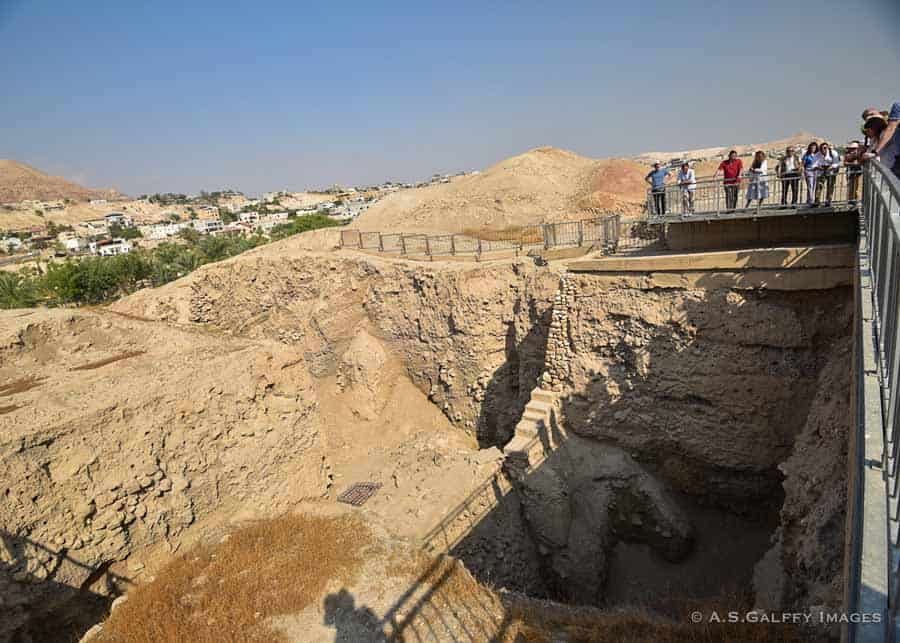
Israel’s history goes back to ancient times and much of what we know about it comes from the Hebrew Bible. According to it, Israel’s origin starts with Abraham, who is considered the father of both Judaism (through his son Isaac) and Islam (through his son, Ishmael).
Although the Land of Israel was occupied by many nations over the centuries, the Jewish people have always been a physical, cultural, and religious presence here.
Food in Israel is extremely diverse and generally very good. A well known favorite is falafel – small fried balls of mashed chickpeas, usually served with pita bread and humus.
There are many other Middle Eastern and Arabic dishes whose names I can’t even pronounce, but they are good. Kosher refers to the food that complies with the standards of the Jewish law (for instance, pork and shellfish are not kosher).

Do try all the food in Israel! The worse that can happen is that you won’t like it. For those less adventurous, there is also regular Western style food available. Alcohol is available at many hotels and restaurants, but is rather expensive.
Street food is safe to eat in Israel, but I would stat away from fresh fruit and produce that I didn’t wash and prepare myself. Exercise caution even with cooked food. If it doesn’t look or smell right, don’t assume that’s how it’s supposed to be. Just don’t eat it.
Israel is an expensive country to visit. Almost everything here costs a lot: hotels, food, entrance fees, clothes, electronics, etc. Basically you pay more for the same commodity than you would pay in other parts of the world. Besides that, they have a huge sale tax of 17% that is applied to most goods and services. A trip to Israel will cost you a lot, so be prepared for that.
One thing I noticed is that speaking English will make prices go a little higher that they actually are.

You can exchange money almost everywhere in Israel. The exchange rate for the US Dollar is currently around 3.5 – 3.7 Israeli Shekel, but of course this will vary according to the time of your travel.
Bartering I one of the most important tips for people who travel to Israel. Learning to bargain will save you not only money, but also a lot of frustration. Exactly like in Istanbul , where you don’t walk into the Grand Bazaar and pay the first price you are asked to pay, in Israel almost everything is negotiable.
Israeli people expect to get a discount on all major purchases, so the listed price is calculated accordingly. Except for cars, almost everything else is open to negotiation. That’s counterintuitive if you are coming from the USA, where you can only negotiate the car or the real estate prices.
If you are not an expert driver with nerves of steel, don’t drive in Israel. Although roads are in good condition, getting in and out of any city is a nightmare! Leave alone driving in places like Jerusalem, Tel Aviv, or Haifa! Road signs are bad and traffic if always heavy.
Using planning public transportation on the other hand works really well. Bus schedules are set up very conveniently and the train system is simple and easy to use. It’s hard to get lost.
You’ll most like have to use Taxis in some situations, so be prepared to negotiate the price before you hop on the cab.
Hitchhiking is definitely not recommended in Israel, especially in the current political situation.
Tipping in Israel is discretionary but expected, similar to most of the Western world. Unlike in the USA, where you are expected to tip between 15% – 20%, in Israel the tip is between 10 -15%. The minimum is at least 10%, the average is 12% and maximum is 15% (for exceptional service).
Waiters and bartenders get a relatively low salary, so the majority of their earnings coming from tips. Tips are usually left in cash not on card, so it is useful to carry some small change with you.

Tipping the taxi drivers, hotel personnel and other people in the travel industry is not usually expected. However, they will not mind a tip if you decide to be generous.
Unlike in Morocco , where English is rarely spoken, in Israel is widely spoken. The country’s official language is Hebrew, but you’ll also hear Arabic, English, Russian and some other languages.
Although English doesn’t have an official status, most Israelis can speak it fairly well as it’s a required second language in schools. As such, you’ll be able to communicate in English almost anywhere you go. However, learning a few Hebrew words will put you ahead of the game in Israel.
- Shalom – is used as a salutation, but it actually means peace
- Bevakasha – please
- Slicha – sorry/excuse me
- Boker Tov – good morning
- Erev Tov – good evening
- Mazel Tove – congratulations/good luck
- Toda/Toda Raba – thank you/thank you very much
- Lehitra’ot – good bye/see you later
It’s surprising to discover how small Israel really is. The total area of the State of Israel is 22,145 square kilometers (8,630 square miles), just slightly bigger than the state of New Jersey. Getting from one end of the country to the other doesn’t take long, which means it’s very easy to take day trips. You can use either Jerusalem or Tel Aviv as a base for exploring the important sights in Israel.
If you are not completely ignorant about the Jewish religion, you’ve probably heard about Shabbath before. Sabbath (or Shabbath ) is Judaism’s most distinctive practice – a 25-hour celebration that starts at sundown on Friday and ends after sundown on Saturday.
In Israel Shabbat is more than just a day off from labor. It’s a unique and special time of physical respite meant to be spent with family and loved ones or for worship, if you are a religious person.
Wherever you go when you travel in Israel, make sure you get there before 4 o’clock on Friday. On Shabbat all public services are closed (except for emergency ones). There are no train and no busses working.
Traveling in Israel during any of the Jewish holidays can be a very frustrating experience for a tourist. Especially for those of us living in America, who became so accustomed to 24 hour open stores!

In Israel religious holidays are very strictly observed. Most places close down, including restaurants, cafés and public transportation. On Yom Kippur (the Hebrew Day of Atonement) everything closes down. Even Ben Gurion International Airport! No one drives on that day, and the roads are completely empty. So be prepared to do nothing on this day if you are in Israel.
If you are not religious and you are a tourist for which every single day counts, don’t stay (or travel to) Jerusalem on weekends. From Friday night to Saturday night everything closes down in Jerusalem, so there is not much you can do here.
Instead, plan to go to a more secular place like Tel Aviv or to Haifa, where everything stays open on weekends.
You are going to be seeing a lot of armed soldiers while visiting Israel, so don’t be alarmed. The presence of barbed wire and armed soldiers is nothing new in this country that has been in political turmoil for so long.
Despite the many frictions in the region, Israel is a pretty safe country to visit and the weapons you see are there for defensive purposes.

Not all the soldiers you’ll come across are on active duty however. Some are young people doing their military service. Army service is mandatory in Israel. Both girls and boys are drafted at 18 and serve a minimum of two years.
Border control is way lengthier and more thorough in Israel than in any other countries we visited so far. You’ll need to get an Israeli passport stamp , so the best advice I can give you is to arm yourself with patience when traveling to Israel.
When entering Israel you have to answer a series of routine questions (why are you there, how long will you stay, etc. etc. If you don’t look suspicious the process will be very smooth. But if you have passport stamps from certain Muslim countries (such as Iran, Lebanon, or Pakistan), you’ll have to go through a special interrogation process that will take quite a while.
Israel no longer stamps your passport on arrival, which is good news if you plan to visit other countries in the Middle East for which an Israeli visa may be a problem. Instead, you’ll get your visa on a piece of paper which you need to keep this safe, as you’ll need it for your departure.
You may expect an even lengthier process as you are leaving Israel, so plan to be at the airport at least 3 hours before departure. At the Security Check they will ask you to open your bag of electronics and they will check each and every one of them.
Practical Travel Tips for Israel
Deciding when to go to Israel depends in large part to what you are interested in doing while you are there. While there is no wright or wrong time to go, there are however a couple of things that you need to consider when planning your trip: climate and Jewish holidays .
There are basically two seasons in Israel: summer (April to late October) and winter (November to March). Summers are hot and humid in Israel, bur rain free. Winter starts when it gets from cool to cold and it begins raining). Generally it doesn’t snow in Israel, except for the mountain areas in the Golan Heights.
Another important tip to consider when you travel to Israel are the Jewish holidays. In Israel there are two calendars: the Gregorian calendar and the Jewish calendar, but most religious holidays are based on the Jewish calendar.
Even though it’s interesting to be in Israel during some of these holidays, you’ll have to remember everything closes down during that time: public transportation, banks, stores, etc. Also, hotel prices will be much higher.
When traveling to Israel it’s important to be conscious of what you wear. While places like Tel Aviv, Jaffa, or Haifa are more open-minded and fashion-forward, in cities like Jerusalem modest clothing is recommended. Don’t bring tank tops, shorts or anything above the knees.

With very few exceptions, just about everything you would pack for Europe you can pack for Israel as well. As a general rule however, think convenience before fashion. Here are a few tips on what to pack when you travel to Israel:
- A scarf and a long-sleeve top, if you are a woman and plan on visiting the religious sites. Some sites may provide a cover up, but it’s better to have your own.
- Light-weight clothing is the best for summer months. We traveled here in mid October and the temperatures were above 30ºC and very humid.
- A light jacket and some sweaters for colder months.
- Comfortable shoes are a must in Israel, especially in Jerusalem.
- Hat, sunglasses, sunscreen lotion. You won’t be able to get by without them in this torrid sun.
- Wet wipes, small roll of toilet paper, hand sanitizer. Carry some in your pockets at all times. Many times the public toilets will not have toilet paper or soap.
- A small umbrella. Rain may come totally unexpected in Israel, but it usually stops just as sudden as it started.
Israel is overall a pretty safe country. However, considering its fast changing security situation, it’s important to exercise a some caution when traveling to certain areas, like East Jerusalem, or the West Bank cities of Bethlehem, Jericho and Ramallah.
If you want to visit the West Bank, I would advice hiring a cab from the Muslim quarter in Jerusalem, or booking an organized tour. Many cab drivers in the Muslim Quarter of Jerusalem will offer to take you to the West Bank, but I’m not sure how safe that is. If you are not in an organized group, you may have issues at the border.
One thing to be mindful in Israel is that authorities are always on high alert. So don’t leave your purse, camera, or anything else unattended. People will assume it’s a bomb and the bomb squad will come and search your purse and interrogate you.
The standard voltage in Israel is 220 volts and 50 Hz. The primary socket is type H (plugs with three pins in a triangular shape), so you’ll need a Power Adaptor Type H . In many hotels you will probably also find the C type sockets (two pins, like in Europe).

If you are coming from the U.S. you’ll need both a plug adaptor AND a voltage converter. Coming from Europe or other countries that have 220-230 voltage systems, you’ll only need a plug converter . Most modern devices such as mobile phones and laptops have a built-in converter, but it’s safer if you bring a voltage converter as well.
WiFi is widely available throughout Israel and is usually offered free of charge in most hotels, restaurants, cafes and bars. Some small hotels may charge for Internet though.
19. Are drones allowed in Israel ?
Technically, yes. However, there are very many restrictions and you’ll need a permit for using it. Also, like everywhere else in the world, you won’t be able to use your drone in places that are of interest.
If you want to bring your drone to Israel, my advice is to register with the Aero Club of Israel and get a permit. They will provide you with a map of the places where you can fly, and also give you with up to date information about their rules and regulations.
Israel is 2 hours ahead of Greenwich Meantime (GMT). Daylight Saving time starts on the Friday before the 02 April. The move back to standard time can take place in late September/early October according to the Jewish calendar (between Rosh Hashanah and Yom Kippur.)
NOTE : As of June 30, 2023, NO Covid-19 test or proof of vaccination is required for tourists entering Israel.
Did you find this information useful? Pin it for later:
YOU MAY ALSO LIKE:
- The Best Two Weeks Israel Itinerary for Independent Travelers
- The Ultimate Guide for Visiting the Ionian Islands in Greece
- 5 Amazing Day Trips From Tel Aviv for History Lovers
- 23 Historic Places to Visit in Jerusalem Old City
- How to Take a Day Trip from Jerusalem to Bethlehem
Anda is an award winning travel writer, avid globetrotter and passionate photographer. She is the voice behind "Travel Notes & Beyond," a collection of stories and travel impressions from her wanderings around the world. When she is not busy writing, traveling, or editing photographs, you can find her hiking in the foothills behind her house together with her husband and their dog.

Reader Interactions
Sreenandhana
April 2, 2024 at 2:00 am
This is the page that impressed me the most that I have visited, the beautiful description and the page is made in a way that is useful to benefit others without being stingy.
April 2, 2024 at 1:59 am
Time spent on this page is never wasted. Very nice presentation, very nice pictures. Thank you for sharing your experiences with us.
Santhosh Raghavan
November 2, 2023 at 7:54 am
Dear friend Superb guide you covered almost everything a traveler should look into. I’ve been thinking lately that I would love to visit I am glad to read your blog about your travel experience very interesting thanks. Your personal experiences and vivid descriptions truly bring the city to life, making me feel like I’m right there with you on this incredible journey. Your blog is a wonderful source of inspiration for fellow adventurers looking to explore the magic of. Keep sharing your stories and insights – they’re a delight to read!
November 4, 2023 at 2:15 pm
Thank you for your kind words.
July 16, 2023 at 7:39 pm
You should really educate yourself. Lebanon is NOT a Muslim country per se. There are probably more Muslims in Israel! Further, there are 18 officially recognized religions in Lebanon, Judaism being one of them. Please alter your article to reflect correct information. kind regards Joe.
July 17, 2023 at 8:48 am
What else would you call a country where the great majority of the population is Muslim, Joe? According to the U.S. Department of State, 67.6 percent of Lebanon’s population is Muslim (31.9 percent Sunni, 31 percent Shia, and small percentages of Alawites and Ismailis). Also, Lebanon estimates that only 32.4 percent of the country’s population is Christian. It seems to me that I’m not the one who needs to be educated here, lol!
Michael Guide
April 12, 2023 at 4:49 am
I appreciate you providing this important travel advice for going to Israel. Israel is a contentious nation that has the potential to cause unrest and arouses strong feelings, but I concur that knowing its background is essential to getting the most out of your trip there. Israel is a nation with a long political history and a rich cultural and religious heritage.
I like how you stressed the significance of researching Israel’s history before traveling there. It’s an excellent approach to understanding the significance of the numerous historical and religious places you’ll see while traveling. Keep in mind that Israel is a nation that is ever-evolving and that its history is still being written.
Anyone organizing a first-time trip to Israel will find your guide to be a valuable resource. I appreciate that you addressed often-asked issues like what to anticipate when to go, and the associated expenditures. Before travelling, it’s always beneficial to have a thorough understanding of these concepts.
Overall, I believe that your guide is an excellent place for anyone thinking about visiting Israel to start. It offers useful information that will enable tourists to more fully comprehend and value the rich history and culture of the nation. I appreciate you sharing these helpful travel suggestions!
April 12, 2023 at 9:44 am
Thank you for your thorough review of my article, Michael. I hope to revisit Israel sometime next fall.
April 11, 2023 at 3:17 am
Superb, very useful information. Keep sharing
March 24, 2023 at 10:19 am
Beautiful write and I am fascinated by your blog as much as anyone else. Thank you so much for sharing your experiences and ideas here with others. I want to come here again. Thanks kindly visit my Kerala tourism blog, please
July 24, 2022 at 12:30 pm
Ana Hernandez Well , it’s a petty you didn’t enjoy of such an exiting country. Israel semmed to me the extraordinary convergence between history and modernity. Vibrant. and modern Tel Aviv vs traditional fascinating Jerusalem, beautifull beaches beside amazing desserts. Good bargains in “zoco” vs most famous fashion brands and jewelry. Tasty. and delicious food from almost alll around the world. I’m really sorry you didn´t get all that . Hope next time you will be able to discover the real country.
July 24, 2022 at 2:57 pm
I have to confess that your comment left me wondering whether you read one post but commented on another. I can’t figure out what part of this guide made you think that I didn’t enjoy visiting Israel. I absolutely loved this country and tried to give some tips to those who didn’t see it yet. You seem quite confused about what you read.
Patrick Morgan
February 17, 2022 at 8:02 am
Do you have an Amazon link to the power adaptor and voltage regulator?
February 17, 2022 at 11:21 am
I sure do, Patrick. Here it is: Power Adaptor Type H .
Pranita Purohit
September 16, 2020 at 10:05 am
Like me, there are many who want to travel to Israel, but fear due to the political conditions and tussle with the neighboring states. However, after reading your post, the notion that all have about this country will be put to rest forever. You have presented a useful guide in the form of this post. Thank you very much.
September 16, 2020 at 11:33 am
I’m glad to hear that. Hopefully you’ll be able to visit Israel sometimes soon.
August 24, 2020 at 11:40 pm
This is the right guide for those who want to visit Israel. You certainly put a new spin on a subject that has been written about for decades. Great stuff, just excellent!
August 25, 2020 at 2:45 pm
Thanks, Melanie.
July 29, 2020 at 8:06 am
Thank you so much for your the tips.! We are going at the end of the summer, found a good flight deal! I know it will be hot, but I am from the Caribbean so that’s not a problem! can not wait to visit beautiful Israel and experience the culture. Your insights are super helpful to thank you! Have a question! What about at the airport at entering the country is no issue with the drone that I have to register? Do u know anything about it? Thanks
July 29, 2020 at 8:50 am
Hi John, The end of the summer will be hot indeed, but you’ll have a blast in Israel anyway. In regards to the drone, you won’t be able to use it much. My husband is a drone enthusiast too and did a lot of research for that before we traveled to the Middle East. He even registered with aeroclub.org.il, but still didn’t help much. Like everywhere else in the world, the places where it would be interesting to use it, you can’t. He used it secretly a couple of times (once in Acra and once in Tel Aviv) while I was keeping watch, but it’s stressful to use it like this. At any rate, my advice would be to check their website and register anyway. They will provide you with a map of the places where you can use it.
November 6, 2019 at 10:50 am
This is a comprehensive post , I wished I had before visiting Jerusalem. I found the prices to be really expensive , much to my surprise. I was also nervous when seeing so many armed guards around. It is still worth a visit and I would recommend anyone going to read this post!
November 5, 2019 at 8:46 am
Totally agree with you that these are really good to know. My parents are planning to go to Israel and I just shared this post with them.
Thank you for the heads up regarding the prices. I will ask them to adjust their budget accordingly. 🙂
Vanessa Ball
November 5, 2019 at 5:15 am
I’d love to visit Israel and had no idea that it was this small or that things were expensive to buy. The food looks super tasty, I love Arabic dishes. It’s handy to know about the religious holidays and weekends when planning your trip too. This is a really useful article to read before going to Israel.
November 5, 2019 at 3:28 am
I traveled to Israel when I was 15 years old as part of a school trip. We spent 2 months in the country and experienced many facets of it. Many people asked me if I felt safe and I personally never felt safer. Like you mentioned the entire population goes to the army they are all trained and the military is always around. This provided me with a sense of security. Love the tips to learn about history so you understand what you are looking at. And to use public transport – it is very organized and easy to use. The food as you mentioned is great although pricy and I personally loved everything I ate. Wonderful post. Israel is a beautiful country and despite the turbulent history and current political climate it is a great place to visit.
Anda Galffy
November 5, 2019 at 8:24 am
It must have been a great experience for you as a teenager to see how other people live. Thanks for your comment.
Blair villanueva
November 4, 2019 at 9:17 pm
I truly enjoyed readinv your Israel travel guide. As a Philippine passport holder, we got privilege for free travel visa access. It would be great to visit Israel for faith tourism.
E. J Requina
November 4, 2019 at 7:37 pm
Well you pretty much covered everything about Israel. Israel is part of my top places to visit and getting a deep dive of the country helps a lot. Its a bummer when you mentioned that the place is dead on weekends but hey im pretty sure there a lot of things to do the rest of the week.
Linda (LD Holland)
November 3, 2019 at 3:47 pm
We visited Israel for a few days with a cruise ship. So we were probably prepared for some things. But not others. I was certainly surprised to find that it was the religious centre for so many different religions. It was a bit disconcerting to find so many marketing messages on religious souvenirs. We ate in markets when we were out during the day. Even if I am a very bad haggler. We found armed guards in Israel, Jordon and Egypt. So I guess we sort of got used to them. This was a very helpful post. We would like to return on our own to Israel. So I will keep this post for reference.
November 4, 2019 at 12:54 pm
Thank you, Linda.
Laura Axtman
November 3, 2019 at 3:19 pm
What an amazing adventure. I hope to one day be able to travel to Isreal. Your description of the city helped me to understand the current climate and how to navigate the area with the history of war as a consistent reminder. Your photos are great and made me want to visit the region even more.
November 3, 2019 at 1:00 pm
I loved reading all your tips for traveling to Israel. It is at the very top of my bucket list right now, and I’ve heard such wonderful things about traveling there recently. As a Christian, there is so much Religious history that I want to experience. I appreciate the tips you’ve included on tipping, transportation, and electric plugs. Those are things I always research in detail before leaving on a trip!
November 4, 2019 at 12:55 pm
Hope you’ll manage to visit Israel someday, Leah.
Leave a Reply Cancel reply
Your email address will not be published. Required fields are marked *
Save my name, email, and website in this browser for the next time I comment.
COPYRIGHT NOTICE
All rights reserved © Travel Notes & Beyond. The material on this website is protected by copyright law. Republishing the content on this blog (including text, photography, etc.) is strictly prohibited.

AFFILIATE PROGRAM DISCLOSURE
Some of the pages and posts of this blog contain links to products and services that may be useful for my readers. When clicking on these links you will have the option to purchase or register for a service at no extra cost to you, but doing so can help me offset the costs associated with running this blog. Thank you for your support!
- Skip to primary navigation
- Skip to main content
IsraelTravelBlog.com
Information, insights, advice, reviews, and recommendations about travel to and around Israel
ISRAEL TRAVEL BLOG
Our most recent articles….

The Ultimate Israel Bucket List
Here is the ultimate Israel bucket list for all the essential things you want to see and do.
Continue Reading The Ultimate Israel Bucket List
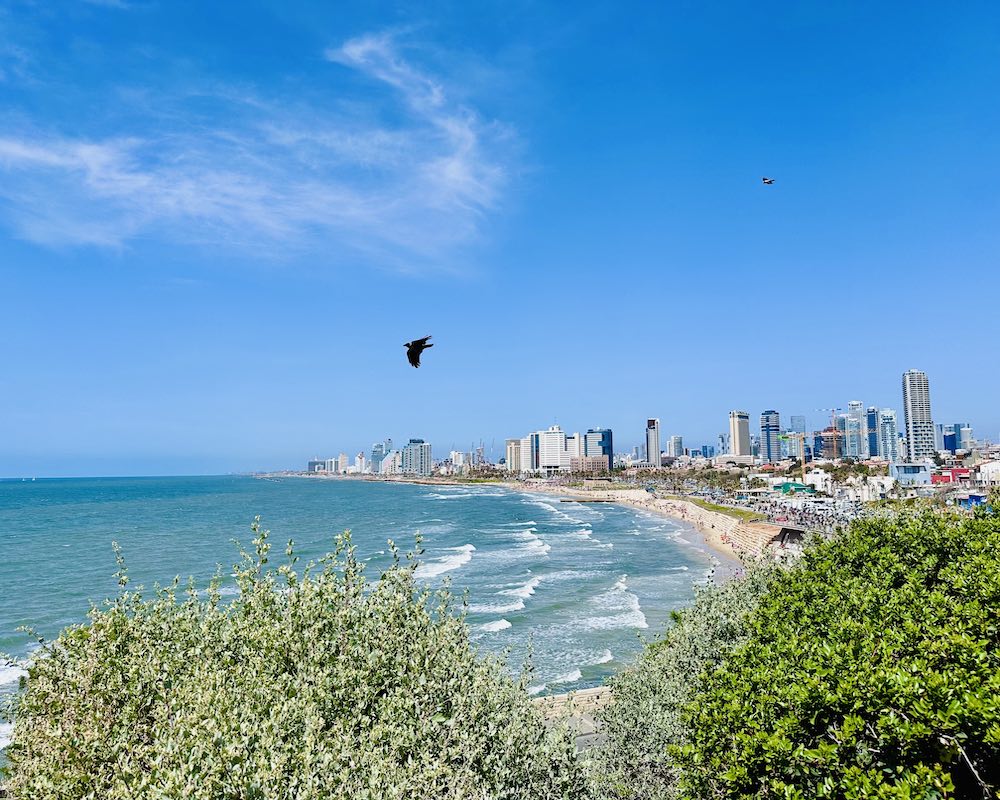
How to Choose a Hotel in Israel
Here are some pro tips for how to choose the best hotels for your bucket list trip to Israel.
Continue Reading How to Choose a Hotel in Israel

Everything You Want to See in Bethlehem
When most people think about the places they want to go in Israel, Bethlehem tops the list. It’s the place where Jesus was born, but that is only scratching the surface of this small town’s importance and appeal. There are some very underrated gems in Bethlehem, including these. Church of the Nativity and Church of…
Continue Reading Everything You Want to See in Bethlehem
Your Quick Guide to Travel within Israel
Travelers to Israel will most likely be flying into Tel Aviv Ben-Gurion International Airport (TLV), but then what? There are so many sites on everyone’s Israel bucket list, and you don’t want to miss anything just because you’re not sure how to get from point A to point B. Here is your quick and concise…
Continue Reading Your Quick Guide to Travel within Israel
How Long Should I Visit Israel?
How much time should you spend on a trip to Israel? It’s a totally valid question. Like so many things in life, however, the answer is… It depends. Here are some thoughts and things to consider to help you decide how long you should plan to travel around Israel. If You Want to Hit the…
Continue Reading How Long Should I Visit Israel?
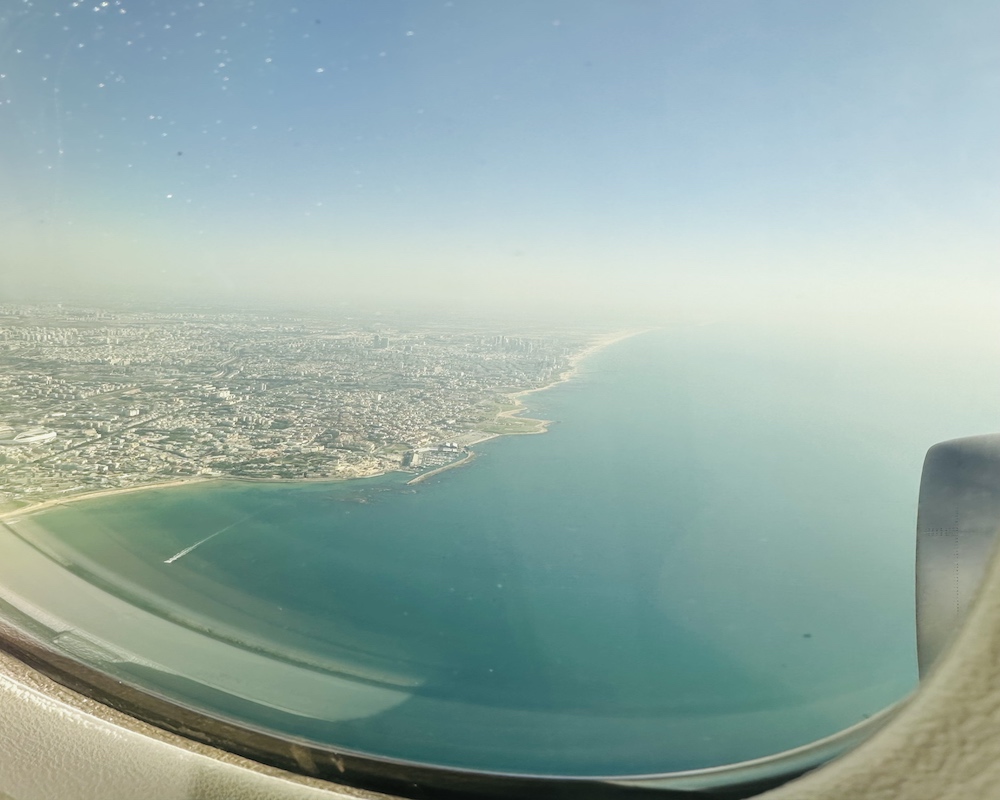
Everything You Need to Know about Flying to Israel
A trip to Israel is on nearly everyone’s bucket list. Once you’ve decided to go, the next step is getting there. Flights to the Middle East can be challenging with timing and the fact that it’s long-haul from North America, but the trip is 100% worth the effort. With a little preparation and research on…
Continue Reading Everything You Need to Know about Flying to Israel
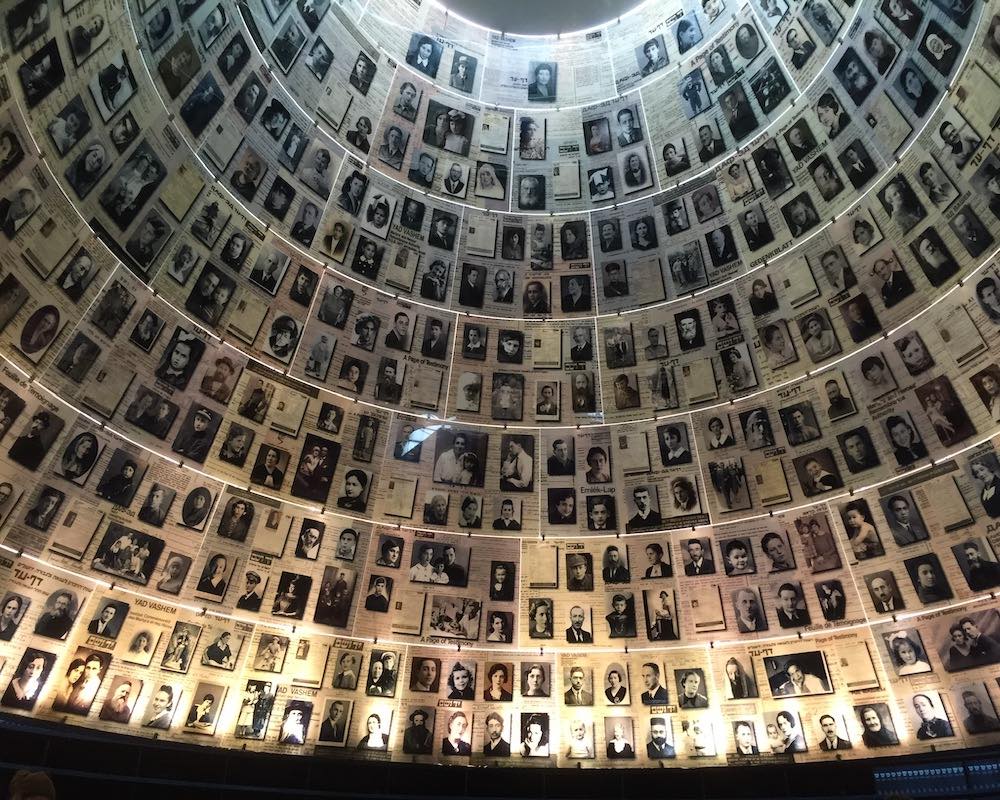
Your Guide to Yad Vashem: Israel’s Holocaust Museum
One of the essential museums all visitors to Israel need to visit is Yad Vashem, the World Holocaust Remembrance Center. It’s different from other Holocaust museums, and well worth your time. Here are the details you need to know to plan your visit. *Please note that children under 10 are not permitted to visit the…
Continue Reading Your Guide to Yad Vashem: Israel’s Holocaust Museum
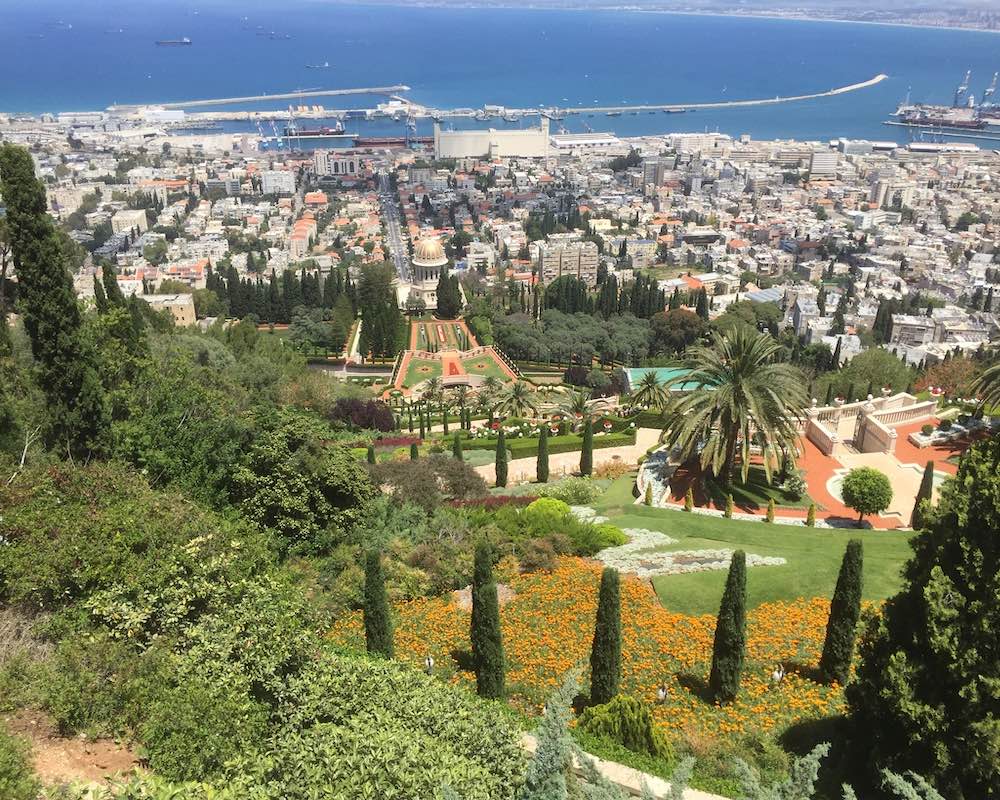
The Best Day Trips from Tel Aviv
Tel Aviv is a logical place to base yourself in Israel, at least for a long weekend or a few days. Tel Aviv offers endless restaurant options, beaches, and nightlife here unlike anywhere else in the country. It’s not ideal for every place you want to see in Israel, but it’s a great place to…
Continue Reading The Best Day Trips from Tel Aviv
5 Things to Know Before You Visit Qumran and the Dead Sea Scroll Caves
Qumran National Park is on many Israel itineraries, but you may not really know what that is based on the name alone. You are more likely familiar with what it’s known for: The Dead Sea Scrolls. The first of over 1,000 well-preserved scrolls were discovered here in the 1940s. The scrolls were hand-written copies of…
Continue Reading 5 Things to Know Before You Visit Qumran and the Dead Sea Scroll Caves

Get on the List.
Sign up to receive our quarterly newsletter with news, reviews, updates, and more related to travel to and around Israel.
Featured Articles…
Where is the Holy Land?
By whitney o’halek.
When someone says, “I visited the Holy Land,” what does that mean to you? Is it the same as what it means to them? People talk about “going to the Holy Land” as if everyone knows exactly what that encompasses, but in reality, people often have different ideas of what makes up the “Holy Land.” Most Christians referencing the “Holy Land” are exclusively talking about what is today Israel and Palestine…
Finding Jerusalem’s Luxury Hotels
By john navarre.
Israel is an incredibly unique country in so many ways. Not only do three of the world’s major religions converge there, with their respective holy sites physically coexisting in ways that have thus far evaded its human inhabitants, but there are also many more remnants of grandiose civilizations that pre-date even most religions. Needless to say, Israel generally – and Jerusalem specifically – is a top bucket list destination for literally billions of people…
Browse by Category…
Looking for information, insights, advice, reviews, or recommendations on certain types of sites or everything within a specific city or region? We’ve got you covered. Just explore our library of articles by category below.
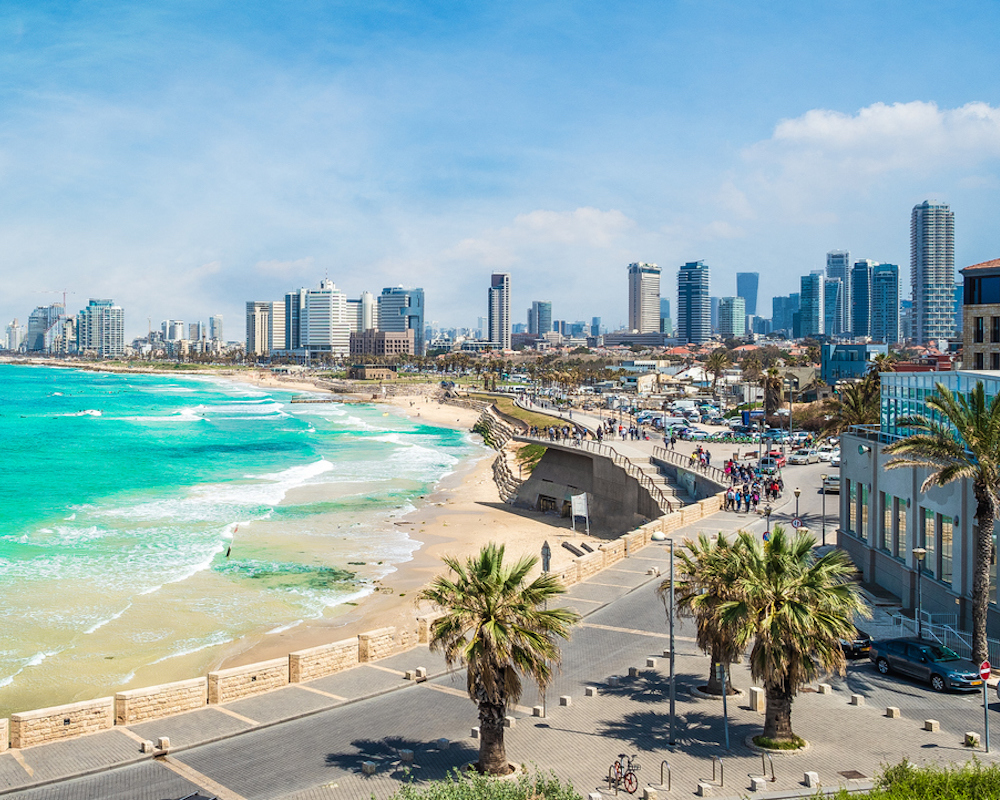
Cities and Regions
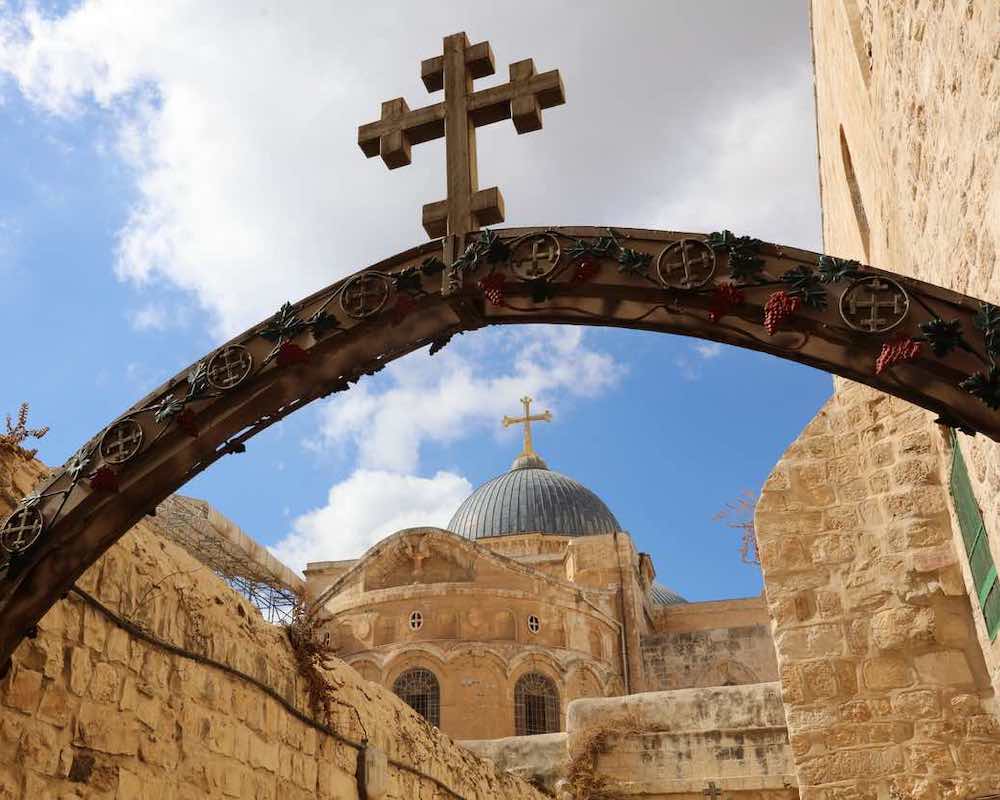
Religious Sites
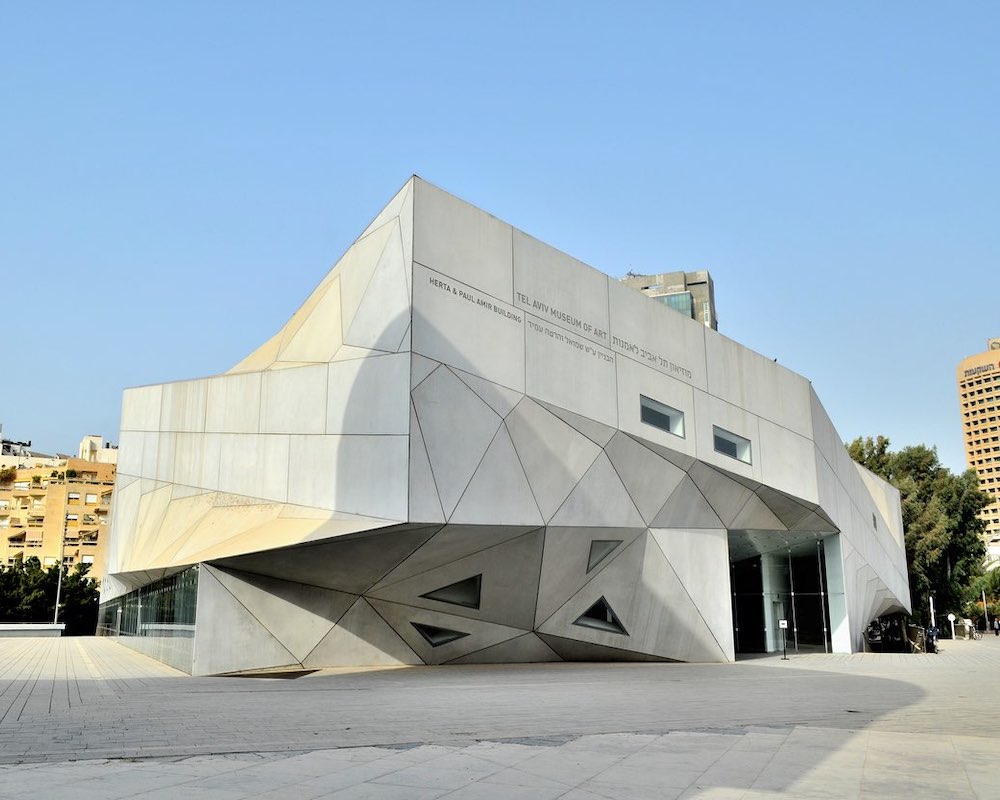

Hotels in Israel

Food and Dining
General Travel Advice

Now available…
The israel travel podcast.
The Israel Travel Podcast shares with you everything you need to know – and plenty you didn’t even know you needed to know – about travel to and around Israel as a tourist. Check out The Israel Travel Podcast on Apple Podcasts and Spotify .
Cookies on GOV.UK
We use some essential cookies to make this website work.
We’d like to set additional cookies to understand how you use GOV.UK, remember your settings and improve government services.
We also use cookies set by other sites to help us deliver content from their services.
You have accepted additional cookies. You can change your cookie settings at any time.
You have rejected additional cookies. You can change your cookie settings at any time.
beta This is a test version of the layout of this page. Take the survey to help us improve it
- Help and services around the world
- UK help and services in Israel
Travelling to Israel
Includes travel advice and how to get married abroad.
Subscriptions
- Get emails for this topic Travelling to Israel
Getting married or registering a civil partnership abroad
Requirements, paperwork and processes for weddings and civil partnerships overseas - registration, restrictions, fees
Israel travel advice
FCDO travel advice for Israel and the Occupied Palestinian Territories. Includes safety and security, insurance, entry requirements and legal differences.
Israel: mental health support abroad
Information for British nationals with mental health issues in Israel, including how the British embassy can help.
Reduce your risk from terrorism while abroad
How to minimise your risk, and what to do if there's a terrorist attack.
Is this page useful?
- Yes this page is useful
- No this page is not useful
Help us improve GOV.UK
Don’t include personal or financial information like your National Insurance number or credit card details.
To help us improve GOV.UK, we’d like to know more about your visit today. We’ll send you a link to a feedback form. It will take only 2 minutes to fill in. Don’t worry we won’t send you spam or share your email address with anyone.

15 Things to Know Before Visiting Israel
By: Author Jessica Lam
Posted on Published: January 14, 2020 - Last updated: September 19, 2023
Categories Middle East
Israel is an incredible country with so much culture and history, and today I’ll be sharing my travel tips for visiting Israel, answering a lot of questions I had myself before my trip!
I don’t think Israel is on a lot of people’s radars for traveling to, but after posting my recap stories on Instagram, a lot of people responded saying they were interested in visiting.
It’s safe for tourists as long as you stay aware and don’t venture out into areas with more political tension.
Adam and I enjoyed our trip to Israel so much, that we’re already planning our next trip back.
Here are some helpful travel tips for visiting Israel !
- A First Timer’s Guide to Israel
- Where to Eat and Drink in Tel Aviv, Israel
- 10 Tips on Choosing the Perfect Airbnb
Israel travel tips
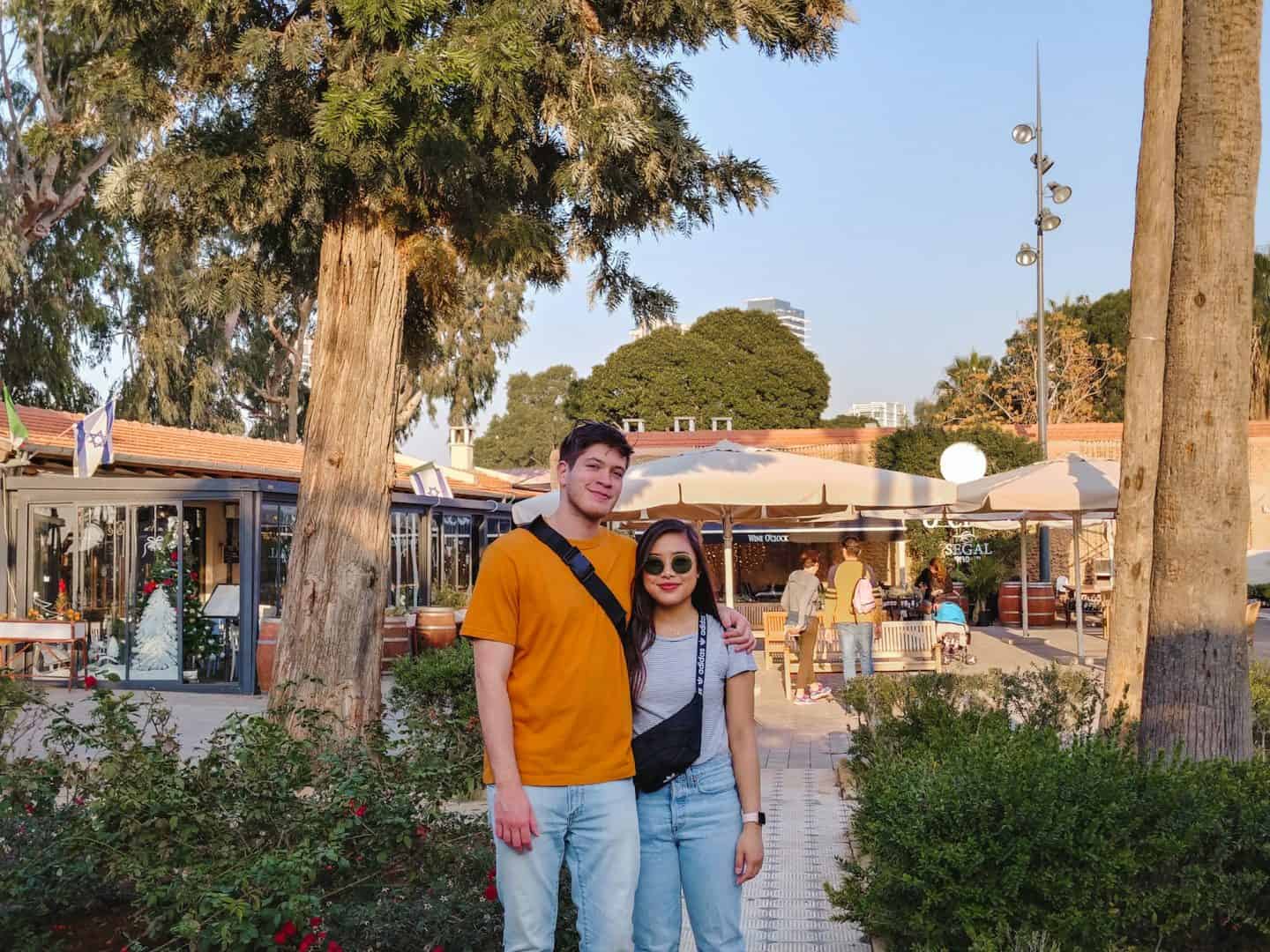
1. Pack for warm weather
Israel is warm year-round, even during the winter time. At least if you’re used to Canadian weather!
During the peak of summer Tel Aviv can get to around 40 degrees, and during the winter it averages around 20 degrees during the day.
It does snow during the winter in the northern part of Israel.
Apparently summer weather can be pretty unpleasant, so winter is definitely the better time to visit!
We visited in December, and it was chilly in the mornings and warmer in the afternoons. I typically wore a leather jacket layered over a sweater earlier in the day and just a sweater or t-shirt as the day warmed up.
We had an unusual week during our visit where it got extremely windy with pouring rain, but that’s not typical Tel Aviv weather.
2. You’ll be questioned by airport security when entering and leaving Israel
It’s standard procedure for the Israeli airport security to question you when you’re entering and exiting the country.
They asked us standard questions about our visit (why we were visiting) as well as personal questions about our relationship (like how long Adam and I have been together).
Just be honest in answering questions and make sure to arrive a bit earlier at the airport!
3. Border patrol doesn’t stamp your passport
Israel used to stamp passports, which prevented visitors from visiting certain countries.
They now just give you an entry visa on a loose paper instead of a stamp, featuring a photo of you taken at the airport.
Don’t throw the visa away, because you might need to show it later! They’ll also give you an exit permit upon leaving Israel.
If you’re from Canada, the U.S., or the U.K., you don’t need to apply for an actual visa to go to Israel.
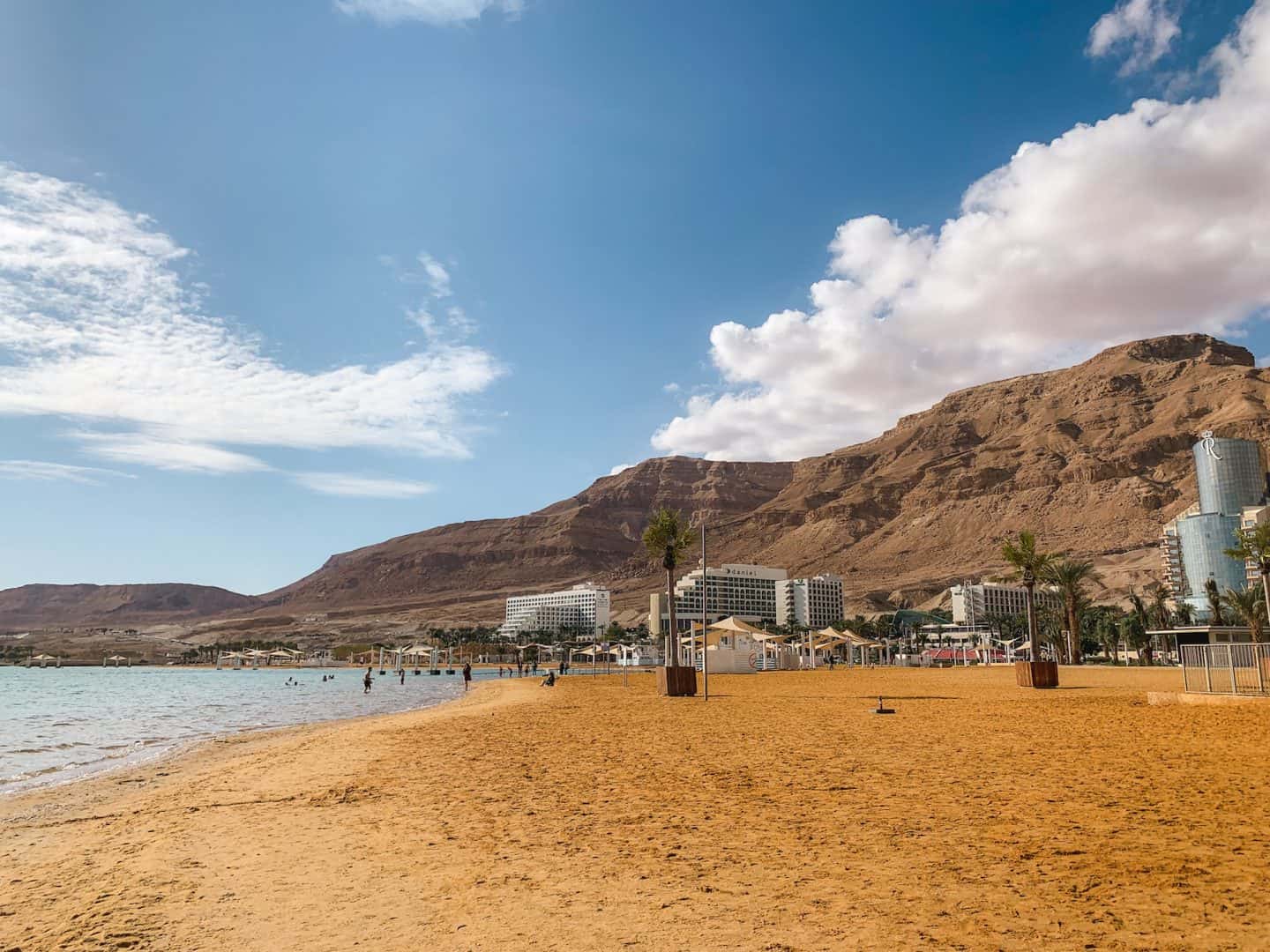
4. Israel is a small country
The furthest you’ll drive is a few hours, and that’s only if you plan on leaving the city.
Jerusalem is an hour drive from Tel Aviv and the Dead Sea is a 2-hour drive from Tel Aviv.
Tel Aviv itself is very walkable, and because it’s such a gorgeous city, walking is actually enjoyable. Riding electric bikes and scooters is another popular way to get around the city.
If you’re planning on staying in Tel Aviv, you don’t need a car. There’s tons of traffic, parking is expensive, and people are terrible drivers here.
There’s even a train that takes you directly from Tel Aviv to Jerusalem in under an hour if you’re looking to visit there as well.
5. You can use Uber in Israel
Uber is available in Israel, but it’s not the typical ride sharing you’re used to.
Everything about the app is pretty much the same as anywhere else except for the fact that they use taxis.
Prices are pretty fair compared to Toronto, but since they are taxis, they use meters and charge additional fees.
We used Uber for a 20 minute ride that took longer because of rush hour traffic, and it only ended up being $31 including any fees.
6. Carry some cash on hand
The Israeli currency is Israeli New Shekels, otherwise simplified as Shekels. 10 Shekels is just under $4 Canadian.
While you can use your credit card in bigger cities like Tel Aviv, a lot of street markets and smaller businesses will only take cash.
It’s also normal to tip at restaurants in Israel, anywhere from 10-15% depending on how good the service was.
Some card machines don’t allow you to tip, so you’ll need cash for tipping as well.

7. Dress conservatively in religious parts of Israel
One of the most important tips about Israel is that many people are religious, and it’s respectful for both men and women to dress conservatively.
This means covering both your arms and your legs.
If you’re not dressed conservatively in more religious areas like Jerusalem, you might not be allowed into sacred sites.
Adam’s brother wore shorts and wasn’t allowed inside Jesus’ burial tomb at the Church of the Holy Sepulchre.
8. Tel Aviv is more relaxed than other cities in Israel
Tel Aviv is a lot more liberal and relaxed than other cities in Israel. People wear shorts and there’s a vibrant nightlife scene.
A lot of places, including malls and fancy restaurants, are open 24/7. It’s literally a city that does not sleep!
Many people compare Tel Aviv to Miami, but as someone who hasn’t been to Miami, I’d compare it to Montreal if Montreal was by the ocean.
I also noticed that Tel Aviv was pretty diverse, with both the people living there and the restaurants that were there.

9. Israel is LGBTQ-friendly
Tel Aviv is known as one of the most LGBTQ-friendly cities in the world, and they have a Pride Parade every June.
There’s even a gay beach in Tel Aviv called Hilton Beach.
10. Hebrew and Arabic are the most spoken languages
Hebrew and Arabic are the main languages spoken in Israel, but many people speak English.
At some restaurants, servers spoke Hebrew to us at first, before realizing we didn’t speak it.
Menus at restaurants usually come in both Hebrew and English, particularly in Tel Aviv.
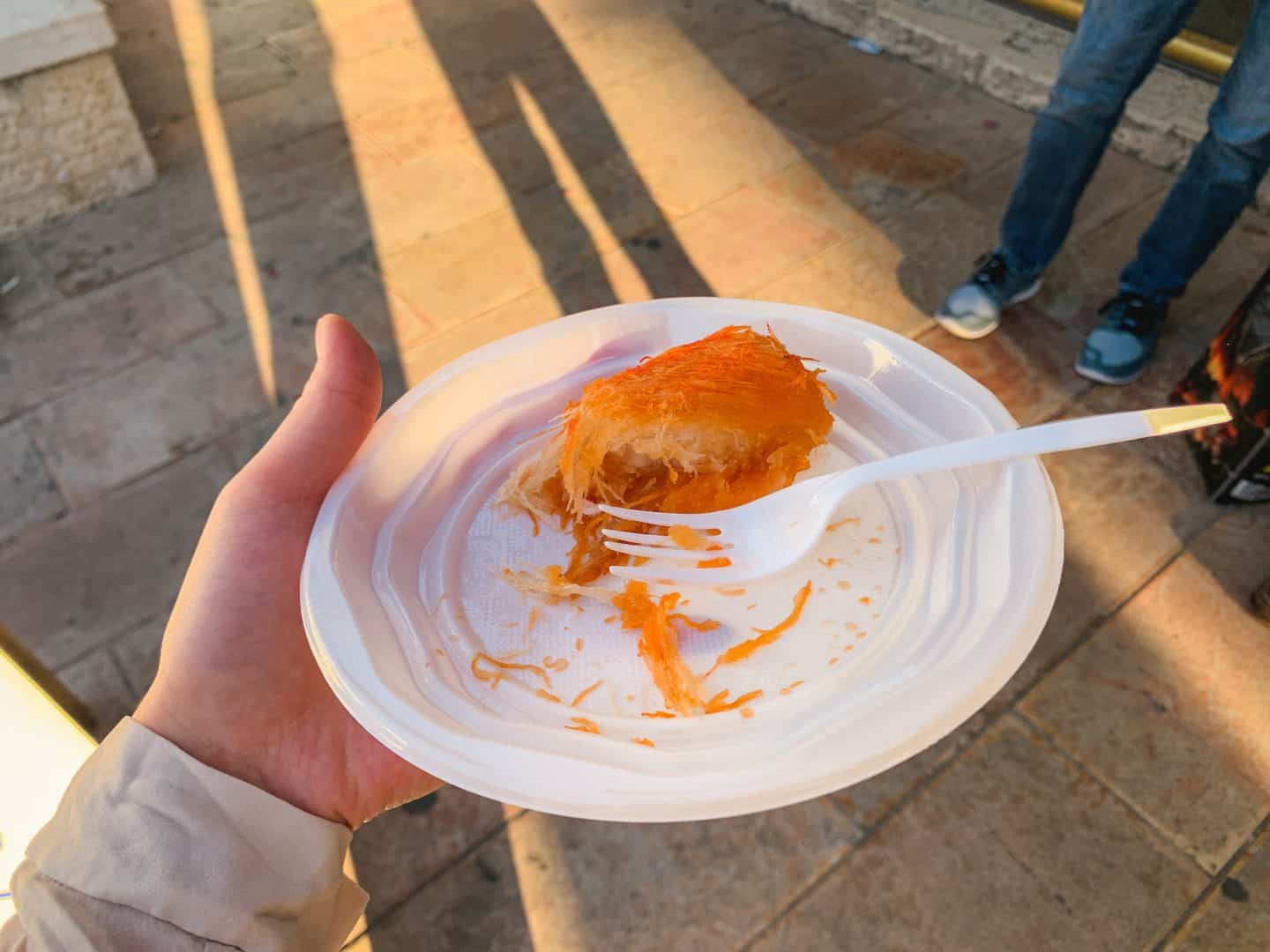
11. Middle Eastern food is incredible in Israel
You should try shawarma, falafel, hummus, and anything with za’atar while you’re visiting Israel.
Kanafeh, baklava, and malabi are all desserts you also need to try.
Breads with dips are very common as an appetizer (usually complimentary at restaurants). The dips usually include yogurt and jam (if it’s brunch).
The food is just so darn good, and I have a separate blog post all about some of the best places to eat in Israel .
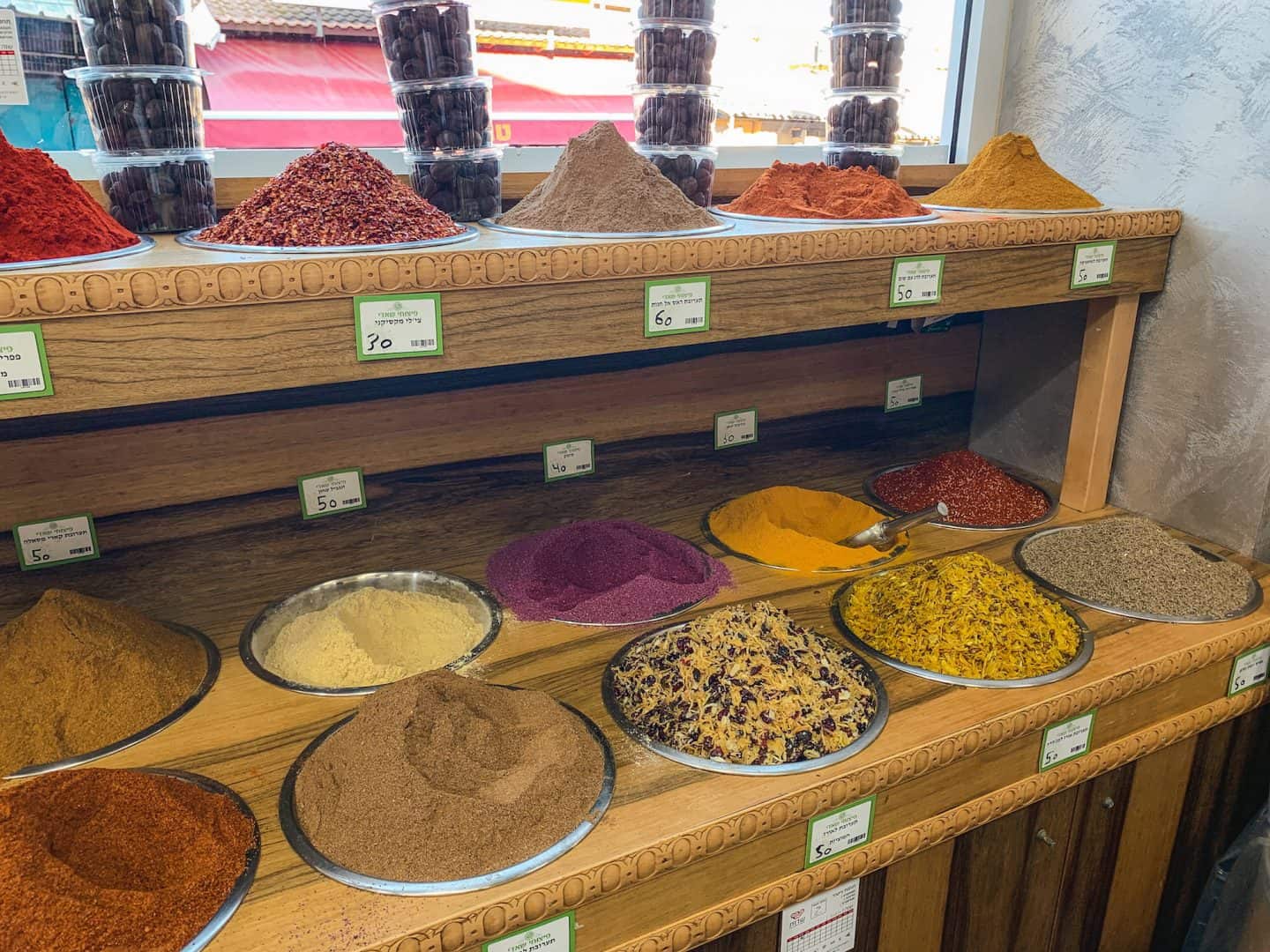
12. Take home spices as souvenirs
You’ll find fresh spices at every single street market in Israel, and you should take some back home with you as souvenirs for yourself or your loved ones.
If there’s any one spice you should bring back, definitely bring fresh za’atar back with you.
If you download the Google Lens app , you can hover your phone camera over the Hebrew signs and it’ll translate it into any language you want!
13. Shabbat is the Jewish day of rest
Shabbat happens every Friday evening through Saturday evening, and it’s a day of rest for Jewish people.
Religious Jews stay home, don’t drive, and don’t use electronics during Shabbat.
A lot of restaurants, stores, tourist attractions, and even public transportation may be closed, so be sure to plan ahead if you’ll be in Israel on a weekend.
While some places may be closed, you’ll find more things open in Tel Aviv and Jaffa!
14. Israel is serious about their security measures
Public places like malls, train stations, and museums have security that you have to go through in order to enter. It’s not as intimidating as it sounds!
You’ll also regularly see soldiers walking around, and it’s nothing to worry about.
Military service is mandatory in Israel once you’re 18 years old, so it’s normal to see young soldiers walking around with guns.
If anything, all the security measures make it feel a lot safer!
15. Israel is a safe country to visit, but there are risks
What I worried about most before visiting was whether Israel was safe for tourists to visit.
The Canadian government website warns that Israel is a high-risk country for visitors, because the security situation can change at any moment.
Always exercise caution anywhere you go and keep an eye out on any international news.
Avoid being in areas with large crowds and don’t walk around alone at night.
You can also keep updated on any travel advisories on the Canadian government website .
Israel flights & accommodations
Looking to book your flights and accommodations for Israel?
I love booking all of my flights and hotels on Expedia and collecting points towards free rewards.
I use Airbnb when I’m traveling on a budget, and I have a separate blog post all about how to find the best Airbnbs .
Hopefully you find these Israel travel tips helpful!
Some of it was stuff I noticed while I was there, and some of it is stuff I learned from Adam’s family.
Have you visited Tel Aviv before? What are some of your travel tips for visiting Israel? Let me know on Twitter or Instagram !
If you’re planning a trip or looking for more travel tips on visiting Israel , here are some other posts to help you plan your perfect trip:
- The ultimate guide on things to do in Israel
- The best restaurants in Tel Aviv
Be sure to keep up with me on Instagram , TikTok , Twitter , Facebook , and Pinterest if you aren’t already!
Feel free to subscribe to my weekly newsletter to get my blog posts delivered straight to your inbox.

Like this post? Pin it for later!

Sharing is Caring
Help spread the word. You're awesome for doing it!

Israel Travel Guide
Looking for an in-depth Israel travel guide ?
Then you’re in the right place!
For centuries, members of the three Abrahamic religions (Judaism, Christianity and Islam) have been traveling to Israel to visit some of the holiest sites in their faiths.
Today, Israel has something to offer every kind of traveler, religious or not.
This country is home to thousands of years of history, diverse cultures, and some of the most beautiful sights in the world.
Whether you want to relax on a Mediterranean beach or explore holy ground, you’ll find something exciting to do in Israel.
Israel’s major cities have their own vibe and unique attractions.
Those looking to explore the history and religious significance of the area should head to Jerusalem, home to some of the most important sites in Judaism, Christianity, and Islam.
Jerusalem’s Old City tells the story of the city’s history, dating back to 1004 B.C and continuing through countless empires and eras.
In Tel Aviv , you can get a taste of Israel’s history in the ancient port city of Jaffa and then head to the trendy neighborhood of Neve Tzedek to experience Israel’s modern present.
There is also Haifa, a city home to the Baha’i World Centre on Mount Carmel with incredible gardens that anyone can enjoy. The city is also home to some of the nation’s best beaches.
For those looking to get out in nature, Israel has lots of great options.
For a classic Israeli experience, head to the Negev Desert to visit the Dead Sea and the ancient fortress of Masada.
Here, the truly brave can repel down into the Ramon Crater , one of the largest in the country, for a truly unique desert experience. You also can’t miss the chance to float in the Dead Sea, the lowest place on the planet, or camp under the stars for an out-of-this-world view.
For more lush views, head to En Gedi Nature Reserve in the Judean Desert. Here, you can hike around breathtaking waterfalls and see some of the country’s native flora.
Keep reading to dive into resources that will help you with planning a trip to Israel in the Middle East.
Note: This ultimate guide to Israel travel contains affiliate links to trusted partners!

Use this Israel travel map to begin planning your trip to this incredible country!
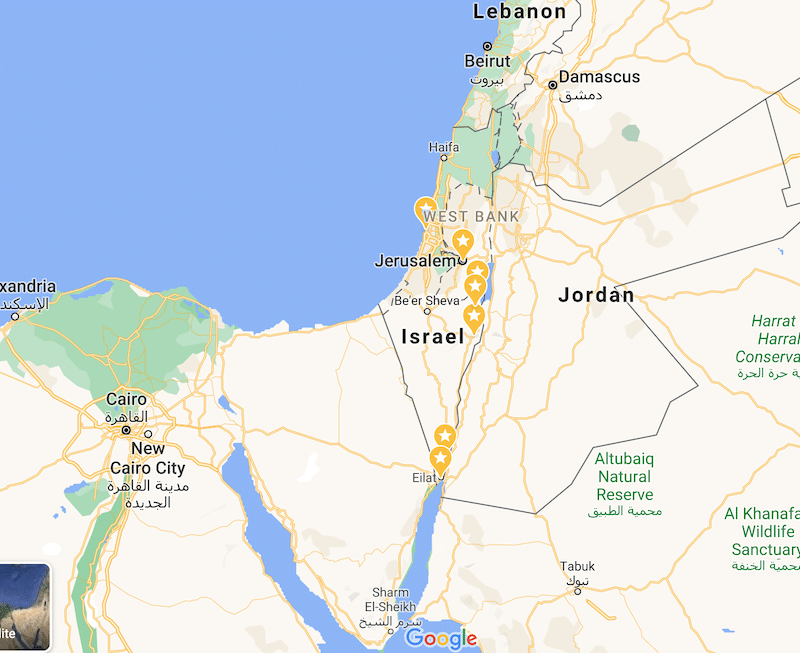
Click here for an interactive Google Map version of the above graphic.
Best Places To Visit In Israel
The following guides share Israel highlights and experiences that you won’t want to miss!
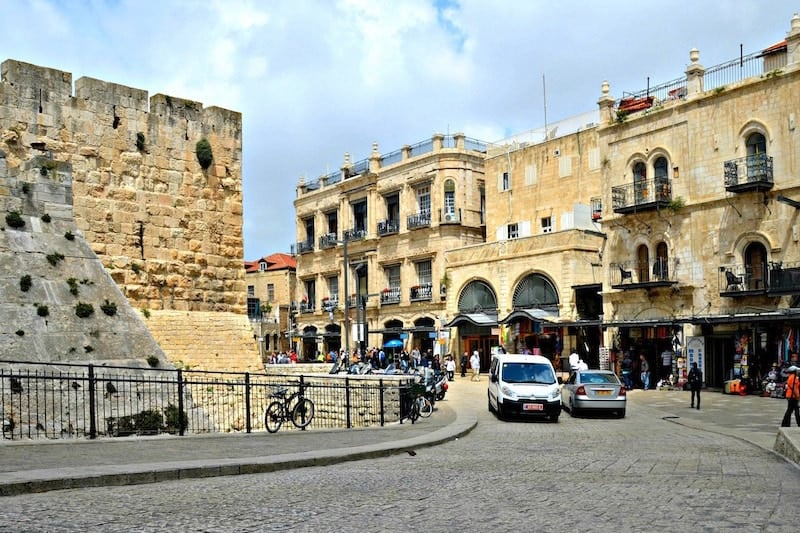
Active Middle East: Amazing Desert Adventures In Israel
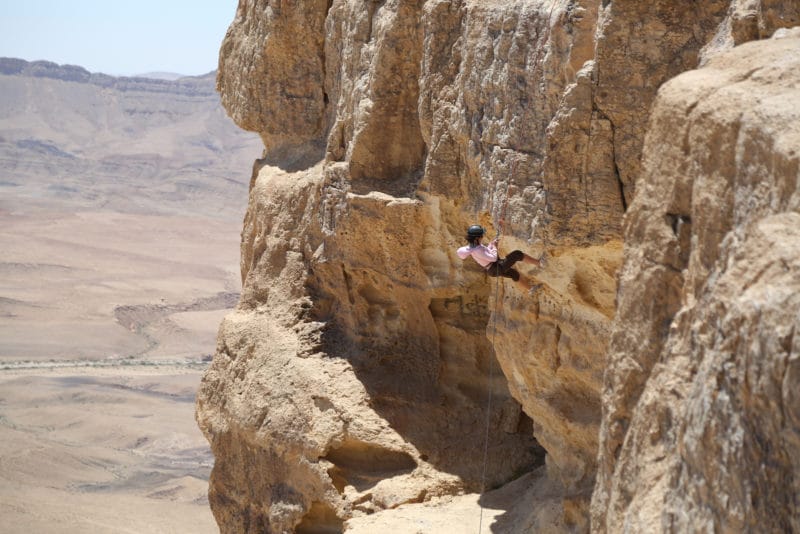
Ramon Crater Adventure: That Time I Hurled Myself Into Israel’s Largest Crater

Israel’s Best-Kept Secret: Eliat’s Treehouse Spa
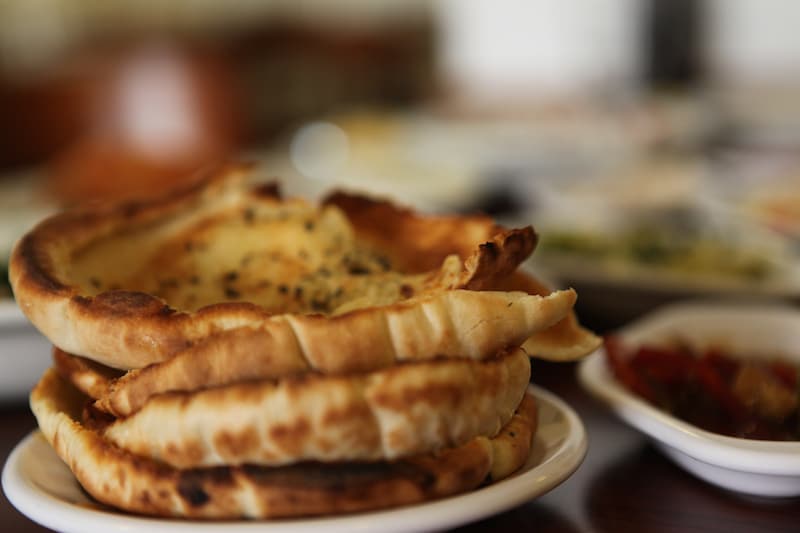
Awesomely Offbeat Things To Do In Tel Aviv, Israel
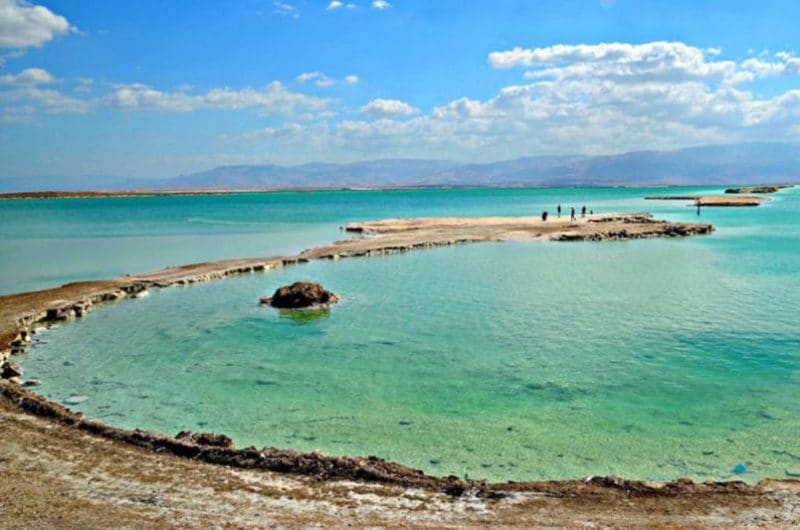
Israel’s Dead Sea Like You’ve Never Seen It Before
Travel Tips For Israel
Plan the perfect trip with these Israel travel tips !

10 Reasons Why Israel Should Be Your Next Trip
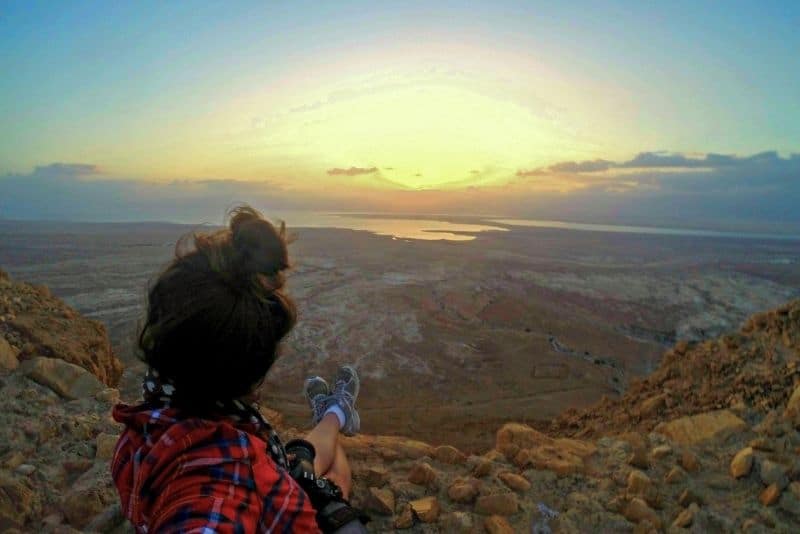
Solo Female Travel In Israel: The Ultimate Guide
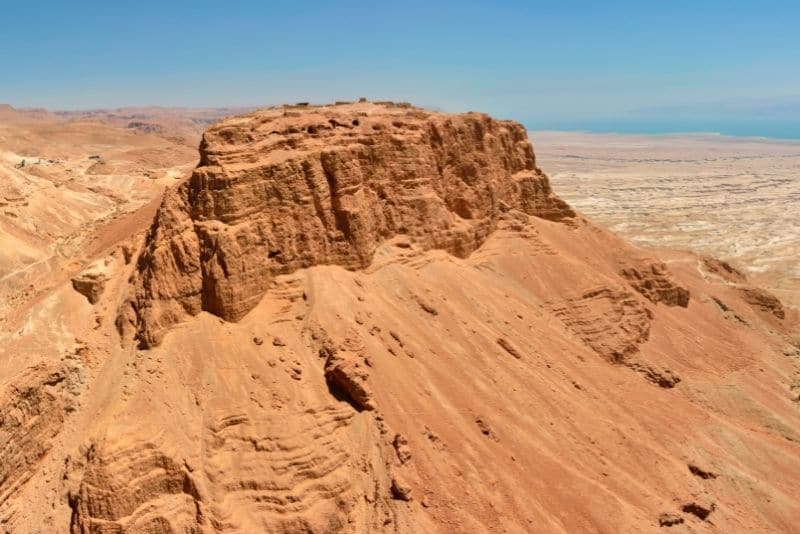
10 Best Hikes In Israel You Shouldn’t Miss (Epic!)
Best Israel Tours
Explore local culture with an Israel tour guide through these unique excursions:
- Hot Air Balloon Flight Including Champagne Gourmet Breakfast and Souvenirs from the Northern District
- Mount Sinai and Saint Catherines Monastery Day Trip from Eilat
- Local Israeli Cooking Class in Tel Aviv
- Tel Aviv Highlights Bike Tour from Ramat Gan
- Timna Park Jeep Tour from Eliat
- Dead Sea, Sunrise at Masada & Ein Gedi Nature Reserve Tour from Tel Aviv
- Golan Heights Day Trip from Tel Aviv
- Desert Jeep Tour: Mar Saba Monastery and Wadi Qelt from Jerusalem
Renting A Car In Israel
Need a rental car for your Israel trip?
Use Discover Cars to quickly compare your car rental options.
Israel Hotels
Click here to browse the best Israel travel hotels!
Prefer self-contained stays?
Click here to check out unique local rentals!
You can also use this map to search for local stays and experiences:
Israel Travel Insurance
It doesn’t matter if you’re traveling solo or with a group on an Israel tour. When visiting Israel — or any other country in the world — make sure to get travel insurance to protect your health and safety.
In my opinion, the best travel medical insurance for travelers is SafetyWing as they’ve got a large network and offer both short-term and long-term coverage — including coverage if you’re traveling for months as well as limited coverage in your home country).
Additionally, SafetyWing is budget-friendly and offers $250,000 worth of coverage with just one low overall deductible of $250.
With coverage, you’ll have peace of mind as you embark on your Israel travel itinerary.
Click my referral link here to price out travel insurance for your trip in just a few clicks .
Israel Travel Guide FAQ
Below, find answers to frequently asked questions about traveling in Israel .
Q: What are the best cities in Israel to visit?
If you have to pick three cities to visit in Israel, make them Tel Aviv, Jerusalem, and Bethlehem.
These three cities will give you a feel for the country’s storied past and cosmopolitan present while offering something for every kind of traveler.
Tel Aviv is a lively beachside metropolis with one of the most exciting cultural scenes in the world. Walk around the trendy neighborhood of Neve Tzedek and check out both small art galleries and major institutions like the Rokach House Museum.
Additionally, learn more about the Jewish Diaspora at Beit Hatfutsot at Tel Aviv University. Wander around the White City, a UNESCO Heritage Site full of cream-colored Bauhaus-style buildings. Or just lounge on the beach and enjoy the Mediterranean sunshine!
Jerusalem is a must-visit for travelers of all faiths. Here, you can visit a truly ancient city and some of the holiest sites in the world.
You’ll find most of Jerusalem’s top attractions in the Old City, a neighborhood that dates back to 1004 B.C. and blends aspects of Jewish, Muslim, Christian, and Armenian cultures.
The Old City contains the Western Wall, the holiest site in the Jewish faith; Temple Mount and the Dome of the Rock, the location of the two Jewish Temples and a significant site in Islam; and the Church of the Holy Sepulchre, a basilica built on what is believed to be the site of Jesus’s tomb.
Beyond the Old City, you can check out the famous Dead Sea Scrolls at the Israel Museum or browse the culinary offerings available at the Mahane Yehuda Market.
Jerusalem is also home to a thriving nightlife scene with chic cocktail bars and galleries to explore.
Moreover, the city of Bethlehem is home to many important religious sites, particularly for Christians as it is believed to be the birthplace of Jesus Christ.
Here, you can visit the Church of the Nativity, built on what is believed to be the site of Jesus’s birth, and the Milk Grotto, where the Holy Family is said to have hidden during the Massacre of the Innocents.
Bethlehem is also a great place to experience and learn more about Palestinian culture.
The Old Bethlehem Museum features a recreation of a 19th-century Palestinian home as well as several other historic artifacts. You can also stop by the Palestinian Heritage Center where you can find handmade clothing, jewelry, and other products from local Palestinian artisans.
Q: What should I know before traveling to Israel?
One of the most important things to keep in mind when planning a trip to Israel is Shabbat, or the Jewish Sabbath.
The weekend consists of Friday and Saturday in Israel as Saturday is the holiest day of the week.
Most businesses and public transit systems shut down from sundown on Friday nights to sundown on Saturday nights to observe Shabbat.
You’ll likely find a few places open here and there (particularly in more secular cities) but this probably won’t be a day for major activities and dining plans.
If you’re in a predominantly Jewish city like Jerusalem, be prepared to take the stairs as many businesses shut down their elevators on Shabbat. If you’re touring the country and want to avoid the effects of Shabbat, this might be a good time to visit a predominantly Christian city like Nazareth or a Muslim city like Acre.
While Hebrew is Israel’s official language, you’ll find that English is widely spoken. About 85% of the country’s population speak at least some English, so you shouldn’t have too much of a problem communicating with locals.
The Israeli people are also known to be quite warm and sociable and greet people with hugs and kisses on the cheek.
They are also very direct communicators and not afraid to share their opinions. If you end up in a lively debate over dinner at your new Israeli friend’s house, don’t be surprised!
It’s also very important to be respectful of the different cultures and religions of Israel. You’ll want to be aware of the dress codes and modesty guidelines for different religious sites before you visit.
Women are asked to cover their knees and shoulders at most places of worship and may be asked to cover their hair at Islamic holy sites. Keep a scarf or shawl handy just in case.
Men are generally required to keep their knees and shoulders covered, as well. These are also good guidelines to keep in mind when visiting more religious neighborhoods and cities.
Q: Is it safe to travel to Israel?
The threat of terrorism is an unfortunate reality that many live with in Israel, the West Bank, and Gaza. It’s important to be aware of these threats and keep an eye on the news while traveling in this region.
That said, Israel is known to be quite safe for travelers due to its low crime rate and emphasis on security. You’ll see this as soon as you cross the border. For instance, you’ll probably face more questions from security officers than “business or pleasure?”.
Security officers are also present throughout Israeli cities, particularly at major religious sites.
And as with any major travel destination, you’ll want to stay vigilant and aware of your surroundings at all times to avoid pickpocketing and petty theft.
If you plan on visiting cities like Bethlehem, Ramallah and Jericho, you’ll need to cross into the West Bank, an area controlled by Palestinian authorities. Security is particularly strict on the Israeli-West Bank border, so it’s important to take the border crossing process seriously and answer any questions from security officers honestly.
It’s best to stick to the major cities and tourist areas when visiting the West Bank, and you may even want to travel with a tour group for added safety and ease.
Due to the increased rates of violence, most governments and travel experts warn travelers against visiting the Gaza Strip.
Q: How much money do I need per day in Israel?
The average traveler spends around $107 USD per day in Israel on accommodations, food, transportation, attractions, and other expenses.
How much you spend per day varies from city to city; Tel Aviv is considered one of the most expensive cities in the world and accommodation prices are rising across the country.
Q: How many days do you need for Israel?
Most experts recommend planning for about 10 days in Israel. This will give you a few days to spend in the major cities as well as time to visit the Dead Sea and other attractions off the beaten path.
Q: What is the best month to visit Israel?
If you’re looking for mild weather, it’s a toss up between the spring months (April and May) and autumn months (September and October), though note Passover in the spring can drive up prices and crowds.
Q: How long can a tourist stay in Israel?
Tourists from many countries — like the United States and Canada — can visit Israel for up to 90 days without a visa.
Q: Do I need an Israel travel visa?
Travelers from the United States, Canada, and several other countries do not need a visa to visit Israel for a period of fewer than 90 days.
It’s recommended to view your country’s Israel International Travel Information page for the most up-to-date information on entry and exit rules and Israel Travel Requirements. You can also contact the Embassy of Israel.
Q: Can you tour Israel on your own?
Yes. You do not need a tour guide to explore Israel, though having one can certainly provide you a deeper understanding of the place.
Q: Where is Israel?
Israel is located in the Middle East. It shares land borders with Lebanon (north), Syria (northeast), Jordan (east), the Palestinian territories of the West Bank and the Gaza Strip (east and west, respectively), and Egypt (southwest).
Q: Are credit cards accepted in Israel?
Credit cards — particularly Visa and Mastercard — are widely accepted around Israel, though it is always wise to carry some cash for smaller establishments and in case of emergency.
Q: Can you drink the tap water in Israel?
The tap water is safe to drink in Israel in most places, though not the Dead Sea. It is always safe to double-check with your hotel, as well.
Q: What is the local currency in Israel?
The local currency in Israel is the New Israel Shekel (NIS).
What would you add to this Israel travel guide?

Enjoyed this ultimate Israel travel guide? Pin it for later!

20 Things To Know Before You Travel To Israel in 2024

The first time I visited Israel I was surprised in many ways. There were so many things I did not expect that I decided to start writing them all down. I love going to a country without any expectations, because those who have expectations can only get disappointed! Right? I found many reasons to visit Israel , but also some things I didn't like and that is how came up with this list of things to know before you travel to Israel.
June 2017 was my first time visiting Israel and I had such a blast that I decided to travel to Israel a couple times in the last years. All my travel tips in this blog are based on my own experiences traveling in Israel.
Stay connected on your trip to Israel and fix yourself a local sim card. Click on the link to read my complete guide for buying a sim card for Israel in 2024 . A prepaid sim card is one of the few things that is cheap in Israel! :)
Buying a sim card for Israel online is the best way to stay connected but you can also buy a local prepaid sim card at Tel Aviv Ben Gurion Airport. Much more expensive but I will show you where to go in my blog about buying a sim card at Tel Aviv Airport in 2024 .
When you decide to travel to Israel and are looking for tours around the country I can recommend you to use Abraham Tours . I have had an amazing time and got many lifetime experiences through them. They also have cool group trips and can organize some of the cool activities that I listed in my article with 33 Best Things to do in Israel .
1. Is it safe to travel to Israel
Yes! It is safe to travel to Israel in 2023. Over the last years there have not been reported any major terrorism attacks although the Israel - Palestine conflict escalated again in 2021 thing have been quiet lately. Security is really tight at the airport but when partying in Tel Aviv or floating in the Dead Sea you won't notice anything strange. I have never felt unsafe on any of my trips to Israel.
But this Israel travel blog is not about all these kind of things I want to keep it travel related and tell you about my experiences traveling in Israel and this is my list of things you need to know when visiting Israel in 2023.
you may also like...

2. Country of hummus
You might not expect a dip to be healthy but hummus is actually pretty healthy and originates from Israel. With every meal you will get a plate of hummus either as a starter or as a main dish. It is pretty normal for Israeli’s to have a Hummus lunch, just some bread and a bowl of hummus. There is even a popular Instagram account called Hot Dudes And Hummus, check it out if you are into it before your trip to Israel so you know what to expect. Click here for a cool food tour through Tel Aviv .
Looking for things to do in Israel ? Click on the link for the best Israel activities, including 8 not so standard activities like: ATV riding and a hot air balloon.
3. Sharing food is common

A trip to Israel is not complete if you didn’t try 281 dishes in 1 week! I am a big fan of 9 small plates on the table and dipping your bread or vegetable in all of them. A good thing to know before you travel to Israel because ordering a main dish for yourself is weird! :) Israelis love to share food and expect them to order a lot of different things and just try everything. Ordering a main dish just for yourself will frown eyebrows.
4. Food is suppose to be kosher
Food has rules in Israel as far as that counts for religious people. You will often find restaurants stating that they offer ‘kosher’ food, which basically means they stick to the rules of the religion, It is something like Halal food for Muslims. Main rule is: don’t mix dairy with meat. In reality most young Israeli’s don’t care at all, but it is good to know when you are planning a trip to Israel.
5. Betzavta - dine at a local home

Betzavta means together and as food is an important part of the Israeli culture I think this is one of the most unique things to do in Israel. Do you want to learn up close and personal about the Israeli culture than book a family dinner at someone's home. Go to the Betzavta website book your dinner and they match you with someone nearby that is going to cook you an amazing family dinner in their house. Experience the Israeli hospitality to the its fullest.
6. Fight for your right in Israel
Living in Israel is unlike in any other country and some expats explained me that they really had to get used to some Israeli habits when they moved here. From your 18th almost everyone in Israel has to join the army for at least 2 years, boys and girls. I saw kids walking around with a big gun in their hand who looked half my age, but on the contrary also cute girls flirting with me in their uniform.
The military service is compulsory but it will definitely form you as a person. Israeli’s have a getting things done mentality and can be super direct! Get used to it, this hands-on mentality is how they have been raised.
7. Safety issues in Israel

Israel will always be a country with issues and yes there are always people that will have their opinions about the conflicts going on here. But I did not go to Israel to discuss this or to find out more about it. I was there to see the beauty, the crazy and the holy! But of course I can understand that safety issues are important visiting Israel tips.
But just because Israel is a place of conflict that does not mean it isn’t safe. I have walked around on the streets at night and during the day and went to remote areas in the South and visit the Dead Sea, but didn’t stumble upon anything that made me feel unsafe.

Security is so tight that it actually annoyed me like crazy sometimes. Expect long lines at the airport security. I waited 40 minutes to go through security, got questioned 20 minutes before entering Israel and 10 minutes when I left. Why? I assume it contributes to make Israel a safe place, which it definitely is nowadays. Safety issues? No worries…
8. Israel is damn expensive

This beer was $12!
This is may be one of the most important things to know before you travel to Israel. Wow Israel you really surprised me on my first visit with your price levels! I did not expect anything like this at all. I just came from Sydney and was used to pay $10 for a beer, but a beer in Tel Aviv can also easily be $10. Damn it! Groceries are not cheap either.
Apparently the salaries are not outrageous like in Australia so respect for those who are living in Israel and have to deal with it. Street food is like $6 - $10, mid range hotel room $130, car rental $70 per day, meal at the beach $35. Damn I wish you were cheaper Israel!
9. Tel Aviv is ugly
When I walked around my first time in Tel Aviv I was not really impressed by its beauty. From my friends balcony I could overlook the city and that didn’t really help either. Don’t expect a stunning historical city with beautiful squares like in Europe, during the day just go to the beach is my best travel tip for Tel Aviv.
The best Israel travel tip is to see the this city at night. Tel Aviv’s beauty comes out at night and wow the stories are true! Damn what an epic nightlife Tel Aviv has! Unlimited bars, clubs and restaurants and the cool thing is that it is bustling everywhere. Inside the bars and outside on the patio. There are so many people hanging around in the streets. Don’t get disappointed walking around Tel Aviv by day, wait till the sun goes down! ;)
Have a look at this boutique hotel in Tel Aviv. It has a rooftop for guests only with the most amazing views. Read my complete review of Fabric Tel Aviv in the link. Looking for even more luxury then try out the Renoma Hotel
10. Smoking in bars/restaurants is still a thing

It felt like I was stepping back in time when I entered a bar for the first time back in 2017. Even in Thailand there are places where there is a strict law against smoking in bars, but everywhere I went in Israel people were smoking cigarettes. For the die-hard smokers this will be paradise, but for me it was hell! My clothes smelled so awful and my hair even worse. Every time I went out I had to take a shower when I came home in the middle of the night! Well, there was no escaping I had to get used to it…
Update: in 2023 things have slowly changed for the better. Laws are much stricter now and there are many bars with a no smoking policy. Must say though still many people smoke in Israel and sitting on the terrace outdoor there is a big chance the table next to you is smoking cigarettes. Still can't get used to it: disgusting!
11. Carry a travel adapter
12. No Uber, but Gett Taxi

A very common thing in the streets of Israel: an electric bike!
There is no Uber in Israel. Instead you have to download Gett Taxi as that is the taxi app for Israel, cheaper than a normal taxi and the standard way of getting around in Tel Aviv. For long distance trips there are very comfortable busses, trains are comfortable but train stations are not centrally located.
13. Bedouin culture still exists

The South of Israel is covered in sand, this is the playground of the Negev Desert. There is hardly any life possible and obviously there are not that many places of interest but there are some oasis’ and since I had never been to any of them it was cool to stay overnight at one of these places.

The Bedouin culture is still alive here and drinking tea and eating there the local food is a great experience.
Want to experience this on your trip to Israel, the click here to find out more about Desert tours .
14. Second biggest Burning Man Festival: MidBurn

The desert can be fierce with temperatures touching more than 40 degrees during the day and getting as low as 10 degrees at night, but somehow this environment once a year lures about 15,000 people to the middle of nowhere. Israel is home to the second biggest Burning Man festival after the original one in Nevada, USA.
I was lucky enough to get tickets (with a foreign passport it is easier) for this sold-out festival and to go wild in the desert for 5 days straight. Put this festival in your agenda when you are planning to to visit Israel. What an unbelievable experience, one of the most amazing festivals I have ever been to.
For the complete Israel festival Calendar for 2023 have a look in the link.
Midburn Israel is like CrazyLand, everything imaginable is possible! People come to Burning Man to explore what is beyond their borders and comfort zone in terms of sexuality, drugs, meeting people, giving, taking, caring. I am not a virgin anymore, I became a Burner now!
100% I will be back and experience MidBurn again some day… Read here more about how I experienced the 10 principles of Burning Man at the MidBurn festival in Israel, including a cool video of 3-minutes about my festival experience.
15. Liberal drugs policy
The country is very liberal towards drugs. I don’t know if that is one of the best Israel travel tips, but nowadays drugs is a very much accepted thing in society, although no one ever talks about it. Except me! :)
Drugs are officially forbidden by law of course and I am not encouraging you to use drugs in Israel, but that said... everything is possible. If you have read my article 30 adventures from 5 years around the world you would know that I am normally not a fan of using drugs in a foreign country, but… I stumbled upon a local in Jerusalem smoking a joint in the streets with the police only meters away and a complete army peloton approaching us. I asked him if I could film him for my Snapchat and he said: no problem!
Smoking a joint is even accepted inside a bar. Although I know the MidBurn Festival is not really a benchmark but I was able to lay my hands on anything imaginable. Although I had the opportunity I still have never tried LSD (Acid), but Israel will be the country where I tried GHB for the first time in my life. As I said MidBurn was epic! ;)
Don't tell people because of what Traveltomtom said about drugs was one of the reasons to visit Israel ! I did not even name it in the list of 24 reasons, it was just an observation. Click on the link for way better reasons to travel to Israel.
16. Themed beaches

Tel Aviv is a beach destination and that means the city center is only footsteps away from the ocean. But before you walk to the beach make sure to ask someone where to go. This is one of those things to know before you travel to Israel or things can get awkward. LOL! A lot of beaches are specifically catered for a group of people whether religious, gay, families and even a beach where dogs are running around freely. Totally in line with the crazy contrasts in this country the gay beach is next to the religious beach.
17. Israel is gay friendly

You might not expect it from such a religious country, but Israel is on its way to become the gay capital of the world. About 30% of the people living in Tel Aviv are gay. That said there is only one gay bar in Tel Aviv. According to locals there is no need for more as there are so many gay people around, every bar is gay bar!
If you are looking for more gay-information then sign up for a gay tour through Tel Aviv .
An LGTB traveler? Then this definitely is a recommended and fun thing to do when planning a trip to Israel. If you are gay then this is your Mecca! ;)
18. Second biggest Gay Pride in the world

With all those gay people living in Tel Aviv it is no wonder that the city hosts the second biggest Gay Pride in the world. A massive parade will roam the city streets of Tel Aviv in the early morning and end up on the beach with a crazy party. Around 200.000 people witness the parade and party all day long.
I was lucky to be part of it, although totally straight I loved it to bits and pieces, what an epic party! When possible try to squeeze this into your itinerary.
There is also a Pride Week Package (including accommodation and parties) available with Abraham Tours. Check it out if you are interested.
19. Jerusalem is the craziest (holiest) city in the world

Keeping up with the contrasts lets talk about Jerusalem! This city is a place you have never seen before. Why oh why did those religious people all chose Jerusalem to be holy?
The Western Wall is the most holy place in the world for Jews, only a stone throw away from Jezus’ tomb where hordes Christians flock and the third most holy place for Muslims is just across the street. Damn it can you make it even more complicated?
Walking around here as a non-religious tourist you will definitely feel the Holy Spirit from whichever religion. After a day strolling through the spectacular old city I ended up in a gay bar, can there be any more contrasts?
One of the best Israel travel tips: Tel Aviv plays, Jerusalem prays.
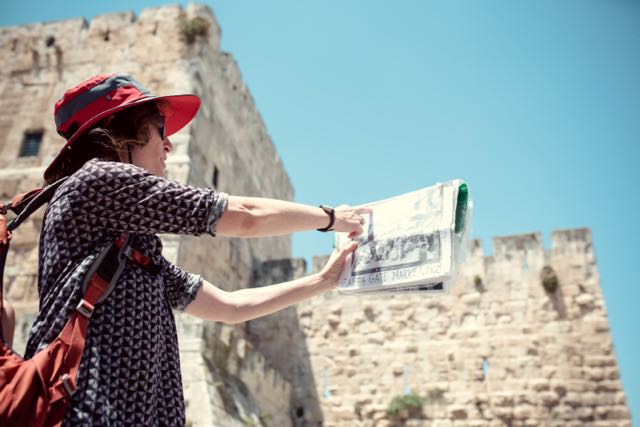
In need of a great guide in Jerusalem? Abraham Tours hosts many cool tours in Jerusalem. One of them is the Jerusalem Pub Crawl , a must do when visiting Jerusalem and looking for a cool crowd to explore the fabulous nightlife.
There are also Jerusalem day-tours from Tel Aviv, 3 and 4 day tours including Jerusalem and Dead Sea and many more.
Check out some more tour inspiration and Israel travel ideas below! Click on the 'next page' button to see more tours. 100ILS = $27
20. Lowest point on earth is in Israel

We all know about the highest point on earth, but not that many people realize that the Dead Sea on the border of Israel and Jordan is the lowest point on earth; a crazy landscape to discover and for sure worth the drive downhill. Enjoy the spectacular views from up top or jump in the only boat that drives on the Dead Sea apart from a research vessel.
How to arrange this boat ride on the Dead Sea? Click below to get connected with Abraham Hostels as they are the unique seller of this tour.
There are a dozen different Dead Sea tours, see below. 100ILS = $27
Planning a trip to Israel in 2024
On my first trip to Israel I was lucky enough to be chosen by Vibe Israel to join their yearly returning travel blogging trip and they planned most of my trip to Israel. I wish though I had known a couple things before I traveled to Israel and therefore I hope this list was helpful to you.
I sincerely hope you will consider this country to be your next travel destination and that my blogs about this controversial country convinced you that it is an amazing place to travel and to experience its great contrasts.
I feel privileged that because of my travels I am able to take away misconceptions and in that light I also took a trip to Syria and a trip to Iraqi Kurdistan !
In the next link you will find 33 things to do in Israel , not just the standard stuff but some epic adventures like zip lining, rappeling, ATV trips, a hot air balloon ride and more. In my 24 reasons to visit Israel I summed up a whole list of why you should visit this country if you are still not convinced.
If this blog about traveling to Israel was helpful would you like to help me a little? Please pin it on Pinterest, tweet it on Twitter or share it in a Facebook Group or somewhere on the internet. It would mean the world to me! Thanks a million...
May you still have questions about traveling to Israel please leave me a comment below and I am more than happy to help you out.
Enjoy your trip to Israel!
- vibe israel
Middle East: Is it safe to travel to holiday destinations as tension escalates?
Are you going to Turkey, Egypt or Israel on holiday? The Foreign Office has warned travellers to several countries to monitor advice after an Iranian attack on Israel pushed tension in the Middle East up another notch.
Thursday 18 April 2024 08:13, UK
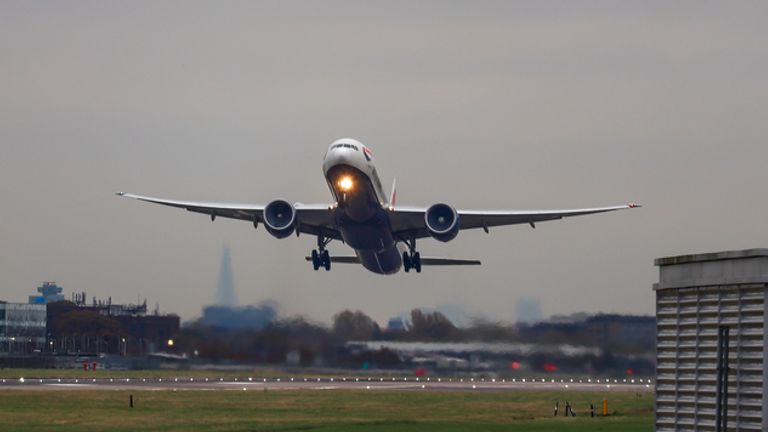
Tension in the Middle East has ratcheted up again after Iran's attack on Israel, as the world waits to see how Benjamin Netanyahu's government will respond.
With the threat of widening conflict, people due to travel through or over the Middle East may be asking if their plans may be impacted.
On Saturday, flight data showed dozens of journeys that would have travelled over the Middle East turned back after Iran fired more than 300 drones and missiles into Israel .
Here is what airlines are saying and the latest safety advice to travellers.
EasyJet scraps Tel Aviv flights
EasyJet has suspended all flights to Tel Aviv over safety concerns.
The budget airline told Sky News it has grounded its flights until 27 October at the earliest "as a result of the continued evolving situation" in the region.
Wizz Air customers could see schedule changes
Wizz Air cancelled flights to Tel Aviv on Sunday 14 and Monday 15 April before resuming its schedule.
But it said customers could experience schedule changes as it closely monitors the situation.
British Airways operating as normal
British Airways - which operates four daily return flights per week between Heathrow and Tel Aviv - said its flights were continuing to operate as planned, but it too was monitoring the situation.
Is it safe to travel to Turkey?
Turkey is a popular holiday destination for people from the UK with the Turkish Ministry of Culture and Tourism saying that last year 3.16 million Britons made the journey there, according to Travel Weekly.
Yet, it borders a number of countries that the Foreign Office advises against travel to.
The vast majority of the country is considered generally safe for tourists, with some exceptions.
The Foreign Office advises against all travel within 10km of the border with Syria , and all but essential travel to the Sirnak and Hakkari provinces.
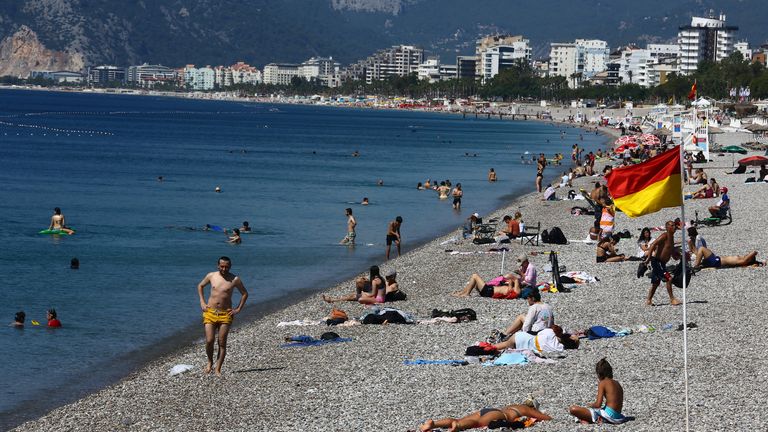
Is it safe to travel to Israel?
Some parts of Israel are considered "red zones" by the Foreign Office, with the government advising against all travel there.
For the rest of the country - including East Jerusalem and Tel Aviv - the advice is to travel only if it is essential.
Tourist Israel says around 220,000 Britons usually go to the country every year and the Foreign Office is advising against travel close to the border with Gaza, within 5km of the border with Lebanon and within 500m of the border with Syria.
You can see the full updated list of "red zones" on the Foreign Office advice pages.
Occupied Palestinian territories
The Foreign Office advises against all travel to Gaza and the West Bank.
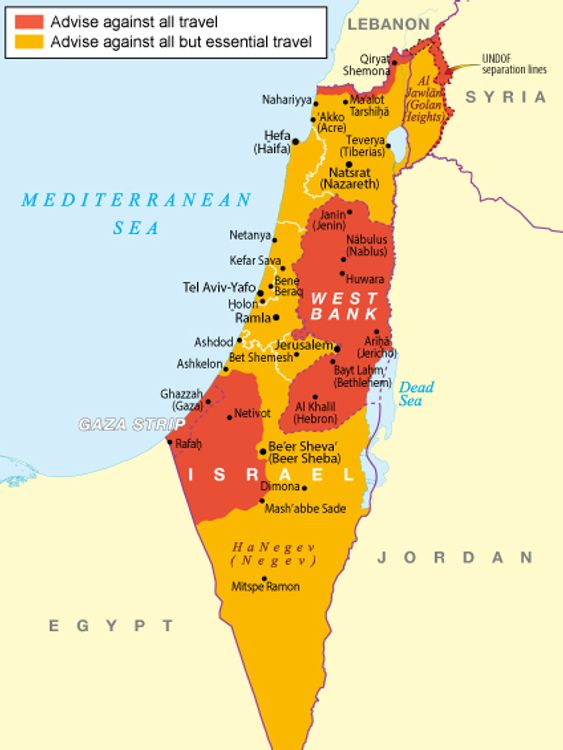
Don't travel to Iran, Iraq, Yemen, Lebanon or Syria - Foreign Office
The Foreign Office advises against all travel to Iran, Syria, Lebanon and Yemen.
It advises against all travel to Iraq except to the Kurdistan Region of Iraq (KRI), where it advises against all but "essential travel".
Can I safely go on holiday in Egypt?
The main tourist areas in Egypt are generally considered safe, including the capital Cairo, cities along the Nile and Red Sea resorts.
Over 1.5 million British Nationals visit Egypt every year, according to analysts Gitnux, and the areas the Foreign Office warns not to travel to include the Governorate of North Sinai, where the Rafah crossing to Gaza is located, and within 20km of the border with Libya.
Read more: Are we heading for World War Three? Experts give their verdicts What are Iran's military capabilities - and where could it strike?

Keep up with all the latest news from the UK and around the world by following Sky News
Check advice on other Middle East states before you travel
Following Iran's attack on Israel, the Foreign Office issued a warning relating to several countries in the surrounding area, telling travellers to check for the latest information.
Included in this are popular destinations like Dubai (visited by more than a million Britons last year according to Travel Weekly) and Marrakech.
"On 13 April 2024 Iran carried out military action against Israel. Monitor this travel advice and other media as the situation is changing fast," the FCDO said in a statement.
The countries covered by the warning include Qatar, the United Arab Emirates, Morocco, Tunisia, Saudi Arabia, Algeria, Bahrain, Kuwait, Libya, Jordan and Oman.
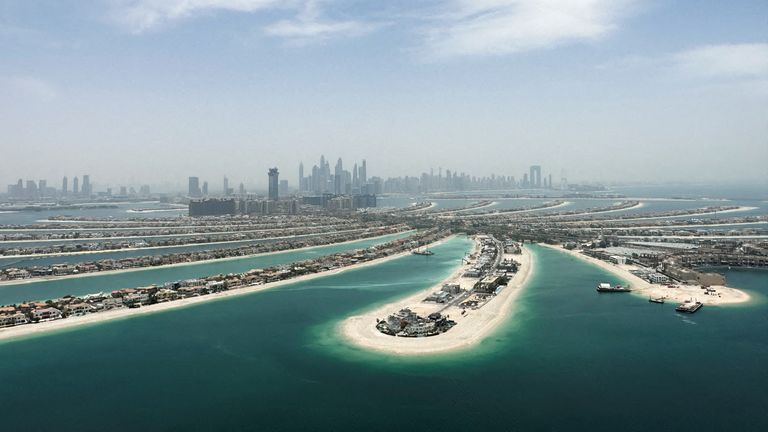
Anywhere else of concern?
Cyprus is near the region and has a large UK airbase but, as yet, there is no change in travel advice to the popular country.
Related Topics
- Israel-Hamas war
- Middle East
- International edition
- Australia edition
- Europe edition
Australia urges Israel and Iran to avoid ‘spiral of violence’; Dfat issues Middle East travel advice – as it happened
This blog is now closed.
- Australia ‘extremely concerned’ after Israeli airstrikes on Iran confirmed by US
- Nine-year-old among four killed in car crash in Western Australia
- Get our morning and afternoon news emails , free app or daily news podcast
- 19 Apr 2024 What we learned, Friday 19 April
- 19 Apr 2024 Australia urges Israel and Iran to 'step back'
- 19 Apr 2024 Dfat issues travel advice amid reports of explosions across the Middle East
- 19 Apr 2024 Fire ants spotted near tip of Murray Darling Basin
- 19 Apr 2024 Stocks, Aussie dollar sink after reports of explosions in Iran
- 19 Apr 2024 Greens on Israeli missiles launched at Iran: ‘This must not become our next war beside the US’
- 19 Apr 2024 Non-citizens may prefer prison to immigration detention – ombudsman
- 19 Apr 2024 Boy, aged 9, among four killed in WA car crash
- 19 Apr 2024 Greens yet to take position on bill banning non-prescription vapes
- 19 Apr 2024 Samantha Ratnam to step down as leader of Victorian Greens for federal tilt
- 19 Apr 2024 Disability and mental health check for accused terror teenager
- 19 Apr 2024 Opposition leader says Palestinian state alongside Israel not ‘conceivable’ until Hamas defeated
- 19 Apr 2024 Youth on welfare ‘pushed’ into homelessness, report shows
- 19 Apr 2024 Young people concerned government isn't planning for the long-term, thinktank says
- 19 Apr 2024 Canavan declares ‘king coal’s reign continues’ as climate crisis continues to worsen
- 19 Apr 2024 Civil liberties council ‘concerned’ by push for tougher penalties on parents if children found with knives
- 19 Apr 2024 AFP commissioner outlines facts of Wakeley stabbing case, calls for unity
- 19 Apr 2024 Shorten suggests ‘more soldiers and police officers’ should be patrolling shopping centres
- 18 Apr 2024 Planned surgery wait times longest on record, medical association says
- 18 Apr 2024 Joint Jewish, Muslim and Christian statement released following recent tensions and violence
- 18 Apr 2024 Alleged offender in Wakeley church stabbing to face bedside court
- 18 Apr 2024 Violence against women a ‘scourge’ that is ‘perpetrated by men’, attorney-general says
- 18 Apr 2024 First navy officers assigned to US Virginia class submarines
- 18 Apr 2024 Good morning
- 18 Apr 2024 Bondi Junction Westfield to reopen for trade after stabbings
- 18 Apr 2024 Welcome
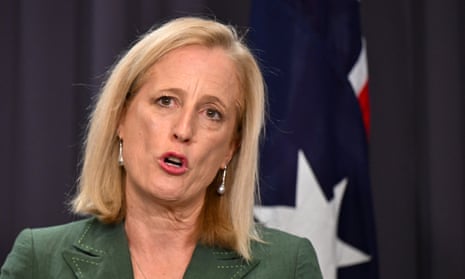
What we learned, Friday 19 April
And with that, we are going to put the blog to bed. Before we go, let’s recap some of the big headlines.
Bondi Junction Westfield will reopen for trade after last weekend’s stabbings
The first Australian navy officers have been assigned to US Virginia class submarines
Violence against women is a ‘scourge’ that is ‘perpetrated by men’, the attorney general, Mark Dreyfus , said
The alleged offender in the Wakeley church stabbing faced a bedside court hearing
Jewish, Muslim and Christian leaders released a joint statement following recent tensions and violence
Planned surgery wait times in public hospitals are now the longest on record, according to new data from the Australian Medical Association
Bill Shorten suggested ‘more soldiers and police officers’ should be patrolling shopping centres
The AFP commissioner, Reece Kershaw, outlined the facts of the Wakeley stabbing case and called for unity
The civil liberties council is ‘concerned’ by a push for tougher penalties on parents whose children are found with knives
Nationals senator Matt Canavan declared ‘king coal’s reign continues’ as the climate crisis continues to worsen
A think tank says young are people concerned government isn’t planning for the long term
Teenagers who rely on welfare to pay rent are being pushed towards homelessness, a new report shows
Peter Dutton has given a speech saying the idea of a Palestinian state alongside Israel “isn’t even conceivable” until after Hamas is defeated
The 16-year-old alleged Wakeley terrorist has shown behaviour consistent with mental illness or intellectual disability , his lawyer told a court today
Samantha Ratnam will step down as the leader of the Victorian Greens to run for the federal seat of Wills
The Greens say they are yet to take position on a bill banning non-prescription vapes
A boy, aged 9, was among four killed in a car crash in the WA Wheatbelt
The commonwealth ombudsman has warned non-citizens may prefer prison to immigration detention
The Greens say Israeli missiles launched at Iran ‘must not become our next war beside the US’
Stocks and the Aussie dollar sank after reports of explosions in Iran
Fire ants were spotted near the tip of the Murray Darling Basin
Dfat issues travel advice amid reports of explosions across the Middle East
Thank you for spending part of your day with us. We will be back tomorrow to do it all again!
Australia urges Israel and Iran to 'step back'

The Australian government has urged Iran and Israel to “exercise restraint and step back to avoid a further spiral of violence”.
In response for a request for comment on Israel’s reported retaliatory military actions against Iran, the acting foreign minister, Katy Gallagher , said:
Australia remains extremely concerned about the potential for miscalculation and further escalation of conflict in the region. This is in no one’s interests. We urge all parties to exercise restraint and step back to avoid a further spiral of violence . Australia will continue working with partners to try to reduce tensions and prevent further regional spillover.
The Department of Foreign Affairs and Trade had earlier updated travel advice for the region.
The Department of Foreign Affairs and Trade has published the following advice, after reports have emerged of explosions across the Middle East:
There have been reports of explosions across some locations in the Middle East. The security situation could deteriorate quickly, with little notice. There may also be airspace closures, flight cancellations, diversions and other travel disruptions. In an attack or other armed conflict, you should follow the advice of local authorities.
There have been reports of explosions across some locations in the Middle East. The security situation could deteriorate quickly, with little notice. There may also be airspace closures, flight cancellations, diversions and other travel disruptions. (1/2) pic.twitter.com/tOqyBgr9p5 — Smartraveller (@Smartraveller) April 19, 2024
This comes as Australians in Israel or the Occupied Palestinian Territories have been advised to depart, if safe to do so. Dfat said:
There’s a high threat of military reprisals & terrorist attacks against Israel & Israeli interests across the region. The security situation could deteriorate quickly. We urge Australians in Israel or the Occupied Palestinian Territories to depart if it’s safe to do so. Military attacks may result in airspace closures, flight cancellations & diversions & other travel disruptions. Tel Aviv’s Ben Gurion International Airport may pause operations due to heightened security concerns at any time, & at short notice.
Fire ants spotted near tip of Murray Darling Basin
The Nationals have expressed concern over the discover of fire ants at Oakey, west of Toowoomba, for the first time.
Nationals leader David Littleproud said in a statement that Labor had been “too slow to act” on the issue, and the discovery was of great concern because Oakey is at the tip of the Murray Darling Basin.
The worrying thing about the Oakey detection is that if fire ants get up above the Great Dividing Range, it could potentially get into the Murray Darling Basin and that could effectively see the fire ants go right down the Adelaide. It would impact the whole country and have devastating consequences. Labor now needs to urgently respond to the inquiry.

Stocks, Aussie dollar sink after reports of explosions in Iran

Investors aren’t big fans of uncertainty so it’s not surprising that reports of explosions in the Iranian city of Isfahan are prompting a sell-off of stocks in Australia – and in other markets such as Japan.
Our colleagues are tracking international developments in this companion blog .
The Australian stock market, meanwhile, is down about 1.4%, bringing the five-day decline to 3.3%.
Tensions in the Middle East aren’t the only thing bothering equity investors. The stubbornness of inflation in the US, the UK and elsewhere means early cuts in official interest rates are a diminishing possibility (a bad thing for company profits).
We’ll find out if Australia is exceptional next Wednesday when the Australian Bureau of Statistics releases March quarter inflation figures. CBA said today it expected headline inflation eased from 4.1% at the end of 2023 to 3.4% by the end of last month. (They are also among the most “dovish” about the Reserve Bank ’s intentions, predicting three official interest rate cuts this year, starting in September.)

The Australian dollar has continued its retreat of late, dropping to 63.8 US cents in recent trading. (It started 2024 at above 68 US cents.)
The flight to “haven” assets means the US dollar and its bonds draw buyers at times of global uncertainty. (It’s best not to look too closely at the size of American debt, etc.) Gold is popular too, as is oil for obvious reasons, with prices of both up in the wake of the renewed tensions.
Australia, a net energy exporter, tends to do OK overall when the oil price rises – although it might not seem that way if you’re filling up at the petrol station.
Greens on Israeli missiles launched at Iran: ‘This must not become our next war beside the US’
In some international news: US officials have confirmed that Israeli missiles have struck an area inside Iran. You can follow the latest developments around this on our separate live blog:
In a post to X, NSW Greens senator David Shoebridge responded to the news and said “this must not become our next war beside the US”.
Australia must condemn all attacks by both Israel and Iran and clearly state it will not participate in any conflict other than to work to de-escalate. At a minimum that means a comprehensive arms embargo on all sides. Now.

Non-citizens may prefer prison to immigration detention – ombudsman

The commonwealth ombudsman has made a submission to the Senate inquiry into Labor’s deportation bill, warning it could add to the “risk of indefinite detention”.
It said a non-citizen in immigration detention who was subject to a removal pathway direction would have two choices: “return to their country of origin or a safe third country; or go to prison”.
If the person chooses non-compliance with the direction, once they have served their prison sentence, without change to their visa status, they would be returned to immigration detention where they could be subject to further ministerial removal pathway directions ... The only way for a non-citizen to break the cycle of detention and imprisonment is to return to their country of origin or a safe third country.
The submission also questions whether a mandatory minimum of one year in prison for refusing a direction to cooperate with deportation would even work – because non-citizens may prefer prison to immigration detention.
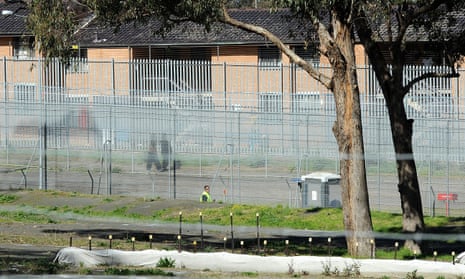
The report says that “in my view, immigration detention facilities are unsuitable for long-term use”, with the office receiving reports on “barriers to accessing medical care, dental treatment and drug and alcohol rehabilitation programs”.
… as well as losing access to life and work skill programs they may have commenced while in the community or in correctional facilities. Indeed, my office has recorded instances of detainees expressing a preference for incarceration over immigration detention due to the certainty and better range of meaningful activities that can be attached with a prison term. It is therefore possible that the deterrence potential of a prison term has been overestimated and that some people on a removal pathway will choose noncompliance with a ministerial direction over removal and remain in a cycle of detention and imprisonment for prolonged periods or even indefinitely.
Boy, aged 9, among four killed in WA car crash
Four people including a nine-year-old boy have died in a fatal car crash in Western Australia.
Officers from the major crash investigation section are investigating the crash that occurred in Clackline in the early hours of Friday.
About 12.30am, a silver Nissan Navara utility was travelling east on the Great Eastern Highway when the vehicle left the road and struck a tree, police said.
The four male occupants of the vehicle – aged 45, 21, 19 and nine – sustained critical injuries and died at the scene.
Major crash investigators are urging anyone with any information relating to this crash, or who saw the silver Nissan Navara utility travelling in the area prior to the crash, to contact Crime Stoppers on 1800 333 000.
Greens yet to take position on bill banning non-prescription vapes

Greens leader Adam Bandt says the party is yet to form a position on the federal government’s bill banning non-prescription vapes.
It comes as the Australia’s state and territory governments said they backed the legislation that, if passed, would force vape stores to close by preventing the domestic manufacture, advertisement, supply and commercial possession of non-prescription vapes.
Bandt said at a press conference:
We’re having a look at the legislation and we’re talking with experts and stakeholders to work through our position. We take a principle-based approach where we’ll listen to the evidence and the experts. Generally, we know that prohibition doesn’t work and hasn’t worked in the past. But we also are very concerned about the rise especially of children vaping, I say that as someone who’s got two children in primary school … the real question is what is the best way to tackle that?
Bandt wouldn’t put a timeframe on this work, saying:
We’re going to take the time necessary. It’s a very important piece of legislation.

Samantha Ratnam to step down as leader of Victorian Greens for federal tilt
Victorian Greens leader Samantha Ratnam says she will be stepping down as leader of the party in the state after she was successfully preselected to run in the federal seat of Wills, currently held by Labor’s Peter Khalil on an 8.6% margin.
Speaking alongside federal leader Adam Bandt in Coburg, she said:
I’d also like to announce that as a result of my candidacy, I will be stepping down as leader of the Greens Victorian party room. We’ll be meeting on Tuesday to elect a new leadership team. They are a formidable team. They have my full confidence and I know they’re going to continue to shake up Victorian politics for years to come.
Ratnam says she’ll also resign from parliament before the end of the year.
Over the next few months the party will conduct a pre-selection to select my replacement in the seat of Northern Metropolitan. I plan to leave my seat of Northern Metropolitan once that process is complete over the next few months’ time, before the end of the year.

Disability and mental health check for accused terror teenager
A teenage boy facing a possible life term in prison for alleged terrorism over the stabbing of a bishop has shown behaviour consistent with mental illness or intellectual disability, his lawyer told a court today.
The 16-year-old is accused by police of travelling 90 minutes from his home to attack Bishop Mar Mari Emmanuel during a live-streamed sermon at Christ the Good Shepherd Church in Wakeley, in Sydney’s west, on Monday night.
The teenager did not appear in court during a brief mention of the case today, when he was refused bail at a hearing. A brief of evidence is due to be served when the matter returns to court on 14 June.
The teenager’s lawyer, Greg Scragg , said he might seek an earlier date, having been instructed the boy had a long history of behaviour consistent with a mental illness or intellectual disability.
He told Parramatta children’s court:
We may seek to bring this matter back earlier if a question arises in relation to his treatment or assessment for those conditions whilst he’s in custody.
The magistrate made a recommendation for the boy to be assessed by Justice Health while in custody.

Opposition leader says Palestinian state alongside Israel not ‘conceivable’ until Hamas defeated
Peter Dutton has given a speech saying the idea of a Palestinian state alongside Israel “isn’t even conceivable” until after Hamas is defeated.
Sky News has broadcast footage of the opposition leader speaking at the St Kilda Hebrew congregation in Melbourne this morning. Dutton used the speech to declare that the Coalition “stands with our ally and our friend Israel” amid the ongoing military operation in Gaza.
He also accused the foreign affairs minister, Penny Wong , of having “significantly damaged our relations with our most important ally in the region, Israel” by stressing the importance of a two-state solution to end the cycle of violence in the long term.
Dutton said:
It was Hamas’s barbarity on October 7 which has set back the goal of a two-state solution. Until Hamas is defeated, a two-state solution isn’t even conceivable because Hamas will always pose an existential threat, an existential threat to the State of Israel. That’s why I characterised the foreign minister’s remarks as utterly illogical, as ill-timed and inappropriate.
The audience applauded at that comment.

In her speech on 9 April, Wong mentioned that the international community was considering recognition of a Palestinian state as part of building momentum to a two-state solution, but she gave no timing for Australia to do so. Wong was emphatic that the Australian government saw “no role for Hamas in a future Palestinian state”.
Youth on welfare ‘pushed’ into homelessness, report shows
Teenagers who rely on welfare to pay rent are being pushed towards homelessness and the situation is worse now than a year ago, AAP reports.
Analysis from Homelessness Australia has found people aged 16 and 17 continue to pay more than three-quarters of their income on rent.
Young tenants in Brisbane are in a worse situation now than 12 months ago as they have to dedicate 83% of their income toward housing, up from 76% in March 2023. Perth’s youth have also fallen behind, paying 76% of income – which is 2% higher than last year.
The percentage of income young tenants spend on rent has remained high elsewhere, but the situation is improving slowly.
The portion of income spent on rent is 94% in Sydney , 73% in Melbourne , 77% in Canberra , 63% in Darwin , 60% in Hobart and 59% in Adelaide . Homelessness Australia cross-referenced payments against rental prices for a two bedroom unit in major metropolitan areas to come up with the results.

Chief executive Kate Colvin said young renters were lower down the pecking order when seeking housing because they received less income support:
Right when they need stability to take their first steps in employment or further education they are pushed into poverty, resulting in social exclusion, mental illness and lost lifetime productivity. The costs and consequences of our warped housing system will only escalate for young people and the broader society, unless we make better choices.
Young people concerned government isn't planning for the long-term, thinktank says
A non-partisan thinktank run by younger Australians says political leaders should ensure they are planning for the long-term, with young people feeling “let down” and uncertain for the future amid overlapping crises.
Think Forward conducted a survey of almost 1,000 young Australians and found only 3% believe their political leaders are thinking for the long-term and have a good plan for the future.
The survey found young people believe a lack of long-term planning contributes to a range of crises, which are affecting their future prospects. This included climate change, the housing crisis, the tax system, growing intergenerational wealth inequality and the growing cost – but declining quality – of education.
The report reads:
Young people have little confidence that their political leaders can develop long- term, bold, and well-designed policy responses to difficult structural problems. A lack of long-term planning and policy action leaves younger generations in a precarious position with an uncertain future, buffeted by overlapping crises and declining economic outcomes.
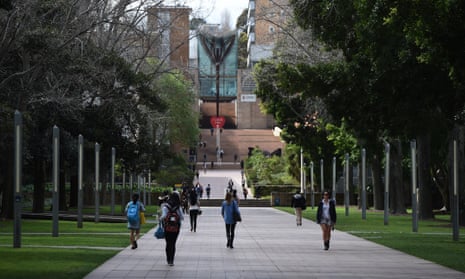
Young people believe parliamentarians aren’t planning for the future because outside sources make it difficult, they are just in it for themselves, or they act for donors and lobbyists rather than for the community, the survey found.
The thinktank said there was a “political imperative” for parliamentarians to address the concerns of young people, as Millennials and Gen Z now make up almost 45% of voters.
Canavan declares ‘king coal’s reign continues’ as climate crisis continues to worsen
Queensland Nationals senator Matt Canavan has released a media statement claiming that “king coal’s reign continues”.
For some reason the press release forgets to mention coal’s role in climate breakdown, such as climate breakdown-induced food shortages , studies predicting that average incomes will fall by almost a fifth as a result of the climate crisis, and March seeing the 10th consecutive monthly record for global heating .
Canavan’s press release coincides with Pembroke Resources’ opening of their new Olive Downs steelmaking coalmine. Conservationists labelled public funding for the project as “deeply irresponsible” years ago:
When first announced , the coalmine was forecast to provide the state with $5.5bn in royalties and be in operation for 79 years. Canavan’s statement reads:
We’ve been told coal is dead as many times as the Great Barrier Reef, but the reality is both are thriving. Coal demand has never been higher.
As we have reported extensively on, the Great Barrier Reef is not “thriving”. It is currently facing its most severe coral bleaching on record as global heating pushes coral reefs across the world to the worst planet-wide bleaching on record .
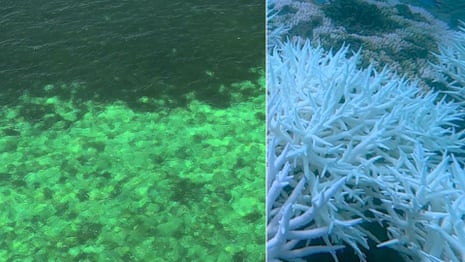
Civil liberties council ‘concerned’ by push for tougher penalties on parents if children found with knives
The NSW Council for Civil Liberties says it is concerned by a push for criminal offences to be introduced for the parents of minors found with weapons, including knives.
It’s been reported that some NSW police officers have been calling for this change via the union, as we flagged earlier .
The council said data from the NSW Bureau of Crime Statistics and Research indicates knife crime has declined over recent consecutive years, and called on the state government to “resist populist calls for legislative change that will not make our communities safer”.
President Lydia Shelly said charging parents on the basis their child has committed an offence “oversimplifies the intricate circumstances surrounding children who have contact with the criminal justice system”:
The stance reportedly taken by NSW police poses significant risks to children. Parents facing criminal charges and a possible conviction may jeopardise their employment opportunities, destabilise their housing situation, and potentially disrupt their ability to maintain custody of their children.

Shelly said the state government should focus on strengthening families, and a whole-of-government approach was needed to prevent children from entering the criminal justice system in the first place.
Parents of children who have been charged with a criminal offence do not deserve to be demonised by the media, the NSW police or the NSW government.
- Australia news
- Australian politics
- Australian security and counter-terrorism
- Australian economy
- Anthony Albanese
- Labor party
- Peter Dutton
Most viewed

Is it safe to visit Morocco? Latest travel advice
F ollowing the outbreak of war in Israel and Gaza and the recent escalation of tensions between Israel and Iran, some people may be concerned about the safety of travelling to Morocco or other areas in North Africa and the Middle East right now.
Here’s everything you need to know about travel to Morocco, whether it is safe to visit, and your rights if you do decide to cancel your upcoming holiday.
What does the FCDO say about travel to Morocco?
The Foreign, Commonwealth and Development Office (FCDO) has not issued any blanket advisories against travel to Morocco. This means that travel insurance will be valid when visiting the country.
However, the FCDO has updated its advice to say: “On 13 April 2024 Iran carried out military action against Israel. On 19 April, there have been reports of explosions in Iran, and unconfirmed reports of explosions in Syria and Iraq. Monitor this travel advice and other media as the situation is changing fast. Follow and contact FCDO travel on Twitter , Facebook and Instagram . You can also get email notifications when this travel advice is updated.”
You can see the full Morocco FCDO advice here .
Are flights still operating as usual to Morocco?
Yes. Flights from the UK to Morocco do not go in the vicinity of the Middle East. Morocco is 2,500 miles away from Tel Aviv as the crow flies. By way of comparison, London is closer: 2,200 miles from Israel. So geographical proximity alone should not be a consideration for any upcoming travel plans.
Is Morocco impacted by the Israel-Hamas war?
To date Morocco has not been impacted by the conflict, although large-scale pro-Palestine marches have taken place in the country. The FCDO warns: “There is currently a heightened chance of demonstrations and protests occurring across the country. You should avoid these gatherings, and be aware of the potential for protests to occur spontaneously. Protests can happen at short notice and are generally heavily policed. Demonstrations are mostly peaceful but there has been isolated violence. Demonstrations and protests may lead to increased travel disruption in affected areas.”
Is Morocco still recovering from the 2023 earthquake?
On September 8, 2023, a 6.8–6.9 magnitude earthquake struck the Marrakesh–Safi region of Morocco. The epicentre was 45 miles (73km) southwest of Marrakesh, near the small town of Ighil and the Oukaïmeden ski resort in the Atlas Mountains.
Some 3,000 people were killed and more than 6.6 million Moroccans were affected by the earthquake, according to the Moroccan government.
There was considerable devastation across the remote mountain communities of the Atlas Mountains, and Marrakech, a city popular among tourists, experienced significant damage including building collapses. In some parts of the country the rebuilding process continues, but Marrakech’s airport is open and the country is very much open for tourism once again.
On the subject of earthquakes in Morocco, the Foreign, Commonwealth and Development Office (FCDO) says: “Morocco is in an earthquake zone. Minor earthquakes happen occasionally. The last major earthquake was in 2023, which killed almost 3000 people. Familiarise yourself with safety procedures in the event of an earthquake and take note of any instructions in hotel rooms.”
Is terrorism a risk in Morocco?
In 2018, two tourists were murdered while hiking near Mount Toubkal, and the FCDO advises: “Terrorists are very likely to try to carry out attacks in Morocco.”
The FCDO adds: “There is an increased threat linked to the number of Moroccans sympathetic or belonging to Daesh (formerly ISIL) and other extremist groups. Authorities regularly disrupt terrorist cells.”
Places at higher risk include crowded areas, government installations, transportation networks, businesses with Western interest, and areas where foreign nationals and tourists are known to gather.
“Be vigilant in these areas and follow any specific advice of the local security authorities,” the FCDO adds.
What if I want to cancel my holiday?
If you have booked a package holiday to Morocco and want to cancel your trip for any reason, contact your tour operator and they might offer flexibility with alternative dates.
But bear in mind that, because the Foreign Office has not issued any formal advice against travel to Turkey, there is no guarantee you will receive a refund, nor will you be able to claim money back with your travel insurance company.
If you have booked flights and accommodation independently, and wish to cancel your holiday, contact your travel providers as soon as possible to see if you can rearrange your plans. Note, however, that given the circumstances, it is unlikely you will receive a full refund.
This story was first published in October 2023 and has been revised and updated.
Sign up to the Front Page newsletter for free: Your essential guide to the day's agenda from The Telegraph - direct to your inbox seven days a week.
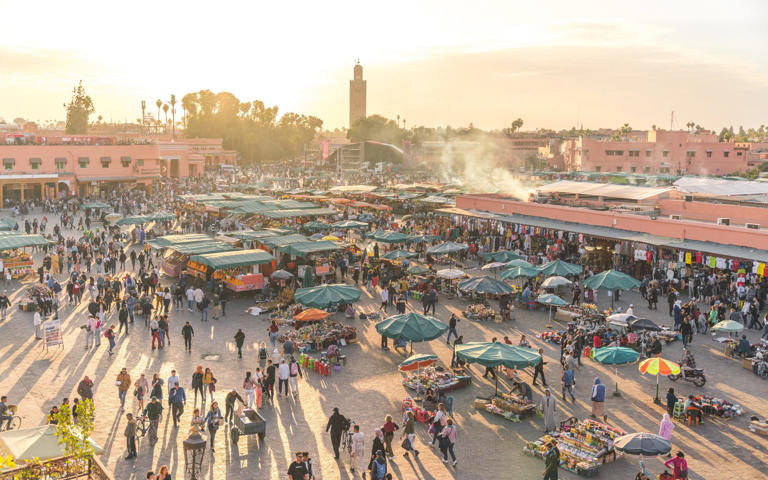
Iran's air defence system activated amid reports of explosions heard near city of Isfahan
Iranian state media has reported that explosions have been heard at Isfahan airport in central Iran, amid conflicting reports from United States and Iranian officials about what caused them.
Australia said it was "extremely concerned" about the potential for "further escalation" in the region, with the Department of Foreign Affairs and Trade (DFAT) urging Australian citizens to leave Israel and Occupied Palestinian Territories.
Sources told the FARS news agency that Iran's air defence system was activated in Isfahan province against "an object suspected to be a drone".
"The sound of three explosions has been heard near an army base in north-west Isfahan," the sources reportedly said.
"At around 12:30am GMT (10:30am AEDT), three drones were observed in the sky over Isfahan. The air defence system became active and destroyed these drones in the sky," Iranian state TV added.
Look back at how Friday's events unfolded in our blog.
A senior commander of Iran's army, Siavosh Mihandoust, said, according to state TV, that no damage was caused in the overnight attack.
It comes as an unnamed US official told US broadcaster ABC that missiles were fired by Israel.
This assertion was disputed by an Iranian official who told Reuters that the explosions heard in Isfahan were a result of Iran firing its air defence batteries.
The Iranian official added that no missile attack was carried out against Iran.
The US official could not confirm whether Syria and Iraq were hit as well, after initial reports that explosions were also heard at those sites.
According to a military source cited by Syrian state media, an Israeli missile attack targeted air defence positions in Syria's southern region.
The Israeli military said that warning sirens which sounded early on Friday in northern Israel were a false alarm.
Senior Hamas official Sami Abu Zuhri told Reuters on Friday that Israel's "aggression" on Iran was an escalation against the region.
The US told the Group of Seven (G7) foreign ministers on Friday that it received "last minute" information from Israel about a drone action in Iran, said Italian Foreign Minister Antonio Tajani.
Mr Tajani, who chaired the meeting, said the US provided the information and the meeting was changed at the last minute to address the suspected attack.
Mr Tajani said the US informed the G7 ministers, that it had been "informed at the last minute" by Israel about the drones. "But there was no sharing of the attack by the US — it was a mere information."
US Secretary of State Antony Blinken declined to comment on the assertion.
"I'm not going to speak to that except to say that the United States has not been involved in any offensive operations," Mr Blinken said.
Australia's acting foreign minister, Katy Gallagher, said Australia remained "extremely concerned" about the potential for "further escalation of conflict" in the Middle East.
"This is in no one's interests. We urge all parties to exercise restraint and step back to avoid a further spiral of violence," she said.
"Australia will continue working with partners to try to reduce tensions and prevent further regional spillover."
Australian government updates travel advice
The Australian government has updated its travel advice for Iran, which already had a "do not travel" warning in place, saying "regional tensions are high, and the security situation could deteriorate quickly with little or no notice".
The Department of Foreign Affairs and Trade (DFAT) also updated its advice for Israel and the Occupied Palestinian Territories to leave "if it's safe to do so".
It said there was a "high threat of military reprisals and terrorist attacks against Israel and Israeli interests across the region".
While DFAT had already advised Australians to reconsider their need to travel to Israel and had warned against travel near Gaza or the West Bank beyond East Jerusalem, the request to leave is new.
It added that Tel Aviv's Ben Gurion International Airport could "pause operations due to heightened security concerns at any time, and at short notice".
Earlier, flight tracking websites showed multiple flights being diverted away from Iranian airspace.
Iran closed its airports in Tehran, Shiraz and Isfahan after the incident and cleared flights from the western portion of its airspace for a few hours after the attack, according to flight tracking website FlightRadar24.
By 4:45am GMT (3:45pm AEDT), the airports and airspace had reopened, and closure notices posted on a US Federal Aviation Administration database had been removed.
Before the airports reopened, Flydubai said it had cancelled its Friday flights to Iran. One of its earlier flights turned back to Dubai, it had said.
According to Reuters, several Iranian nuclear sites are located in Isfahan province, including Natanz, which is considered the centrepiece of Iran's uranium enrichment program.
The International Atomic Energy Agency said it was monitoring the situation closely and that there was no damage to the nuclear sites.
Over the weekend, Iran launched hundreds of drones and missiles in a retaliatory strike after a suspected Israeli strike on its embassy compound in Syria.
Western states sought out to send Iran messages via Türkiye in recent days to reiterate appeals for de-escalation, a Western diplomat said on Friday, Reuters reported.
The messages were conveyed before reported Israeli attacks on Iran early on Friday, after which Tehran indicated it had no plans for further retaliation.
After Iran's retaliatory attack on Israel over the weekend, Türkiye's foreign ministry confirmed it had contact with Iran and the United States in a statement, saying Ankara had called for restraint and warned of a regional war if tensions escalated further.
"In recent days we have sought to send Iran messages via Türkiye — particularly reiterating the message of de-escalation," said a Western diplomat, when asked about messages carried to Tehran by Ankara.
Türkiye's foreign ministry has not responded to Reuters for comments.
Acting US Under Secretary of State John Bass, travelled to Ankara earlier this week and met Türkiye's top diplomat Hakan Fidan.
"They discussed the critical importance of preventing further escalation or a wider conflict in the region," a US official said.
Most of the drones and missiles were downed before reaching Israeli territory.
Israel had said it was going to retaliate against Iran's April 13 missile and drone attack.
- X (formerly Twitter)
Related Stories
How iran's assault unfolded over jerusalem as the middle east enters a new phase.
'Iran could do much more': Why the drone attack on Israel sends an important message
- Iran, Islamic Republic Of
- United States
- Unrest, Conflict and War
- World Politics
Advertisement
Supported by
Israel Plans to Expand ‘Humanitarian Zone’ if It Invades Rafah
An oceanside area currently crowded with displaced Gazans is among the sites being eyed for a larger safe zone for evacuees, a military official said.
- Share full article

By Adam Rasgon
Reporting from Jerusalem
If Israel were to begin an invasion in the southern Gaza city of Rafah, where a million displaced Palestinians are sheltering, an Israeli-designated “humanitarian zone” along the coast would be expanded to take in more civilians, an Israeli military official said Monday evening.
The comments were among the first indications of the Israeli military’s plans for civilians if it were to launch a major ground offensive in Rafah. The Biden administration has urged Israel to forgo such an operation because of the risks it would pose to displaced Palestinians.
Palestinians who have sought shelter in Rafah have been bracing for an Israeli incursion for months, huddling in crowded tents, schools and apartments. Before arriving in Rafah, many had followed earlier Israeli calls to evacuate other areas in Gaza only to encounter bombardment in those places too.
Israeli officials have repeatedly said that the army will enter Rafah to fight Hamas battalions there, bucking international pressure to back off any operation.
In the case of an invasion, Israel would tell Palestinians to go to the enlarged “humanitarian zone,” which would include a narrow strip of beachside land known as Al-Mawasi , and other unidentified areas in Gaza, said the Israeli military official, who spoke on condition of anonymity to discuss internal deliberations.
Mohammed al-Hassi, 48, a medic sheltering in Al-Mawasi, said the area was already overflowing with displaced people. He worried another influx would make conditions worse.
“There aren’t enough bathrooms, there isn’t enough clean water and there isn’t enough space,” he said. “The existing infrastructure can barely handle the number of people already here.”
It was unclear how much land beyond Al-Mawasi that Israel would seek to designate as a “humanitarian zone” for civilians. Satellite imagery from Planet Labs revealed a significant increase in the number of people there over the last few months: An aerial image from Sunday showed tent encampments occupying land that had been empty in mid-January.
The fighting continued elsewhere in Gaza on Tuesday, with the Israeli military saying it carried out several airstrikes in Beit Lahia, one of the northernmost cities in the Gaza Strip.
The Israeli strikes killed at least one person and injured several others in Beit Lahia and damaged and set fire to several houses in nearby Gaza City, according to Wafa, the Palestinian Authority’s official news agency. The strikes were carried out in response to rockets launched from the area toward southern Israel, all of which were successfully intercepted, according to the military.
Lt. Col. Avichay Adraee, a spokesman for the Israel Defense Forces, or I.D.F., on Tuesday issued an “urgent warning” to residents to immediately evacuate parts of Beit Lahia. “You are in a dangerous combat zone,” Colonel Adraee wrote in Arabic on social media . “The I.D.F. will work with extreme force against terrorist infrastructure and subversive elements in the region.”
He ordered residents to move to shelters in other areas. But many residents of Gaza have said that no area is safe from Israeli military bombardment.
The Israeli military has heavily damaged Beit Lahia during previous offensives. The city, once known as Gaza’s breadbasket, is part of northern Gaza, where humanitarian officials have warned of the risk of famine as Israel has come under increasing international pressure to allow more aid to enter the enclave.
Addressing concerns about a Rafah invasion, Sandra Rasheed, the director of the Jerusalem office of Anera, a relief group, said that Israel had not told the aid group of an imminent operation there, but the organization had found a shelter for its staff members and their families to relocate to in Al-Mawasi. U.N. officials also said Israel had not informed them of an impending invasion.
Israel’s military first said Gaza’s residents should move to Al-Mawasi in mid-October, and it reiterated that demand in December, when it issued evacuation orders for the nearby city of Khan Younis and told residents to head to Al-Mawasi and some areas in Rafah.
Satellite imagery also appeared to show a new cluster of hundreds of tents being built west of Khan Younis. Imagery taken on Thursday showed more than 100 tents in the area, while imagery captured on Sunday showed more than 400.
Rafah is on the border with Egypt, but because Egypt is allowing hardly any Gazans to enter, there are few clear options for moving large numbers of civilians out of the city.
Earlier this month, Jamie McGoldrick, then a senior U.N. humanitarian official in Jerusalem, said that an Israeli invasion of Rafah could force hundreds of thousands of people to try to flee for points north, a risky journey across bombed-out roads littered with unexploded ordnance.
The Biden administration has repeatedly urged Israel to hold off on a major military assault on Rafah, including in a virtual meeting last week . During that meeting, U.S. officials evaluated options for the attack presented by Israel, but were not convinced that those plans met President Biden’s insistence that any operation be calibrated to minimize civilian casualties, according to a White House statement .
At a news conference in Washington on Tuesday, David Satterfield, the U.S. special envoy for humanitarian issues in Gaza, reiterated the Biden administration’s concerns about Israel’s plans to invade Rafah.
“We could not support a Rafah ground operation without an appropriate, credible, executable humanitarian plan,” Mr. Satterfield said, warning that an invasion would complicate aid deliveries and displace civilians who have already been uprooted multiple times.
“Where do they go?” he said. “How will their needs be met — shelter, medicine, water, sanitation?”
Al-Mawasi has previously been struck by the Israeli army, according to Palestinians in the area. Israel has accused militants of firing rockets from Al-Mawasi.
“There’s no safe place,” said Mr. al-Hassi, the medic sheltering in Al-Mawasi. “I’m someone with no hostility toward Israel or anyone in the world, but I can’t guarantee that the building, the land, or the car I’m next to won’t be targeted.”
In Rafah, Rajab al-Sindawi, a secondhand clothing salesman who had fled there from Gaza City in the north, said he was feeling anxious as he, his wife and their seven children squeezed into a small tent on a sidewalk.
“The people are all waiting to hear how they will move us,” he said.
Michael Levenson , Anushka Patil and Lauren Leatherby contributed reporting.
Adam Rasgon reports from Israel for The Times's Jerusalem bureau. More about Adam Rasgon

IMAGES
VIDEO
COMMENTS
Please see the latest Israel Security Alert. U.S. citizens should heed the Travel Advisory for Israel, the West Bank, and Gaza. The U.S. Embassy continues to closely monitor the dynamic security situation in Israel, the West Bank, and Gaza. There are active military operations and active rocket and mortar fire in Gaza and the Gaza periphery.
Help from FCDO in Israel and the OPTs. Consular support is severely limited where FCDO advises against travel. If you need consular assistance call: +44 176 766 7600 (UK number) +972 (0)3 725 1222 ...
Reconsider travel due to terrorism and civil unrest. U.S. government employees in Israel under Chief of Mission security responsibility are currently restricted from all personal travel to the West Bank, except: U.S. government employees can use Routes 1, 90, and 443 at any time. U.S. government employees are permitted personal travel to Jericho.
The short answer to this question is yes. While many governments worldwide have recommended only essential travel to Israel, it is possible and feasible to fly to Israel. In fact, tourists continue traveling to Israel every day. There are a range of airlines operating flights in and out of the country, and hotels are available for your stay.
During these challenging times, we in Israel stand together with you, the American people, offering our prayers and support, united in the hope for a brighter, better tomorrow. ISRAEL TRAVEL ALERTS & SAFETY INFORMATION In order to remain fully informed, below is the updated information about the ongoing situation in Israel with regard to the […]
Disclaimer: I traveled to Israel as a guest of Abraham Tours and Abraham Hostels, however all opinions - and all these Israel Travel Tips - remain my own. So there you have it - hopefully we've given you enough travel inspiration & Israel travel tips to help you plan your trip to Israel. It really is a fascinating country to visit.
Be alert to personal safety risks. Monitor local media and public safety information updates through the National Emergency Portal (accessible in Israel only). Our overall travel advice level for Israel and the Occupied Palestinian Territories remains at reconsider your need to travel, with higher levels applied to some areas.
U.S. government employees in Israel under Chief of Mission security responsibility are currently restricted from all personal travel to the West Bank, except: U.S. government employees can use Routes 1, 90, and 443 at any time. U.S. government employees are permitted personal travel to Jericho.
The Department of State updated its Travel Advisory for Israel, the West Bank, and Gaza on October 14, 2023, to reflect the authorized departure of non-emergency U.S. government personnel and eligible family members for U.S. Embassy Jerusalem and U.S. Branch Office Tel Aviv. This replaces the previous Travel Advisory issued on October 11, 2023. The full text of the […]
On October 11, the US State Department raised its travel advisory for Israel to level three, "reconsider travel," and Gaza to level four, "do not travel.". The situation remains fluid and ...
Since its independence in 1948, Israel has fought six wars, and the Israeli-Palestinian conflict remains unresolved, meaning that regional instability is a fact of life. Travel to the Gaza Strip or West Bank requires prior clearance or required authorization; however, there is unrestricted access to the West Bank towns of Bethlehem and Jericho.
Travel advice and information for Israel can range from safety and security to how to make the most out of visiting a specific neighborhood or even drinking the best coffee. Other travel advice and information such as how to cross between borders, which are the best souvenirs to purchase, luggage storage or the best ways to travel on a budget, can all come in handy when planning and preparing.
Although most roads in Israel are in good condition, many roads in the Gaza Strip and the West Bank are in poor condition. During the winter months, precipitation can cause difficult driving conditions and road closures across the territory. Driving may also be dangerous due to: traffic jams and heavy traffic.
Entry requirements. This travel advice covers Israel and the Occupied Palestinian Territories (OPTs). This information is for people travelling on a full 'British citizen' passport from the UK ...
In this post I will give you some travel tips that will help you better understand Israel and make the most of your visit here. Table of Contents [ hide] Essential Travel Tips for Israel. 1. Getting acquainted with Israel's history really helps. 2. Food is really good.
Halva - a sesame-based Arab dessert made with tahini paste, you can find it at any major outdoor market. You should tip in restaurants. Tipping isn't as generous as in the US, but 10-15% is a typical amount to tip in restaurants in Israel. Cash tips are preferred when you visit Israel.
Israel Travel Guide & Packing Tips . The Best Time to Visit Israel. Very specifically, the best time to visit Israel is during the month of May — after religious pilgrimages in April, and before summer tourists arrive. May in Israel offers near perfect weather and scenery, minimal tourists swarming popular attractions, and low prices for ...
Information, insights, advice, reviews, and recommendations about travel to and around Israel Skip to primary navigation; Skip to main content; IsraelTravelBlog.com ... The Israel Travel Podcast shares with you everything you need to know - and plenty you didn't even know you needed to know - about travel to and around Israel as a tourist
Israel travel advice. FCDO travel advice for Israel and the Occupied Palestinian Territories. Includes safety and security, insurance, entry requirements and legal differences. Israel: mental ...
4. Israel is a small country. The furthest you'll drive is a few hours, and that's only if you plan on leaving the city. Jerusalem is an hour drive from Tel Aviv and the Dead Sea is a 2-hour drive from Tel Aviv. Tel Aviv itself is very walkable, and because it's such a gorgeous city, walking is actually enjoyable.
When visiting Israel — or any other country in the world — make sure to get travel insurance to protect your health and safety. In my opinion, the best travel medical insurance for travelers is SafetyWing as they've got a large network and offer both short-term and long-term coverage — including coverage if you're traveling for months ...
4. Food is suppose to be kosher. Food has rules in Israel as far as that counts for religious people. You will often find restaurants stating that they offer 'kosher' food, which basically means they stick to the rules of the religion, It is something like Halal food for Muslims. Main rule is: don't mix dairy with meat.
Check advice on other Middle East states before you travel. Following Iran's attack on Israel, the Foreign Office issued a warning relating to several countries in the surrounding area, telling ...
DFAT has upgraded its travel advice for Israel and the Occupied Palestinian Territories amid reports of an Israeli missile strike on Iran raises fears of conflict escalation and heightened ...
T he UK Foreign Office has updated its travel advice for a number of countries - including some popular with UK holiday makers due to concerns about a potential Iranian attack on Israel. Tehran ...
Dfat issues travel advice amid reports of explosions across the Middle East. The Department of Foreign Affairs and Trade has published the following advice, after reports have emerged of ...
However, the FCDO has updated its advice to say: "On 13 April 2024 Iran carried out military action against Israel. On 19 April, there have been reports of explosions in Iran, and unconfirmed ...
While DFAT had already advised Australians to reconsider their need to travel to Israel and had warned against travel near Gaza or the West Bank beyond East Jerusalem, the request to leave is new.
Israel's military first said Gaza's residents should move to Al-Mawasi in mid-October, and it reiterated that demand in December, when it issued evacuation orders for the nearby city of Khan ...
An airline spokesperson said: "As a result of the continued evolving situation in Israel, easyJet has now taken the decision to suspend its flights to Tel Aviv for the remainder of the summer ...